International Activity Report 2022



Médecins Sans Frontières is a private international association. The association is made up mainly of doctors and health sector workers, and is also open to all other professions which might help in achieving its aims. All of its members agree to honour the following principles:
Médecins Sans Frontières provides assistance to populations in distress, to victims of natural or man-made disasters and to victims of armed conflict. They do so irrespective of race, religion, creed or political convictions.
Médecins Sans Frontières observes neutrality and impartiality in the name of universal medical ethics and the right to humanitarian assistance, and claims full and unhindered freedom in the exercise of its functions.
Members undertake to respect their professional code of ethics and to maintain complete independence from all political, economic or religious powers.
As volunteers, members understand the risks and dangers of the missions they carry out and make no claim for themselves or their assigns for any form of compensation other than that which the association might be able to afford them.
The country texts in this report provide descriptive overviews of MSF’s operational activities throughout the world between January and December 2022. Staffing figures represent the total full-time equivalent employees per country across the 12 months, for the purposes of comparisons.
Country summaries are representational and, owing to space considerations, may not be comprehensive. For more information on our activities in other languages, please visit one of the websites listed at msf.org/ contact-us
The place names and boundaries used in this report do not reflect any position by MSF on their legal status.
This activity report serves as a performance report and was produced in accordance with the recommendations of Swiss GAAP FER/RPC 21 on accounting for charitable non-profit organisations.
UKRAINE: A YEAR IN DESTRUCTION

A DEADLY CYCLE: MALNUTRITION AND DISEASE OUTBREAKS ACROSS THE GLOBE
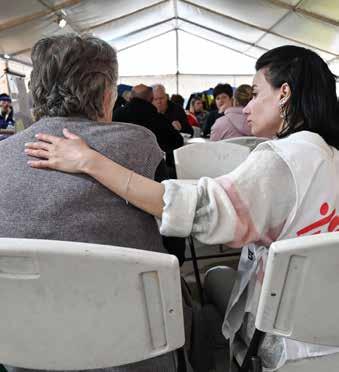
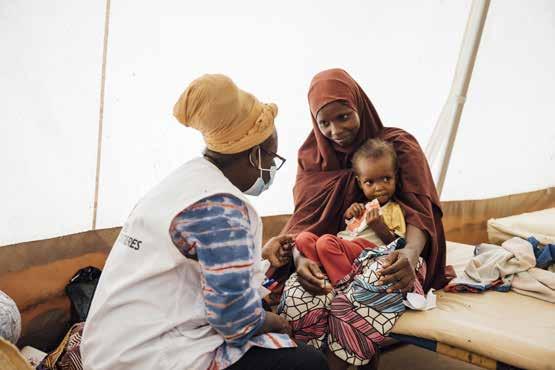

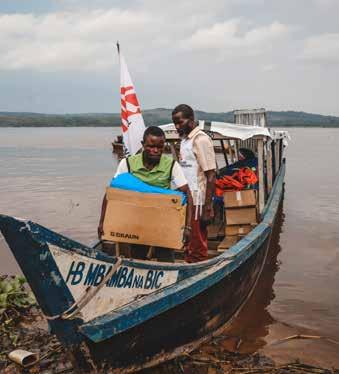

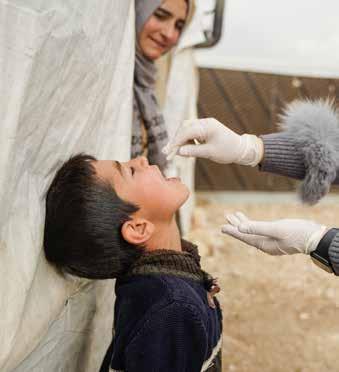
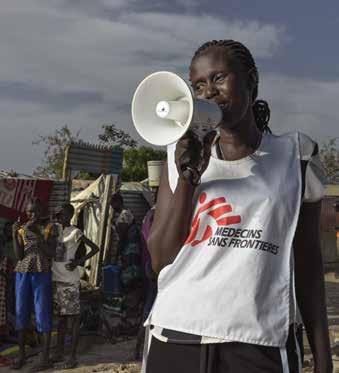
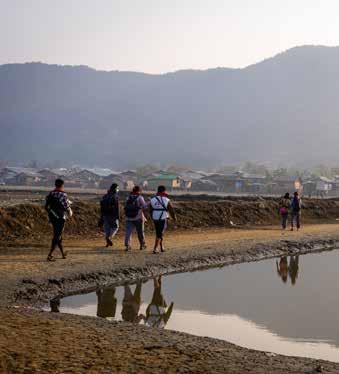
Côte d’Ivoire
Countries in which MSF only carried out assessments or undertook activities where we spent less than €500,000 in 2022 do not feature on this map.



The challenges we faced last year were not only external; while striving to become the MSF we want to be, we were also forced to look more deeply within. In February, we released a progress report on our commitments to tackle institutional discrimination and racism within MSF.
Although we set out a clear blueprint, focusing on seven specific areas that needed urgent and concrete action – from management of abuse and misbehaviour to safety and security – it did not cover all the issues that we needed to address.
After a full-scale attack on Ukraine in February, the tragedy of bloody warfare became the new normal for millions of people. In this perilous and ever-evolving conflict, we strove to find where we could be most useful, to support people caught in precarious circumstances and provide healthcare where needed.
The ripple effects of the war in Ukraine had consequences far beyond Europe, in part intensifying other, less-reported crises. Across continents, economic crises, combined with a lack of food and a surge in diseases, such as measles and cholera, left millions of children vulnerable to malnutrition, and caused hundreds of thousands of preventable deaths.
In the Sahel region of Africa, consecutive droughts, vicious conflict, mass displacement and a lack of access to healthcare also contributed to alarming levels of malnutrition in 2022. Meanwhile in North West region, Nigeria, a chronically food-insecure area, escalating violence forced half a million people to flee their homes. Many were unable to farm, and lost their livelihoods. By September, our teams had treated more than 100,000 children for acute malnutrition in North West region alone.
In Somalia, the situation was similarly bleak, as the worst drought in 40 years caused a desperate shortage of food. Between January and August, our teams were treating approximately 500 acutely malnourished children a week.
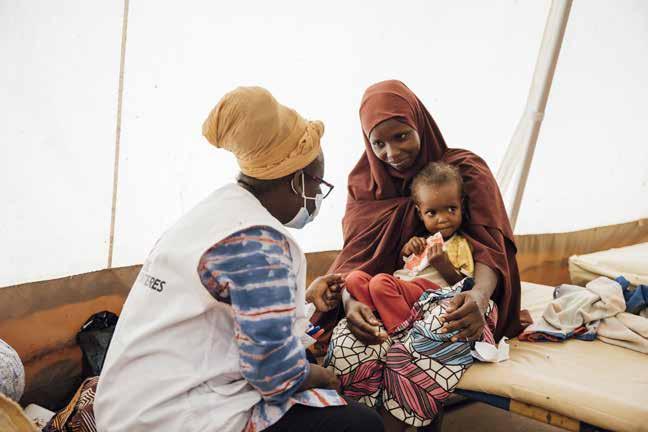
To make matters worse, infectious diseases, such as cholera and measles, spread rapidly among malnourished communities, creating a vicious cycle, as a malnourished person is more susceptible to infection, and infection contributes to malnutrition. With increasing insecurity, climate change and global inflation of food prices, a massive response was required, however, the necessary scale-up did not meet the needs of many communities in vulnerable circumstances.
At the same time, balancing our duty of care with keeping our staff safe proved to be extremely complicated. In the Central African Republic and South Sudan, we lost three colleagues in brutal killings, while in Cameroon, several staff members were detained on false charges for extended periods of time before being released. In some cases, this insecurity hampered our ability to reach people most in need, and in others forced us to close projects.
This became clear last year, during a transformative moment in our treatment of imagery at MSF. We were compelled to address sensitive photography involving patients in our care. Among the issues highlighted was our decision to publish identifiable photographs of a 16-year-old girl who was the victim of rape in Ituri, Democratic Republic of Congo. We acknowledge that the publication of these images was a mistake, but being sorry is not enough.
The scrutiny that followed was right and appropriate, prompting us to take immediate action, including the removal of sensitive photographs from our database and the introduction of a series of measures to put better safeguards in place.
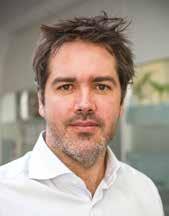
Ultimately, our responsibility is to protect the health and well-being of the people we seek to assist. For those striving for a better life, reeling from the savagery of war, for communities living through precarious times due to disease and malnutrition, we will continue to offer our hand, to provide care, wherever we can.
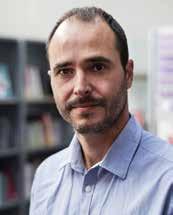
As the world slowly emerged from the havoc caused by the COVID-19 pandemic, Médecins Sans Frontières (MSF) pulled together to respond to new emergencies in 2022, while continuing to assist communities affected by longstanding crises.A mother holds her daughter, who is recovering from malnutrition, at the MSF hospital in Diffa. Niger, 2022. © Oliver Barth/MSF Dr Christos Christou, International President, MSF Christopher Lockyear, Secretary General, MSF International
War, violence, natural disasters, disease outbreaks, rising inflation and spiralling prices; these factors all contributed to an overall increase in people’s needs, to which nearly 68,000 Médecins Sans Frontières (MSF) staff responded in more than 75 countries around the world in 2022.
The highly volatile political, economic and security situation in Haiti deteriorated even further in 2022, leaving the country on the verge of collapse. Yet it yielded little international attention or assistance. Extreme levels of violence in the capital, Port-auPrince, meant that some communities became trapped without access to food, water or medical care. We have achieved acceptance by the armed gangs who rule entire neighbourhoods, but they frequently target people on the streets and kidnap medical staff with virtual impunity.
MSF’s trauma hospital in Tabarre, and two stabilisation centres in Turgeau and Carrefour – all neighbourhoods in the capital – were often overwhelmed by the numbers of patients with violence-related injuries, particularly during an upsurge in fighting in
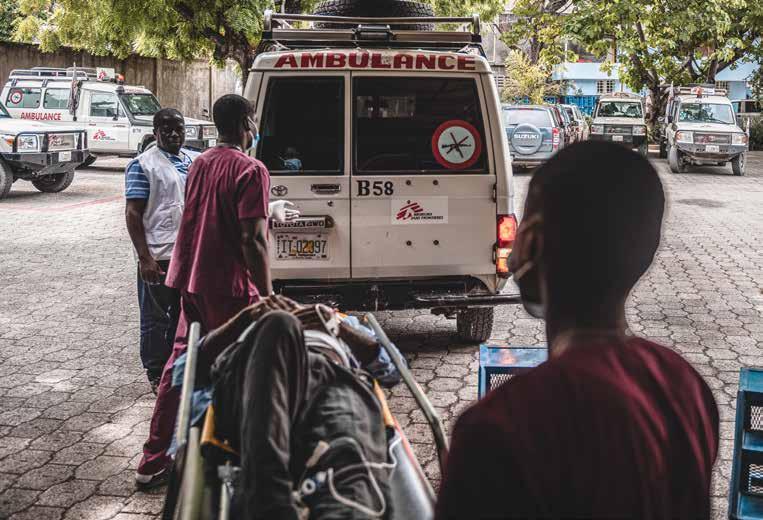
May. Our Drouillard hospital in the Cité Soleil neighbourhood is regularly at the crossroads of the armed groups’ territorial struggle, and the often intense violence forced our medical activities there to be suspended several times during the year. Haiti is currently one of the most challenging countries for MSF, interms of security risk for our staff and supplies.
MSF has been active in eastern Ukraine, supporting people caught up in the war since it started in 2014. However, on 24 February 2022, our teams were taken by surprise by the dramatic escalation in conflict following large-scale attacks by Russian forces across the country. We rapidly increased our response, providing staff and materials, as well as training to Ukrainian surgeons and healthcare workers to help them cope with large influxes of wounded patients. We assisted people who decided to stay home, those who moved elsewhere within the country, and the immense number who chose to seek refuge in neighbouring countries such as Poland, Moldova, Belarus and Russia, providing them with medical and mental health care.
The escalation of the war posed several challenges for us. We needed to rapidly scale up activities to respond to a wide range of needs – not only treating war-
related physical and mental trauma but also pre-existing conditions such as noncommunicable diseases – and adapt to the changing situation and fast-moving frontlines. We had to balance our ambition to deliver care where it was most needed with the necessity of guaranteeing the safety of our staff, including our many Ukrainian staff who had been displaced.
To address these challenges, we devised new ways to get as close to people as possible; for example, using specially designed medical trains to transport patients away from danger zones; running mobile clinics in shelters for the displaced and in metro stations, where people took cover as the bombs fell indiscriminately above ground; and opening phone hotlines for consultations for noncommunicable diseases.
A t the beginning of 2022, as the pandemic entered its third year, MSF teams were still responding to COVID-19 in many places. We continued offering treatment in countries such as Iraq and Eswatini, and administering vaccinations in Lebanon, South Africa and Uganda.
Meanwhile, MSF’s Access Campaign highlighted the need for an intellectual property waiver that would facilitate greater, and
In Haiti, the often intense violence forced our medical activities there to be suspended several times.
more rapid production of vaccines for this and future pandemics. While our response to COVID-19 decreased as the year wore on, our teams worked to address the toll the pandemic has taken on people and healthcare systems, such as a lack of routine vaccinations, which has led to outbreaks of vaccine-preventable diseases in many countries.
We saw an extraordinary resurgence of cholera in 2022; 30 countries recorded cases or outbreaks. MSF responded to this highly contagious disease in at least 10 countries, including Nigeria, Syria, Cameroon, Niger, Lebanon, Democratic Republic of Congo and Kenya. Different factors, such as natural disasters, climate change, water scarcity and humanitarian crises such as conflict, contributed to the worldwide rise in cases.
In Haiti, after three years with no cases, there was a major outbreak from late September. By the end of the year, there had been over 15,000 cases, the vast majority of which were treated in our facilities. Our teams also supported outbreak vaccination efforts.
In view of the global shortage of cholera vaccines, the International Coordinating Group – of which MSF is a member – took the unprecedented decision to temporarily recommend a one-dose, rather than the usual two-dose, vaccination strategy to help protect more people from contracting the disease.
Once again, in 2022, MSF assisted people affected by extreme weather events, such as floods in South Sudan and South Africa; drought in Somalia; and cyclones in Madagascar and the Philippines.
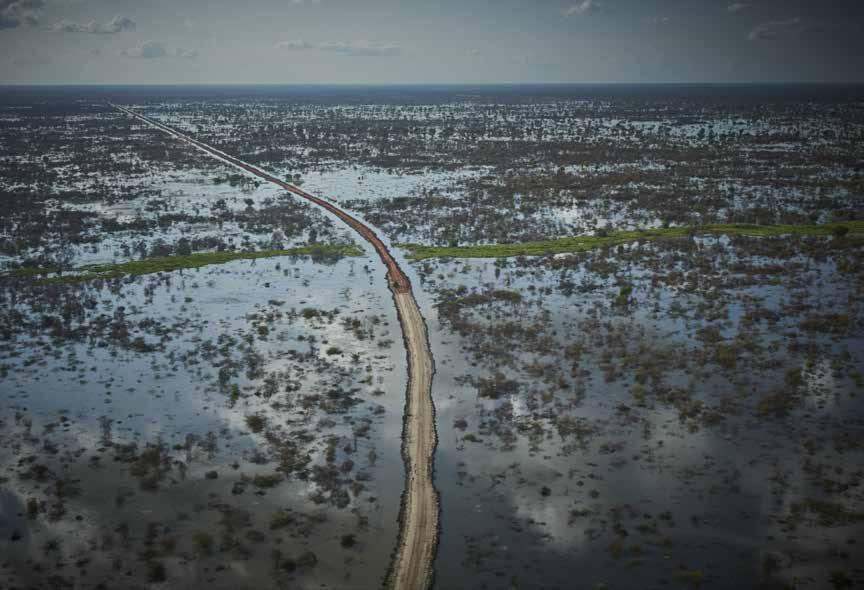
In January, MSF teams provided treatment to children with malnutrition on the outskirts of N’Djamena, Chad, in what was for some the driest and shortest rainy season they could remember. However, several months later in August, in the same area, unusually heavy seasonal rains caused rivers to burst their banks, leading to flooding, which displaced thousands of people.
In June, Pakistan was swept by severe floods, with one-third of the country underwater; some areas were still flooded more than three months later. The devastation displaced over 30 million people and left thousands dead and injured. In response, MSF teams provided medical, nutrition and water and sanitation support on a massive scale in Sindh and Balochistan provinces. Towards the end of the year, we started working in Kiribati to improve maternal healthcare, particularly the diagnosis and treatment of diabetes, a disease that is prevalent in this Pacific Island nation, where rising sea levels have eroded and salinised land used to cultivate crops.
Treating high numbers of children with malnutrition was another focus of our activities during the year. As with cholera, the causes of malnutrition are complex and multifactorial; drought, bad harvests, collapsed health and economic systems, conflict, rising food prices – some or a combination of these factors contributed to the alarming levels of malnutrition we saw in Nigeria, Ethiopia, Kenya, Afghanistan, Chad and Yemen during the year.
In Baidoa, Somalia, where the prolonged drought has been compounded by longstanding conflict and an inadequate humanitarian response, our teams were at times seeing 500 acutely malnourished children a week.
The UN’s refugee agency, UNHCR, estimated that as many as 100 million people were forcibly displaced around the world in 2022. Some were caught in a stalemate at the borders between Belarus and Latvia, Lithuania and Poland, where they were met with constant, often violent, pushbacks. From the beginning of the year, we struggled to assist people in these areas due to hostile policies restricting our access. The escalation of the war in Ukraine in late February, however, revealed a double standard in European migration policies; for millions of Ukrainians – fleeing conflict, like many of the people stranded at the Belarusian border –entry to EU countries as refugees was swiftly facilitated.
Once again, in 2022, MSF assisted people affected by extreme weather events
Refugees and migrants arriving at Mexico’s northern border also continued to be pushed back by the US under Title 42, a decades-old policy that has been widely used only since March 2020, to regulate border crossings under the premise of increased COVID-19 precautions. Meanwhile, thousands of migrants heading for the Mediterranean coast in northern Africa – or retreating from the dangers in Libya – were expelled from Algeria to Niger and abandoned on the border in the middle of the desert.
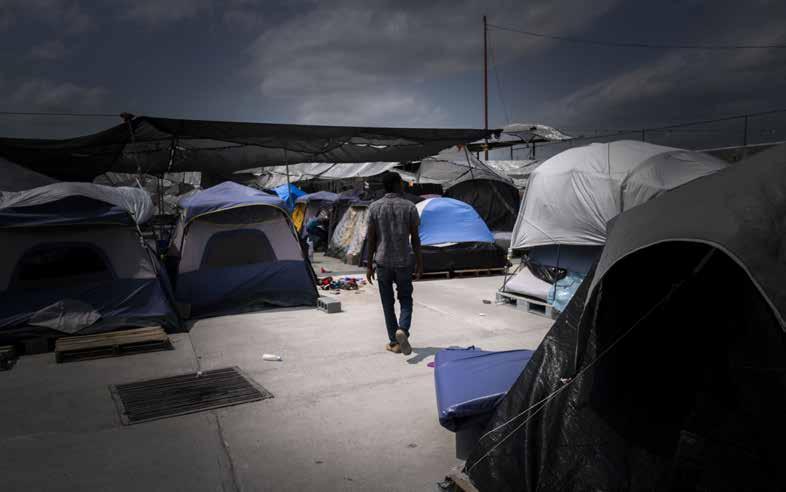
Pushbacks continued at sea as well; in September, Malta forced a ship to take people rescued from its search and rescue zone in the Central Mediterranean Sea to Egypt, in clear violation of maritime and international law.
In the five years since over 750,000 Rohingya fled Rakhine state, in Myanmar, following indescribable violence, life for the persecuted minority has not improved. Those arriving by boat to seek safety in Malaysia have been forcibly returned to sea or have been arrested, imprisoned, and charged. In Bangladesh, Rohingya live in cramped and unsanitary conditions, and their right to move around the camp of 1 million people and work has been severely restricted, adding to people’s distress.
At the end of the year, the New England Journal of Medicine published results from our TB-PRACTECAL clinical trial, which tested the efficacy and safety of a sixmonth, all-oral treatment regimen for drugresistant tuberculosis (DR-TB). The regimen cured 90 per cent of patients, a significant improvement on previous standard
treatments, which typically took two years to complete, with only around half of patients cured. It has now been included in the World Health Organization’s updated TB treatment guidelines.
Scale-up of shorter, all-oral regimens will be critical to getting people on treatment and cured. But this can only happen if the drugs used in these regimens are affordable. Prices for bedaquiline and delamanid, which are being used in our PRACTECAL and/or endTB and endTB-Q trials, remain too high for wide-scale use in many high-burden countries, and must come down.
Like PRACTECAL, the endTB and endTB-Q trials are also looking at shorter, safer, more effective regimens, including in patients who are minors. This is doubly important following WHO’s new recommended algorithm to diagnose TB in children.
Across some parts of the world, our teams continued to see the effects of counterterrorism and anti-NGO rhetoric. Four colleagues from our team in Southwest region, Cameroon, were arrested and charged with complicity with secessionists after they transported a patient with a gunshot wound in an ambulance to hospital in Mamfe. They spent between 10 months and just over a year in prison, before being acquitted in court at the end of December. Due to the lack of guarantees for our safety, we were forced to first suspend, and then close, our project in Mamfe, which further reduced the availability of healthcare in an area with immense needs.
Access to healthcare remained an issue in Tigray, and other parts of Ethiopia, in the
year following the June 2021 murders of our colleagues María, Yohannes and Tedros. Since then, we have tried relentlessly to understand the full circumstances behind what happened to our colleagues and obtain an acknowledgment of responsibility for the events leading to their murders. Despite the heavy investment made in bilateral engagement with the authorities, the lack of progress in obtaining substantial answers led MSF Spain to pull out of the country.
In Afghanistan, the Islamic Emirate of Afghanistan (also known as the Taliban) has continued to strip away freedoms for women in the year since retaking power in August 2021. In December, edicts were issued restricting girls’ and women’s access to education, and banning female NGO workers, with an informal exemption for those working in healthcare. While we can retain women on our teams – for now – we are deeply worried about the longer term, as female medical students cannot complete their education to become the doctors, nurses and specialists that the country’s health system desperately needs. Our teams have witnessed the criminalisation of the delivery of aid in some places, including in Mali and Niger. This has made it extremely difficult to reach people caught up in conflict in the Sahel border region of Niger, Mali and Burkina Faso.
Our work has its risks, with staff working under the threat of attack, abduction, or detention. Despite the challenges in this part of the Sahel, and elsewhere we worked during 2022, our teams managed to deliver lifesaving care to millions of people. But this work would not have been possible without the support of our nearly 7 million donors, for whom we are grateful.
Refugees and migrants arriving at Mexico’s northern border also continued to be pushed back by the USA man walks through the Senda de Vida migrant shelter in Reynosa, at the US southern border. Mexico, May 2022. © Yael Martínez/Magnum
Democratic Republic of Congo South Sudan Nigeria
Central African Republic
e 115 million
e 113 million
e 112 million
e 91 million
e 68 million
e 49 million
e 49 million
e 48 million
e 48 million
e 43 million
The total budget for our programmes in these 10 countries was e 736 million, 52.4 per cent of MSF’s programme expenses in 2022 (see Facts and Figures for more details).
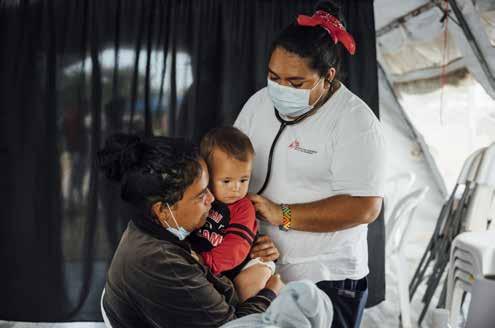
By
South Sudan
Yemen
Afghanistan
Nigeria
Central African Republic
Democratic Republic of Congo
Democratic Republic of Congo
1 Staff numbers represent full-time equivalent positions (locally hired and international) in our programmes averaged out across the year.
2 Outpatient consultations exclude specialist consultations.
16,272,300 outpatient consultations
295,300 births assisted, including caesarean sections
52,600 patients treated for cholera
1,214,100 patients admitted
118,100 surgical interventions involving the incision, excision, manipulation or suturing of tissue, requiring anaesthesia
4,124,700 vaccinations against measles in response to an outbreak
4,268,600 malaria cases treated
39,900 people treated for sexual violence
158,200 people treated for measles
474,100 families received distributions of relief items
127,400 severely malnourished children admitted to inpatient feeding programmes
3,850 people rescued at sea
17,800 people started on first-line treatment for TB
1,422,600 emergency room admissions
31,500 people on first-line HIV antiretroviral treatment under direct MSF care
5,770 people started on hepatitis C treatment
425,500 individual mental health consultations
6,570 people on second-line HIV antiretroviral treatment under direct MSF care
On 24 February 2022, we awoke at night to the rumble of distant explosions, the sound of fighter jets dropping missiles on Kyiv, and the astonishing news that Russia was invading Ukraine.

None of us knew what to expect. I had arrived four days previously to try to establish a network of contacts who could help us work if there was a major escalation in conflict. Médecins Sans Frontières (MSF) first worked in the country in 1999 and had been responding to the fighting in eastern Ukraine since 2014, but in truth, we were poorly prepared.
For many aid organisations, and indeed a lot of Ukrainians, the denial that had preceded the invasion made way to disbelief and, for ordinary civilians, a sense of impending doom mixed with anger. Numerous NGOs left the country entirely, exacerbating the subsequent need for a massive scale-up in the humanitarian response.
In those first days, between 10 and 15 million people fled their homes. Remarkably, however, we did not witness any panic or looting. No flights were leaving, as all airports, both civilian and military, had been hit by Russian missiles at the outset.
This was not the first time I had worked with MSF in a conflict zone, nor the first time I had witnessed the start of a major war. However, inter-state invasions are rare (for example, the US invasions of Afghanistan in 2001 and of Iraq in 2003) and the intensive phase, although bloody, is usually shortlived. The situation in Ukraine has not turned out that way at all.
We moved from Kyiv to Lviv and started redefining and rebuilding our medical assistance from there. Few international staff felt safe enough to stay so we launched our activities mostly with our Ukrainian colleagues, who stepped up to the challenge even though they were all now displaced, and having to find a roof for their families in safer parts of the country.
The next question was: what would be the most effective course of action in such a fast-moving war? Where could a medical humanitarian NGO make the biggest difference?
It quickly became clear that civilians would not be spared. Families leaving Kyiv were killed on the roads leading east and south, as tanks opened fire on sight without warning. We therefore set up programmes to help hospitals deal with mass-casualty influxes and war trauma, a highly specialised field distinct from ‘ordinary’ trauma such as road traffic accidents.
We also made emergency orders to resupply hospitals so they could cope with the increased trauma workload – a standard approach to war in a middle-income country with a solid specialist healthcare infrastructure. The idea was to help an existing system cope with an extraordinary workload. However, Ukraine had been at war, albeit a more geographically restricted one, since 2014. It was better prepared than most healthcare systems would be. Yes, some local doctors and nurses left with their families, but the majority stayed.
By mid-March, we decided to try something new, as some noticeable gaps in healthcare were appearing. One thing was clear: the railways were still working, and remained a key form of transport. Many people, including those with wounds and other vulnerabilities, were travelling by train, usually westwards, away from the heavily shelled eastern and central regions. But the regions and their hospitals were not used to these long-range transfers.
Late one evening, in a meeting with the focal points from the Ukrainian national railway company, Ukrzaliznytsia , in Lviv, I proposed using modified ‘medicalised’ trains to evacuate patients to the west. They jumped on the idea and recalled that something similar had been done during the Second World War.
They set about stripping wagons in the railway depot, as we sent medical equipment and technicians to prepare them for intensive care, complete with oxygen concentrators and autonomous electric power. We had no idea if the project would work beyond maybe a few rotations at best. By the end of the year, some 2,500 patients had been safely moved across the country over 80 rotations, often at night, with trips usually lasting 24 hours or more.
The war also took a toll on ambulance services, as crews were injured or killed and their vehicles destroyed (notably in Luhansk and Donetsk), while the number of warwounded patients continued to increase. As a result, emergency ambulance transport became a core component of our medical response in the most war-affected regions of eastern Ukraine, with 50 to 100 referrals a week. Typically, we transferred war-wounded patients from depleted Ministry of Health hospitals near the frontline to the relative safety of Dnipro, where they could receive the care they needed.
In addition, we ran mobile clinics to assist people who had been cut off from healthcare under Russian occupation in Kherson, Kharkiv, Chernihiv, Kyiv and Mykolaiv. As villages and towns were recaptured by Ukrainian forces, we discovered that most of the elderly people who had decided to stay behind or been unable to flee in time had had no access to care or to the vital drugs prescribed to them before the war to manage their chronic conditions.
In Kherson alone, our mobile clinic services covered over 160 villages and towns, offering both medical and mental health support. Often people had survived, but
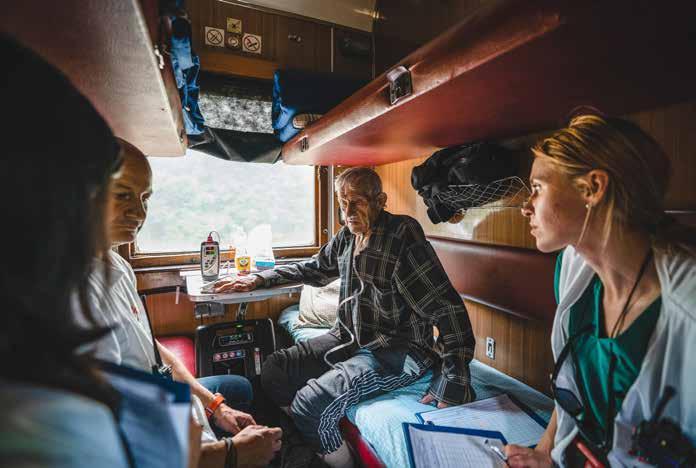
their villages and health centres had been destroyed by bombs or airstrikes, or even looted by departing Russian soldiers.
The extent of the destruction must be seen to be properly understood. It stretches along a 1000-kilometre frontline and is dozens of kilometres deep on both sides. Not a single village is undamaged. It will potentially take decades to rebuild the country. Families who evacuated have told me they may never return, while those who stayed are still living in shelled-out buildings with little medical assistance beyond short flash visits.
It is important to state that the bulk of assistance here and throughout the country is provided by national authorities, backed by dynamic civil society activists who selforganised from day one. They go where no international organisation dares to, sometimes at great personal cost.
Meanwhile, in spite of prolonged negotiations, Moscow has not granted MSF permission to work on the other side of the frontline, in regions of Ukraine currently under Russian control. This is regrettable, as the situations we have discovered in areas previously under Russian control lead us to believe that humanitarian access there is a priority. Ukrainians with whom we have been in touch in Mariupol, Zaporizhzhia and Kherson confirm the high level of needs, and request assistance.
We can only hope this will change, as the war shows no sign of ending and people continue to suffer the constant stress and danger of daily drone and missile strikes.
What would be the most effective course of action in such a fast-moving war?Doctors and nurses on board the MSF medical train discuss the condition of an elderly patient, during the journey from Pokrovsk in eastern Ukraine to Lviv in western Ukraine. Ukraine, May 2022. © Andrii Ovod
Although COVID-19 cases started to decline in 2022, it still proved to be an exceptionally challenging year. Ongoing conflicts, extreme weather events and rising food prices all took their toll on people’s ability to access healthcare around the world, including routine immunisation programmes. These events also contributed to increases in outbreaks of preventable diseases, such as measles and cholera, as well as malnutrition.
Throughout the year, Médecins Sans Frontières (MSF) teams worked to respond to these overlapping crises, running vaccination campaigns that reached millions of people, as well as providing diagnosis and treatment for cholera, measles, yellow fever, meningitis, hepatitis E and acute diarrhoea, within a broader range of diseases that affected people across the globe.
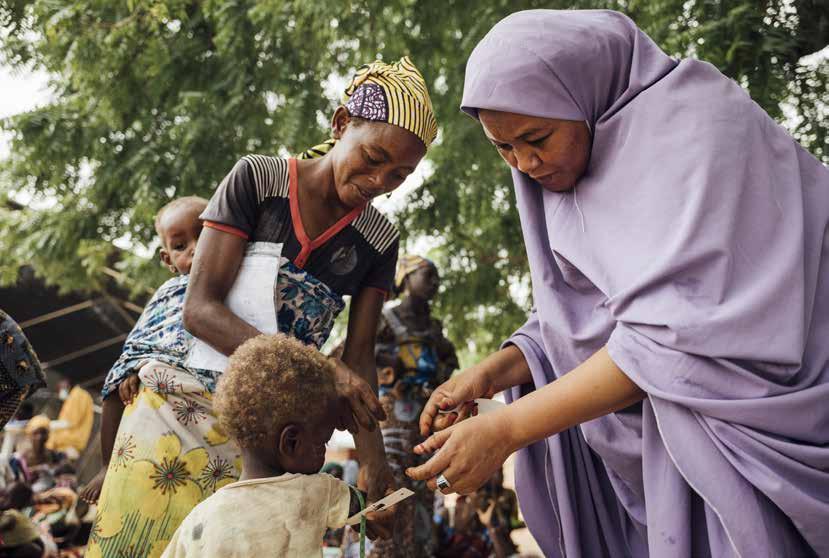
For years, but especially since the COVID-19 pandemic, many health systems have been struggling to cope with multiple emerging and re-emerging diseases, while trying to maintain basic health services. The consequent disruptions in healthcare left over 25 million children worldwide without routine vaccinations for diphtheria, tetanus and pertussis in 2021; similar figures are likely to be reported for 2022. Measles outbreaks continue to increase, even in high-income countries like the US. It is estimated that over 61 million doses of measles-containing vaccine were postponed or missed due to COVID-19-related delays in supplementary immunisation activities across 18 countries.1 According to World Health Organization surveillance data, the number of countries experiencing large and disruptive outbreaks increased from 19 in 2021 to 29 in 2022.
Since mid-2021, there has been a deeply concerning upsurge in cholera, in terms
of the number of cases and deaths, as well as the size and concurrence of outbreaks. Alarmingly, the disease has spread to countries that had been free of it for many years, such as Haiti, Lebanon and Syria, where factors such as conflict, forced migration, economic crisis and the COVID-19 pandemic have had a negative impact on living conditions and healthcare provision.
Meanwhile, cholera-endemic countries that have worked hard in recent years to prevent and control outbreaks have seen their efforts thwarted. By the end of 2022, an unprecedented 30 countries were experiencing cholera outbreaks, and dozens continue to report cases into 2023. In most of the countries where MSF works, our teams continue to support the cholera response with both preventive and curative activities, including vaccination, diagnosis, treatment, and the provision of water and sanitation.
As the climate emergency worsens, extreme weather events, such as floods and drought,
The situation is unlikely to change without significant action to address the gaps.
will increase, causing further waves of displacement – ideal conditions for outbreaks of transmittable diseases, including cholera. Unless we invest in systems that build preparedness and resilience among people at risk, scaling up vaccination coverage and establishing reliable and safe sources of water and sanitation, the world will be forced to respond to more frequent and more extensive outbreaks in the short and long-term.
Another interlinked health emergency that our teams witnessed in 2022 was the rise in malnutrition. The deterioration of food security driven by droughts and floods, conflict, high domestic food prices and the rise in diseases, exacerbated by a shortage of global resources, contributed to the huge increase in the number of malnourished children we treated in our facilities during the year. Malnutrition makes a child more susceptible to infectious diseases, as it affects their immune system, while diseases such as cholera reduce their nutrient intake and make them more likely to become malnourished.
As a result of low food security and poor healthcare in 2022, the number of malnourished children MSF treated as outpatients more than doubled compared to the previous year, while the number we admitted to hospitals increased by more than 50 per cent. In total, over half a million children were treated for malnutrition by our teams.
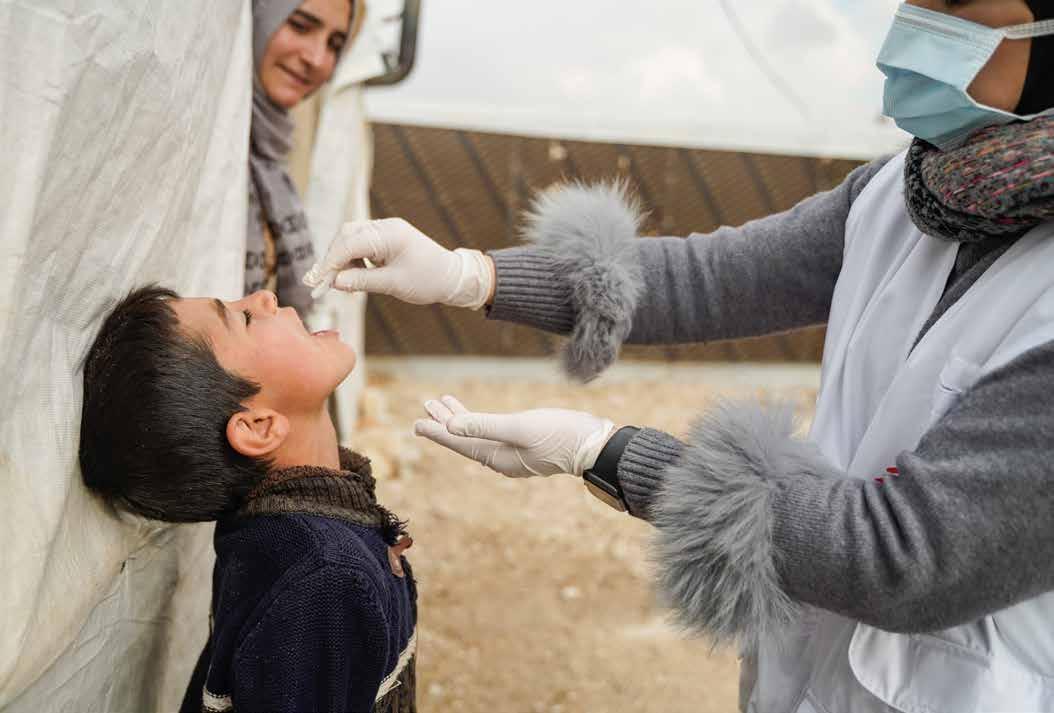
Globally, the gap between needs and funding increased, which meant that in some places, MSF was the main health provider. In Nigeria’s North West region, for example, the risk of malnutrition was high, with ongoing insecurity, poor funding and a lack of preventive healthcare. As well as responding to repeated outbreaks of measles, malaria and diarrhoeal diseases, our teams treated over 200,000 patients for malnutrition. MSF also provided treatment for tens of thousands of malnourished patients in other countries, including Chad, Niger, Democratic Republic of Congo and Somalia, where our teams witnessed similar situations.
However, these worrying numbers do not necessarily reflect the true situation in the
community, as during emergencies, access to essential services is often severely hampered by many social and environmental factors, including conflict and/or floods, leaving large groups who are at risk of malnutrition unattended. MSF conducted several assessments, including in Nigeria, where in some insecure areas, we found that up to a fifth of children were severely malnourished. The situation was similarly dire in Somalia, which experienced its worst and longest drought in 40 years.
As all the drivers in health emergencies are structural, and funding is often limited in these countries, the situation is unlikely to change without significant action to address the gaps. This critical health emergency is largely underreported, as other large global events, such as the war in Ukraine, occupy the world’s attention. For this reason, MSF continues to call for a greater international response to address these urgent needs.
1 https://www.cdc.gov/globalhealth/measles/data/ global-measles-outbreaks.html
A young man walks down the corridor of the hotel hosting MSF’s short-term accommodation project for young unaccompanied minor migrants. Île-de-France, France, 2018. © Augustin Le Gall
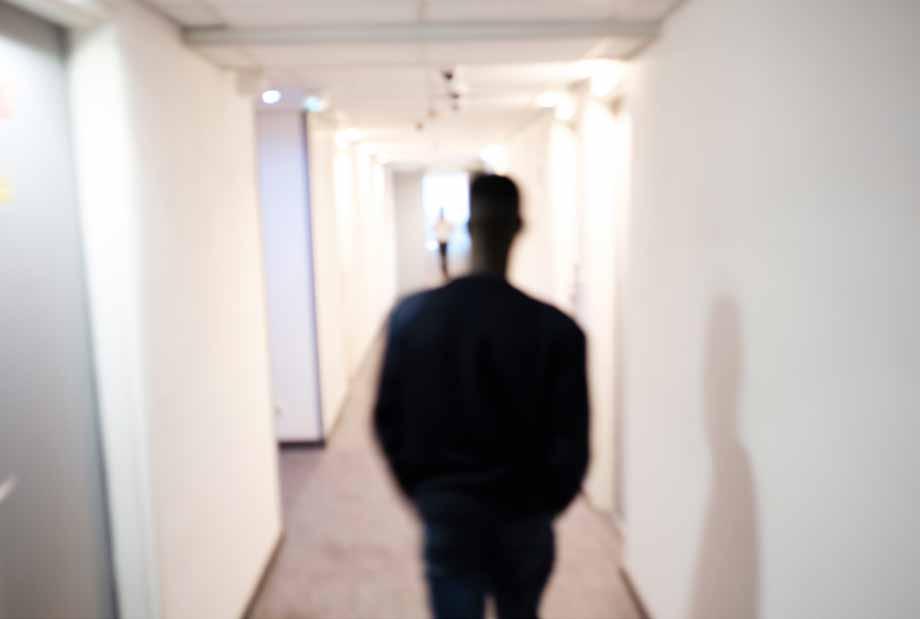
In 2022, in partnership with a major photo agency, Médecins Sans Frontières (MSF) published images of a 16-yearold girl who was the victim of rape in the Democratic Republic of Congo. Following widespread criticism, both within MSF and externally, we removed the images from all our platforms. The controversy sparked a wider conversation about the protection and visual representation of people in the care of MSF, and the circulation of such imagery for editorial, fundraising and commercial purposes.
Bearing witness to the plights of communities we support is fundamental to the mission and identity of our organisation, and over the years, visual stories, commissions and collaborations with media
and photo agencies have played a key role in helping us to do this. Along the way, MSF has contributed to shaping norms and establishing standards in the humanitarian photography field. Today, we must question these very same norms and standards. Photography is a powerful way to inform, provoke and create a sense of empathy. But as a medical organisation, our primary duty must be to protect the privacy, dignity and agency of patients in our care. The medical principle of ‘do no harm’ cannot be sidelined when depicting people in their most vulnerable moments, in order to raise global awareness and funds. We must acknowledge that we have not always lived up to this principle. How did images of suffering bodies become so ubiquitous, and to what extent has MSF contributed to normalising the pain of others? Did we forget to ask ourselves: how would I feel if the person in this photograph was my son, my father, my sister?
This excessive display of suffering is both unjustifiable and unnecessary. As a global NGO, and as individuals, we must reflect on how our worldview and choices are influenced by historical power dynamics, and to what extent they have created deeprooted biases.
MSF has been called out on images of our patients on news and photo agency websites, for which we do not hold the copyright. When photos of our patients are taken during a media visit and posted on a news agency platform, both MSF and the agency instantly lose control over their circulation and use. We must therefore acknowledge that, by prioritising high public visibility, in a context of increased marketisation of the news sector, we have contributed to the over-exposure of people in our care, and facilitated the wide dissemination of sensitive, intrusive and sometimes disturbing images.
While MSF does not profit from these images, news and photo agencies do; many images are available to buy on their websites. They can also be found on social media, and in books and internal publications. In a digital era, images can stay online for decades.
Did all these photos need to be taken? No. Could we have used and disseminated them differently? Yes.
In 2022, heads of communications across the MSF movement recognised our shortcomings and committed to do better. Dr Christos Christou, MSF’s International President, acknowledged that mistakes had been made and reaffirmed that “MSF’s ultimate responsibility is to protect the health and well-being of the people we seek to assist”.
Our drive to implement changes in visual representation converges with our commitment to produce content in a more inclusive, respectful and accurate manner for communications and fundraising, in line with new guidance we produced in 2021. Concrete actions are being taken at different levels of the organisation; all part of a critical self-inquiry period that will help redefine how we produce stories.
Back in 2021, we launched a project to investigate the thousands of images in the MSF archive. We started by reviewing
photographs according to several ethical criteria, including stereotypes, lack of dignity, disturbing or offensive content, protection of minors, security risk, medical practices and nudity. By the end of 2022, this process had helped us identify 10,000 potentially problematic images. The most sensitive images are now hidden from the database for most users, while the remaining ones carry a specific warning in their captions.
In 2023, this preliminary work will be refined by a panel of internal and external advisors, comprising photography and child protection experts, curators, academics, ethicists, patient activists and first-line medical workers. The panel will review a set of these problematic images and make recommendations, which we will apply to the full media database and use as a critical guideline to direct how we collect, store and use images in the future.
Regarding images hosted outside our own media database, we have had a first round of interactions with news and photo agencies to gain an understanding of their ethical standards and content management. Initial findings indicate loose editorial control and high automation of content upload.
As a result, we are taking steps to amend our collaborations with these agencies and asking them to remove or restrict distribution of certain sensitive images. We are also reviewing our standard contracts with external photographers, especially
clauses related to reselling images taken during their assignments to external media. These are complex issues that involve everyone who works with us. Real cultural change will require ownership at all levels of the organisation. We are therefore engaging with a wide variety of people within MSF through surveys and workshops, so that they can contribute to help define how we work with imagery, and also share their challenges, opinions and experiences.
The notion of informed consent and agency will be at the core of these considerations. The process will involve listening to community-based staff to better understand the needs of patients being represented, including their sometimes-strong desire to speak out about the situation they are facing. These conversations will help determine whether a photo should be taken, how it might be used, and for how long.
The outcomes of these internal and external consultations will be analysed in 2023 and will serve as the basis for clear decisions on how we produce, store, commission and disseminate images. Inevitably, there will be difficult conversations and disagreements. However, there is a consensus on the fact that the dignity and integrity of our patients should prevail over all other considerations. Even if it means snapping and sharing less often.
We owe this collective change to the people to whom we provide care.
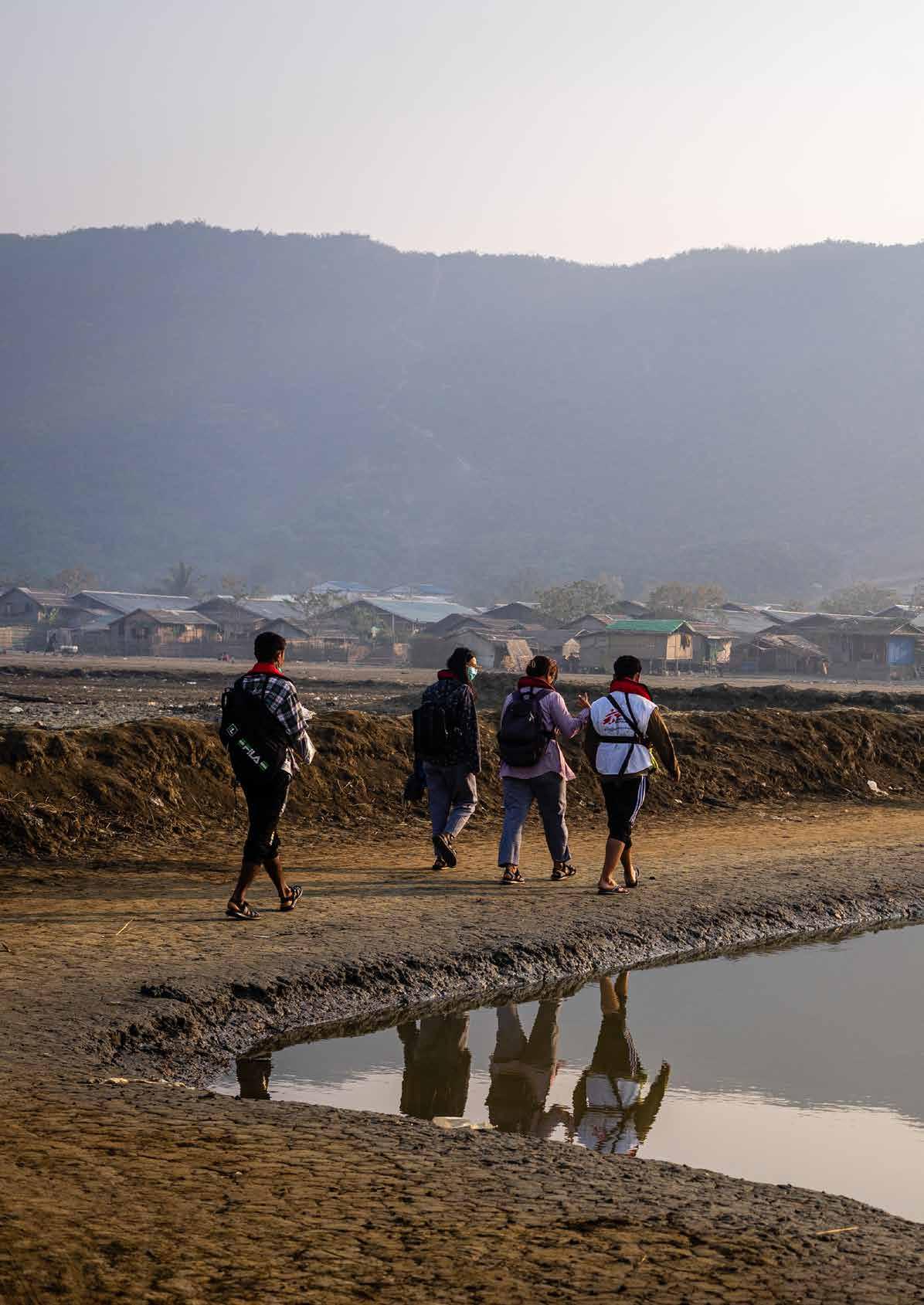
No. staff in 2022: 59 (FTE) » Expenditure in 2022: d4.7 million MSF first worked in Angola: 1983 » msf.org/angola
1,330 admissions of children to outpatient feeding programmes
510 children admitted to inpatient feeding programmes
In 2021, UN agencies sounded the alarm following three consecutive years of severe drought in Angola, and forecast that soaring food prices, combined with poor harvests, could have an impact on child malnutrition, particularly in southern provinces. In preparation, MSF carried out assessments and started medical activities in several areas in 2022.
We worked in close collaboration with the health authorities, as well as with local communities, to open a project aimed at reducing child deaths and strengthening the existing healthcare system, particularly paediatric services, in the western province of Benguela.
Through this project, we improved the early detection of malnutrition in children in the community, increased access to health facilities by organising referrals, and provided much-needed treatment and medical equipment.
As well as supporting San Pedro hospital’s malnutrition intensive care unit and five other outpatient malnutrition care facilities, we conducted health promotion activities in the community,
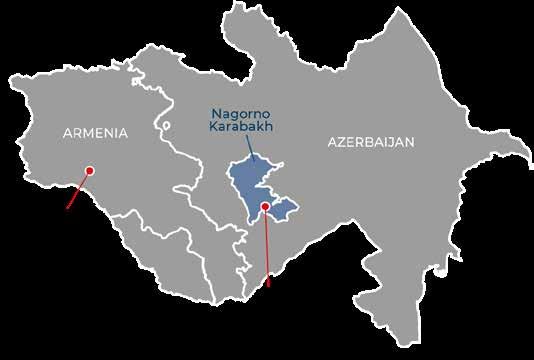
No. staff in 2022: 23 (FTE) » Expenditure in 2022: d1.8 million MSF first worked in Armenia: 1988 » msf.org/armenia MSF first worked in Azerbaijan: 1989 » msf.org/azerbaijan
Médecins Sans Frontières runs a mental health care support project for people in the disputed territory of Nagorno-Karabakh. In 2022, we also started preparations for a new hepatitis C programme in Yerevan, the capital of Armenia.
In Nagorno-Karabakh region, internationally recognised as part of Azerbaijan but mainly populated and governed by ethnic Armenians, we support mental health services provided to people in public health facilities by conducting training and monitoring patient care. The aim is to strengthen
targeting children under five years old for screening, and their parents for health education in the municipalities of Lobito and Catumbela.
In mid-2022, we sent a second assessment team to the southwest province of Huila to prepare for a preventive intervention, as the climate and harvesting conditions had not improved, and food prices and inflation remained high.
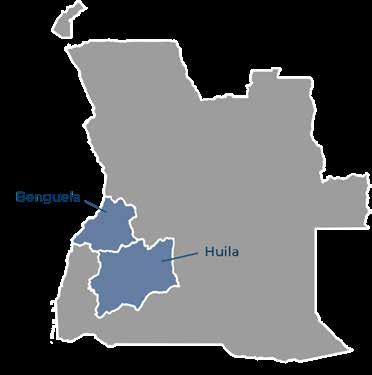
In the municipalities of Cuvango and Chipindo, which have a combined population of about 130,000, rapid nutrition assessments carried out by MSF in the last quarter of the year did not show alarming rates of malnutrition. Drought was also not as serious as predicted; land was being cultivated and there was sufficient livestock available in the areas we assessed. Consequently, while maintaining a malnutrition component to our activities, we focused on increasing access to preventive and curative care for malaria.
the technical capacity of local psychologists, health workers and social workers in these locations, and improve access to mental health services.
In addition, we began preparations for the opening of a new project in Armenia focused on providing hepatitis C treatment to people living in vulnerable circumstances, including prisoners. The project, which will launch in 2023, will offer access to timely screening, diagnosis and treatment for the disease through a simplified ‘one-stop-shop’ service model in a general healthcare facility in Yerevan.
Regions where MSF had projects in 2022 Cities, towns or villages where MSF worked in 2022
The maps and place names used do not reflect any position by MSF on their legal status.
In 2022, Médecins Sans Frontières (MSF) returned to Angola to improve paediatric care for malnutrition and malaria and prepare for the possible consequences of drought on health.
No. staff in 2022: 2,848 (FTE) » Expenditure in 2022: d48.4 million MSF first worked in the country: 1980 » msf.org/afghanistan
337,700 emergency room admissions
138,200 outpatient consultations
42,800 births assisted, including 2,110 caesarean sections
13,700 surgical interventions
9,170 children admitted to inpatient feeding programmes
2,390 people started on treatment for TB
Médecins Sans Frontières (MSF) runs a range of projects in Afghanistan, responding to the immense medical needs caused by decades of conflict and political upheaval, particularly among women and children.
When the Islamic Emirate of Afghanistan, also known as the Taliban, entered the capital, Kabul, and took over power on 15 August 2021, foreign development funding was cut overnight. Afghan assets held in the US and in some other foreign countries were frozen and many international organisations left the country. This added more pressure to an already fragile, over-burdened public health system, making it increasingly difficult for people to obtain healthcare.
Although the security situation improved in 2022, and it generally became easier for people to travel to health facilities, many Afghans still faced huge challenges in accessing care. In a broken economy, many could not afford hospital visits, while for women, there were the additional barriers of the limitations placed on their freedom of movement, access to education and work. Consequently, many people delayed seeking assistance until they had no other option.
In 2022, we saw an increase in the number of people coming to our facilities, possibly due to the lack of free, local medical services and the fact that travel was safer. We ran seven projects in seven provinces, maintaining a strong focus on providing specialised healthcare. MSF also carried
out an emergency response after a 5.9 magnitude earthquake hit Paktika and Khost provinces on 22 June. Our teams provided medical and logistical materials to the affected area, and set up outpatient and inpatient clinics for women and children, as well as for patients with trauma injuries or acute watery diarrhoea.
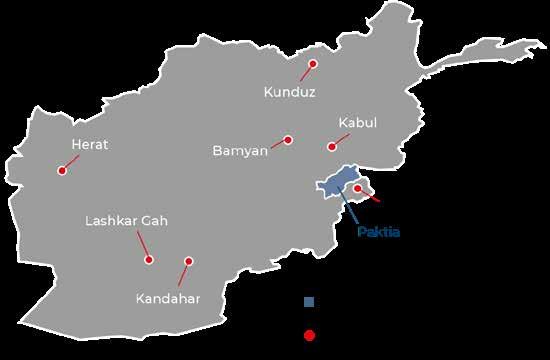
Lashkar Gah
MSF supports the 340-bed Boost hospital in Lashkar Gah, Helmand province, offering a wide range of medical services, including maternal and paediatric healthcare and surgery. In 2022, there was a 32 per cent increase in patients admitted to the hospital compared to the previous year. This increase can be attributed primarily to the fact that many health facilities in remote districts of Helmand suspended or limited their activities due to a lack of funding, medical supplies and qualified healthcare workers. Many people were forced to travel to Lashkar Gah to receive care as a result.
Kunduz
MSF’s Kunduz trauma centre has an emergency room, intensive care unit (ICU), inpatient and outpatient departments, and two operating theatres. The majority of admissions to the centre are for trauma incurred in accidents, but we also provide care to people with violence-related injuries, such as explosions.
Our team in Kunduz reported that seriously injured patients sometimes took more than seven hours to reach the centre. Such long delays can be very detrimental to patient outcomes, and speak not only to the limited referral and trauma care services in Kunduz, but also to poor road infrastructure in rural communities.
In November, MSF opened a heath post in Chardara district, to respond to gaps in local healthcare, including nutrition support and routine vaccination services.
Gul washes his hands with the help of his son in the male inpatient department at the MSF-supported Boost hospital in Lashkar Gah, Helmand province. Afghanistan, January 2022. © Oriane Zerah
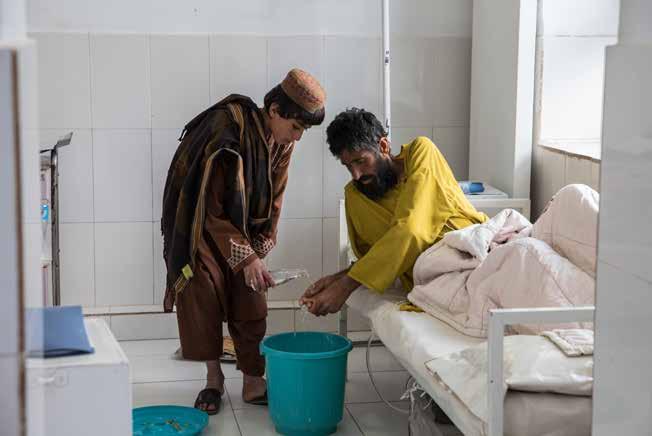
The neonatal intensive care unit at the MSF-supported Boost hospital in Lashkar Gah, Helmand province. Afghanistan, January 2022.
© Oriane ZerahKabul
In the capital, we supported Maiwand teaching hospital by carrying out renovation work on the paediatric department and opening two new facilities: a 28-bed measles ward in February and a 34-bed inpatient therapeutic feeding centre (ITFC) in July.
We continued our collaboration with the Afghan Midwives Association’s pilot project by providing funding and technical support for deliveries, anteand postnatal care, and family planning.
In Khost, MSF runs a dedicated hospital offering neonatal and maternal care, with a special focus on complicated deliveries. The hospital has a 60-bed maternity unit, a 28-bed neonatal unit and two operating theatres.
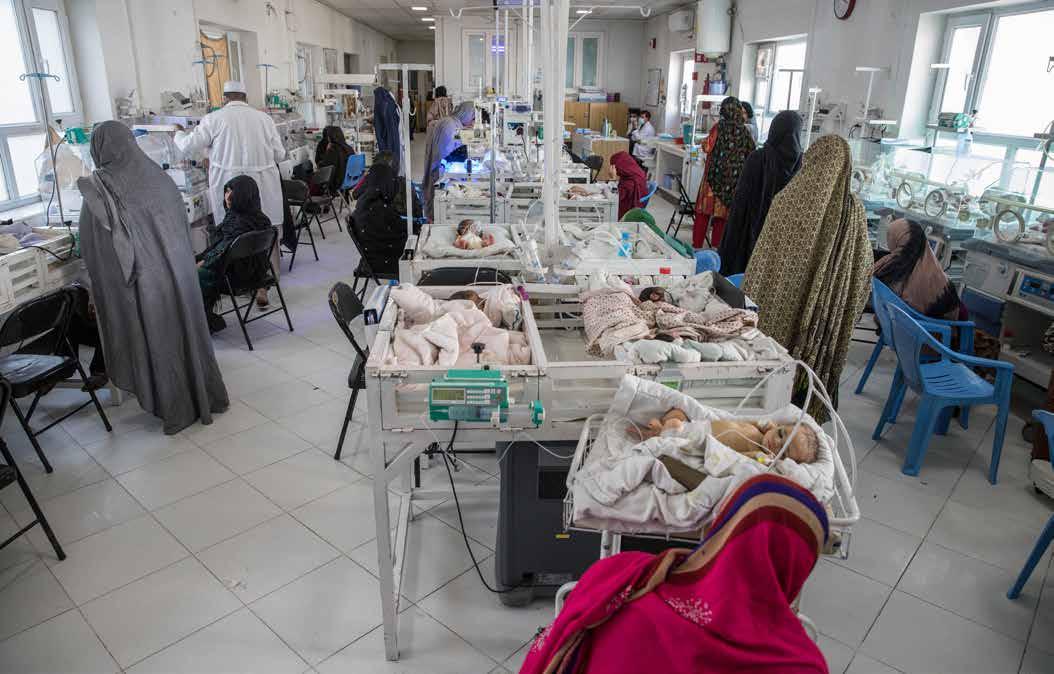
In 2022, we also supported eight local health centres across the province, providing medicines and funding for additional midwives, so that women with no risk factors for obstetric complications could give birth closer to home. In addition, MSF donated medicines and other supplies to Khost provincial hospital.
We have been treating both drug-sensitive and drug-resistant forms of tuberculosis (TB) in Kandahar since 2016. Our hospital has a laboratory, an outpatient clinic and a 24-bed inpatient department for patients with drugresistant TB (DR-TB) and other illnesses, and for
those who develop severe side-effects after taking DR-TB medication. To respond to elevated levels of malnutrition in the province, we also opened a 40-bed ITFC in 2022.
In Herat regional hospital, MSF supports the paediatric department’s triage, emergency room, ICU, ITFC and hospitalisation ward. Over the course of 2022, we screened and admitted thousands of patients for emergency care. The main reasons for admission were infections of the central nervous system, such as meningitis, and for septic shock, sepsis and pneumonia.
The total number of admissions to the hospital’s ITFC increased by 42 per cent in 2022 compared to 2021. Almost 50 per cent of patients were younger than six months old. Meanwhile, in camps for displaced people, we treated pregnant and lactating women, and children with moderate acute malnutrition, as well as providing general healthcare, in Kahdestan outpatient clinic.
In March, MSF started a new project in Bamyan province to support the provincial hospital with staff, donations of medications, isolation ward management, and capacity building for measles case management and the COVID-19 response.
We also completed the first phase of an assessment in three districts – Shibar, Saighan and Yakawlang – and the construction of eight community health facilities in Sar-e-Tarnook, Baghalak, Dar-e-Ali, Bande-Amir, Pusht-e-Waz, Amrut, Baghak, and Jalmish.
No. staff in 2022: 2,043 (FTE) » Expenditure in 2022: d28 million MSF first worked in the country: 1985 » msf.org/bangladesh
KEY MEDICAL FIGURES
895,300 outpatient consultations
362,800 individual mental health consultations
23,800 patients admitted to hospital
5,310 births assisted
In Bangladesh, Médecins Sans Frontières (MSF) provides healthcare for Rohingya refugees who have fled persecution in Myanmar. In 2022, we also supported responses to flooding and outbreaks of diarrhoea.
Across 10 facilities in Cox’s Bazar, our teams run a range of services to address some of the vast health needs of more than 920,000 Rohingya refugees living in camps, as well as a growing number of patients from the host community. Activities include general healthcare, treatment for chronic diseases, psychosocial support and women’s healthcare.
From March, we saw a rapid surge in patients with scabies that continued throughout the year, resulting in a significant increase in admissions to our facilities.
In April, we carried out a survey on water, hygiene and sanitation in the refugee camps, which showed that 88 per cent of inhabitants had no access to proper sanitation facilities, while 76 per cent of the available toilets were overflowing.
In Kamrangirchar district, in the capital, Dhaka, we collaborated with the Center for Injury Prevention
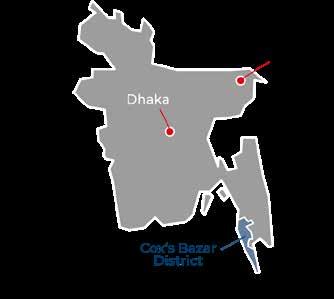
No. staff in 2022: 29 (FTE) » Expenditure in 2022: d1.3 million MSF first worked in the country: 2015 » msf.org/belarus
KEY MEDICAL FIGURE
340 people started on treatment for multidrug-resistant TB (MDR-TB)
In Belarus, Médecins Sans Frontières (MSF) continued to support the national tuberculosis (TB) programme and provide medical and humanitarian assistance to people on the move.
In 2022, our team in the capital, Minsk, completed the final phase of the TB-PRACTECAL clinical trial, which was conducted across seven global sites and aimed to identify a new treatment regimen for patients with multidrug-resistant TB (MDR-TB). This all-oral, shorter regimen has proved to be more tolerable and more effective. In May, the World Health Organization released communication on the guidance for the treatment of MDR-TB, recommending programmatic use of the TBPRACTECAL regimen in place of the longer, existing regimens. Consequently, our teams supported the
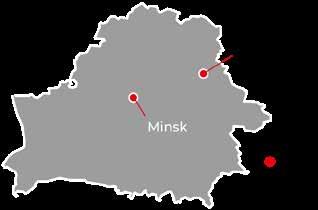
Regions where MSF had projects in 2022 Cities, towns or villages where MSF worked in 2022
and Research Bangladesh to conduct a feasibility study in two metal factories, aimed at improving work safety and reducing injuries, focusing particularly on female and young workers.
In April, Dhaka hospitals started seeing an increase in cases of acute watery diarrhoea. In response, our teams donated supplies of saline solution and other medical materials to the Ministry of Health.
In July, MSF teams supported the Bangladesh Rehabilitation Assistance Committee’s response to a severe flash flood in Sylhet, in the northeast of the country. We distributed water, hygiene and sanitation kits to households, and ran mobile clinics in boats, providing emergency medical care.
In addition, we continued to offer technical support to the Ministry of Health to raise awareness among health workers and the community of the dangers of methanol poisoning, and contributed to the development of the National Mental Health Act, issued in 2022.
Cities, towns or villages where MSF worked in 2022
roll-out of the new regimen in Belarus under the SMARRTT (six-month all-oral regimens for rifampicinresistant tuberculosis treatment) operational study, with 300 patients enrolled by the end of October.
We also continued to work in the penitentiary system, supporting the treatment of hepatitis C and TB, and in one location, the provision of mental health care.
Throughout 2022, thousands of people continued to travel to Belarus in the hope of crossing into the EU. Our teams offered medical and humanitarian assistance to people who had sustained injuries during attempts to cross or when exposed to harsh weather conditions while stranded in the forested border area. MSF continues to advocate for people on the move and call for greater humanitarian assistance to be provided for them.
No. staff in 2022: 36 (FTE) » Expenditure in 2022: d3.9 million MSF first worked in the country: 1987 » msf.org/belgium
4,760 outpatient consultations
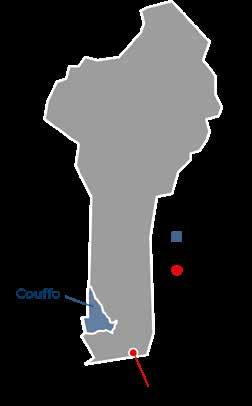
130 mental health consultations provided in group sessions KEY MEDICAL FIGURES
The situation for migrants and asylum seekers in Belgium reached crisis point in 2022, with more than 8,000 individuals, including young children, left on the street without any support.
In view of the government’s failure to provide shelter to people seeking protection, and in order to address their increasingly unmet medical needs, Médecins Sans Frontières (MSF) opened a temporary medical clinic in front of the Immigration Office registration centre in Brussels in October 2022. Here, our teams witnessed a considerable number of medical issues directly linked with poor living conditions.
Through consultations, we identified the first cases of diphtheria among migrants in Belgium, a disease that can be directly linked to people’s precarious
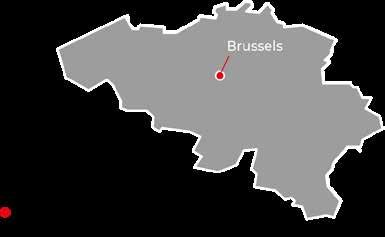
living conditions, but which is easily preventable through vaccination. As a result, our teams decided to launch a vaccination campaign to address the rising number of diphtheria cases among people living in squats and on the street.
We continued, in collaboration with other NGOs, to run our humanitarian hub in Brussels, where we provide psychological consultations. Patients needing more specialised care are invited to make an appointment with psychologists in our mental health clinic, which is located next door.
In addition, MSF outreach teams assisted people experiencing homelessness and migrants living in squats and shelters by providing medical consultations, health promotion, and infection prevention and control activities.
No. staff in 2022: 25 (FTE) » Expenditure in 2022: d1.6 million MSF first worked in the country: 1985 » msf.org/benin
KEY MEDICAL FIGURES
2,530 patients admitted to hospital
1,540 outpatient consultations
830 births assisted, including 190 caesarean sections
After an absence of 17 years, Médecins Sans Frontières returned to Benin in 2022 to respond to gaps in healthcare caused by the deteriorating security situation in the north of the country.
We opened a first project in the department of Couffo, in the southwest of the country, to improve access to sexual, reproductive, obstetric, maternal and neonatal healthcare. Our aim is to reduce illness and death among pregnant women and newborn babies, and provide better continuity of care between the community, health centres and the hospital in the Klouékanmè-Toviklin-Lalo health zone.
In October, our teams started to provide family planning consultations, midwifery, ante- and postnatal services, treatment for victims of sexual violence, and safe abortion care for
women who requested it. In addition, we trained and supervised health staff, and upgraded infrastructure by constructing an air-conditioned warehouse at the hospital for the storage of medical equipment, and a water tower in a health centre to ensure access to safe water for patients.
We undertook two additional exploratory missions in 2022 with the aim of opening a new project in the northern part of the country, which has been prone to attacks from non-state armed groups for almost two years.
No. staff in 2022: 53 (FTE) » Expenditure in 2022: d2.2 million MSF first worked in the country: 1991 » msf.org/brazil
KEY MEDICAL FIGURES
5,520 outpatient consultations
1,350 individual mental health consultations
540 mental health consultations provided in group sessions
In 2022, Médecins Sans Frontières conducted activities to assist the growing numbers of Venezuelan migrants arriving in Brazil. We also provided mental health care for people affected by floods and landslides.
The end of border closures imposed during the COVID-19 pandemic resulted in a huge increase in new arrivals at the end of 2021. The number of Venezuelans who crossed the border surpassed 160,000 in 2022, 1 more than in the two previous years combined. This placed an additional strain on already overburdened local healthcare facilities.
As a result, we scaled up our response in the northern state of Roraima, assisting with the provision of general healthcare, health promotion, mental health support, and sexual and reproductive health services, by running mobile clinics in migrant hotspots, shelters and informal settlements in the capital, Boa Vista, and in Pacaraima.
We also provided medical assistance to indigenous communities from Venezuela in rural areas around Pacaraima. These migrants are particularly
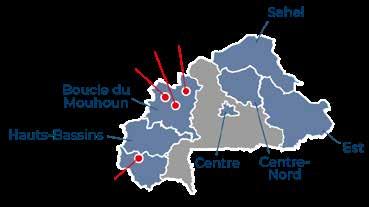
No. staff in 2022: 1,176 (FTE) » Expenditure in 2022: d26.3 million MSF first worked in the country: 1995 » msf.org/burkina-faso
KEY MEDICAL FIGURES
79,033,000 litres of water distributed
1,016,400 outpatient consultations
380,400 malaria cases treated 29,500 patients admitted to hospital
A growing number of cities have been besieged by armed groups, sometimes forcing our teams to suspend or cease activities altogether. In 2022, after armed groups took control of Pama, Sebba and Djibo, where we support health centres and work to improve water supply, access via land soon became virtually impossible. Food and medical supplies could only be delivered by military convoys or by air, causing severe shortages and a steep rise in prices.
vulnerable, due to the barriers they face in accessing the public health system.
In the first half of 2022, we offered mental health support and training for communities affected by severe floods and landslides in Rio de Janeiro, Bahia and Pernambuco. With search and rescue activities covered by local authorities, we focused on increasing access to mental health support. Our teams trained health workers, as well as civil servants such as teachers, social workers and community leaders, so that they could provide psychosocial support to survivors of the disaster, and also create a long-lasting local capacity to enable communities to respond to such events in the future.
1 https://brazil.iom.int/sites/g/files/tmzbdl1496/files/documents/ Informe_Migracao-Venezuelana_Jan2017-Dez2022.pdf
Health facilities in the country also face staff shortages, as many medical professionals have fled the violence. Threats against our staff and patients, increased checkpoints, and restrictions on our supply lines by armed groups forced us to close projects in Centre-Nord and Sahel regions in 2022. Nevertheless, our teams continued to deliver humanitarian and medical assistance to displaced people and host communities throughout the year, focusing on tackling major health issues, including malaria, outbreaks of measles and other diseases, mental health and sexual violence, and supporting access to community-based basic and specialist healthcare. Our teams also trucked in water, and constructed and renovated boreholes to address the severe water shortage exacerbated by the ongoing conflict.
Médecins Sans Frontières (MSF) continues to respond to urgent medical needs across Burkina Faso, despite increased insecurity caused by ongoing conflict between the government and non-state armed groups.
No. staff in 2022: 164 (FTE) » Expenditure in 2022: d4.7 million MSF first worked in the country: 1992 » msf.org/burundi
MEDICAL FIGURES
1,478,200 outpatient consultations
571,000 malaria cases treated
In Burundi, Médecins Sans Frontières (MSF) responded to malaria and cholera outbreaks, while also working to improve trauma care and treatment for neglected diseases.
Malaria remains a key priority for MSF in the country, as a leading cause of death, particularly among young children. In 2022, our teams supported the Ministry of Health in providing care to patients affected by malaria peaks in Kinyinya and Gisuru, Ruyigi province, and also started implementing a home-based care approach for the disease in Ryansoro district, Gitega province.
When malaria cases started to soar in the Cibitoke health district in July, we launched an emergency intervention, as local hospital capacities were rapidly overwhelmed by the number of patients. MSF notably supported free malaria care and the recruitment of health staff in health facilities, organised medical training, and provided medicines and medical equipment, including for safe blood transfusions.
In total, we supported the provision of care in two hospitals and 14 health centres in Cibitoke, while also
No. staff in 2022: 457 (FTE) » Expenditure in 2022: d15.6 million MSF first worked in the country: 1984 » msf.org/cameroon
KEY MEDICAL FIGURES
150,000 outpatient consultations
72,500 people vaccinated against cholera in response to an outbreak
52,900 malaria cases treated
860 surgical interventions
In Cameroon, Médecins Sans Frontières (MSF) continued to respond to health emergencies, such as disease outbreaks, floods and mass displacement, in spite of a partial suspension of activities in 2022.
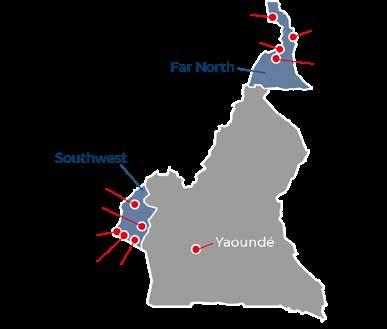
Although there were new waves of displacement in Far North, Northwest and Southwest regions during the year, we were forced to reduce our activities even further when four of our staff were imprisoned and accused of complicity with secession in Buea, in Southwest region. They were all later exonerated; however, we were not able to resume our medical services as the government provided no guarantees that our staff and patients would be protected. Meanwhile, the suspension of our medical activities ordered by Cameroonian authorities in Northwest region in December 2020 remains in place, meaning that these two anglophone regions, which have been engulfed in conflict since 2016, have been left without much-needed support.
In Far North region, we responded to the increasing healthcare needs with patient treatment, training of medical staff, and reinforcement of medical supplies
Regions where MSF had projects in 2022
working with a network of around 70 community health workers to manage patients in the community. In December, when Cibitoke was also hit by a cholera outbreak, our teams responded by supporting care at the cholera treatment centre in Rugombo.
At the end of April, we closed our detection and care project for patients with lower-limb ulcers in Giteranyi health district, Muyinga province, as the number of cases had significantly reduced. In 2022, we ran an operational research initiative in Kiganda health district, Muramvya province, while working on patient management capacity reinforcement for local medical staff. The research will help authorities and other partners to better understand the causes and transmission mode of this neglected disease.
In April, we also ended our trauma care capacitybuilding partnership with Bujumbura’s Prince Regent Charles hospital, where we had trained medical staff in the treatment of patients with severe trauma. Beyond this facility, we also supported the city of Bujumbura in bringing together several agencies to reinforce the implementation of mass-casualty plans.
Cities, towns or villages where MSF worked in 2022 Regions where MSF had projects Cities, towns or villages where MSF worked in 2022
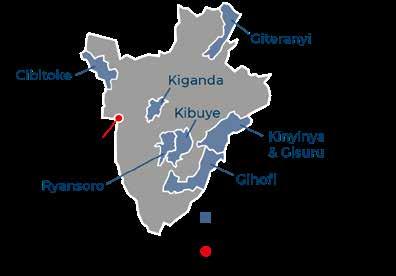
in health centres supported by MSF. We also helped improve access to healthcare at community level, by working with community health volunteers, whom we have trained to treat simple cases of common diseases. Heavy rains in Kousseri caused thousands of people to abandon their homes. During the ensuing high peak in malaria, we scaled up treatment in the area. Due to insecurity issues, we took the hard decision to end our activities in Fotokol, where some of our staff were abducted in January 2022.
There was a surge in cholera cases in several regions in 2022. MSF supported the national response in Centre, Littoral, West and Far North regions, by providing epidemiological surveillance, training for community health workers, hygiene activities to curb the spread of the disease, and vaccinations. We also supported the national COVID-19 response in the capital, Yaoundé, with testing and vaccinations.
No. staff in 2022: 2,795 (FTE) » Expenditure in 2022: d67.6 million MSF first worked in the country: 1997 » msf.org/central-african-republic
937,200 outpatient consultations
8,960 surgical interventions
8,740 people on first-line ARV treatment under direct MSF care
6,220 people treated for sexual violence
Despite ongoing insecurity, Médecins Sans Frontières (MSF) continues to run programmes focused on maternal and child health, and responding to conflict, displacement and disease outbreaks in Central African Republic (CAR).
Although conflict abated in major towns controlled by government and foreign allied forces in 2022, insecurity remained high in rural areas where armed opposition groups were active. By the end of the year, nearly one million people were either internally displaced Central Africans or refugees from neighbouring countries, according to the UN. Violence continued to affect people’s lives and restrict the delivery of humanitarian aid. MSF teams were victims of several incidents, including an attack on a convoy of vehicles on the outskirts of Kabo in January, which forced us to close the project we had been running there for 16 years.
We continued to run 12 basic and specialist healthcare projects across the country, focusing on maternal and child health, surgery, sexual violence, and treatment for HIV and tuberculosis. We implement a decentralised model of care where possible, delivering services closer to patients.
No. staff in 2022: 883 (FTE) » Expenditure in 2022: d32 million MSF first worked in the country: 1981 » msf.org/chad
541,000 people vaccinated against yellow fever
411,700 people vaccinated against measles in response to an outbreak
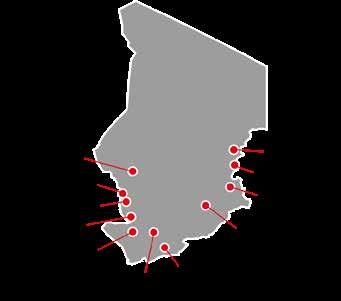
52,000 admissions of children to outpatient feeding programmes
18,400 patients admitted to hospital
In Chad, Médecins Sans Frontières continues to work to address the chronic health crisis. With repeated epidemics and nutrition emergencies, it has some of the world’s highest rates of child and maternal deaths.
Our teams focus on supporting women, children, and the large number of refugees from conflicts in neighbouring countries. In 2022, our teams responded to several emergencies in the capital, N’Djamena, and other parts of the country.
In the southwest, we provided medical consultations and hospital referrals for people who had fled intercommunal clashes in northern Cameroon. As a separate intercommunal conflict in the Chadian region of Mayo-Kebbi Est pushed more people to flee, we provided medical assistance in Kélo and responded to a measles outbreak in Bongor.
In Adré district, we scaled up activities to assist a new influx of refugees following a surge in conflict in Sudan’s Darfur region. We also helped improve access to medical care, safe water, and hygiene and sanitation services in refugee camps in Guereda district between March and December.
After N’Djamena was hit by floods in September, we responded to the urgent needs of people left with
We also responded to outbreaks of diseases resulting from low vaccination coverage, such as whooping cough in Baoro, and launched a vaccination campaign in Kembé to offer protection from preventable diseases, including measles, polio, yellow fever and meningitis. In Ippy, we assisted thousands of people displaced by fighting by providing medical care and multi-antigen vaccinations, installing water and sanitation facilities, and distributing relief items.
Malaria remained the leading reason for visits to our health facilities and the main cause of death among children under five.
In line with the continuous efforts made since 2014 to reduce CAR’s maternal and child death rates in the capital, Bangui, MSF completed the construction of new maternity and neonatal wards in a hospital, and started providing emergency obstetric and neonatal care.
minimal access to services and exposed to heightened risks of diseases. Our teams offered medical care, nutrition support, essential relief items, and water and sanitation services in several displacement sites.
In Am Timan, we responded to an alarming situation by treating severely malnourished children in six health facilities and the hospital. Meanwhile, we maintained our paediatric and nutrition services in the capital, and in Moïssala and Massakory.
We also supported vaccinations and treatment in response to an outbreak of yellow fever in Moïssala and Goundi districts, and worked in partnership with the Ministry of Health to improve obstetric and maternal healthcare at Moïssala hospital.
In Dar Sila, we continued to run our community-based health programme, putting community members at the heart of all strategic decision making, with the aim of preventing diseases and safeguarding maternal health.
No. staff in 2022: 95 (FTE) » Expenditure in 2022: d2.8 million MSF first worked in the country: 1985 » msf.org/colombia
3,600 outpatient consultations
200 individual mental health consultations KEY MEDICAL FIGURES
550 consultations for contraceptive services
In Colombia, Médecins Sans Frontières (MSF) focused on assisting people affected by armed conflict in 2022. Many were living in precarious conditions, exposed to violence and disease.
In the departments of Nariño and Chocó, MSF has been implementing a decentralised model of care, aiming to make healthcare more accessible by bringing it closer to people’s homes.
In Nariño, MSF worked with a team of community health workers and local organisations to provide general and mental health care to communities affected by armed conflict in rural areas of the Telembí triangle sub-region (Barbacoas, Roberto Payán and Magüí Payán). We also supported people who had been displaced by continued armed conflicts by distributing relief items, such as hygiene and cooking kits, and offering healthcare through mobile clinics, as well as water and sanitation activities.
In 2022, we launched a new project in Alto Baudó region, in Chocó, where there were repeated clashes between armed groups, severely limiting
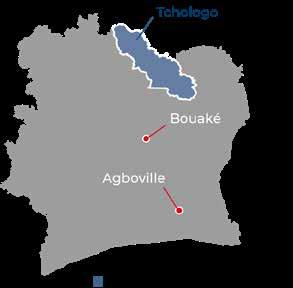
No. staff in 2022: 103 (FTE) » Expenditure in 2022: d2.6 million MSF first worked in the country: 1990 » msf.org/cotedivoire
2,500 individual mental health consultations KEY MEDICAL FIGURE
During the year, Médecins Sans Frontières (MSF) sent teams to assess the humanitarian needs in northern Côte d’Ivoire, where there has been an influx of refugees from neighbouring Burkina Faso, driven from their homes by recurrent violence.
Tchologo, like other regions in the north of Côte d’Ivoire, is affected by this flow of refugees. Some people are hosted by local families, but many are living in precarious conditions, with little access to basic services, including healthcare.
MSF donated medical equipment to health facilities in Tchologo in 2022, and in light of the serious needs our teams witnessed during their assessment, prepared to support both refugees
access to healthcare, food and education for rural communities. Over the course of the year, we made hundreds of medical referrals and conducted training sessions with community health workers from remote villages in the region, who work to facilitate access to health services for their communities.
In our emergency response project, we supported communities affected by the armed conflict in Chocó, Cauca and Arauca, mainly in areas where there is no humanitarian assistance. We sent mobile clinics to provide medical care and mental health support, as well as water and sanitation services.
MSF continues to call on the authorities to make healthcare more available in remote areas of Colombia, especially for communities displaced or confined by violence.
projects in 2022 Cities, towns or villages where MSF worked in 2022
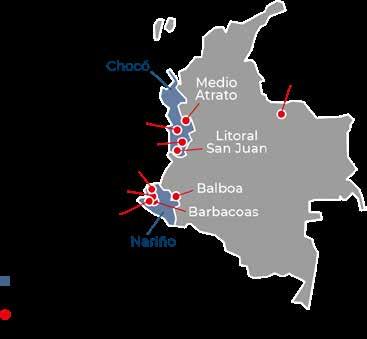
and the host communities for at least three months, with the provision of general healthcare and reproductive health services, particularly in Ouangolodougou district.
Our regular activities in Côte d’Ivoire continued in 2022, in collaboration with our local partners and the country’s health authorities. Our project in Bouaké provides care for people living with mental health disorders and epilepsy, while the one in Agnéby-Tiassa promotes access to specialist care, including cardiology, gynaecology, obstetrics and paediatrics, via a telemedicine service.
In Côte d’Ivoire, we run a project focusing on mental health disorders and epilepsy, and provide a telemedicine service.
No. staff in 2021: 2,670 (FTE) » Expenditure in 2021: d113.4 million MSF first worked in the country: 1977 » msf.org/drc
2,143,600 vaccinations against measles in response to an outbreak
2,116,500 outpatient consultations
757,800 malaria cases treated
13,600 surgical interventions
10,000 people treated for sexual violence
1,900 people with advanced HIV under direct MSF care
Médecins Sans Frontières (MSF) runs large-scale projects in the Democratic Republic of Congo (DRC), responding to the devastating effects of violence and other health emergencies, such as disease outbreaks and malnutrition.
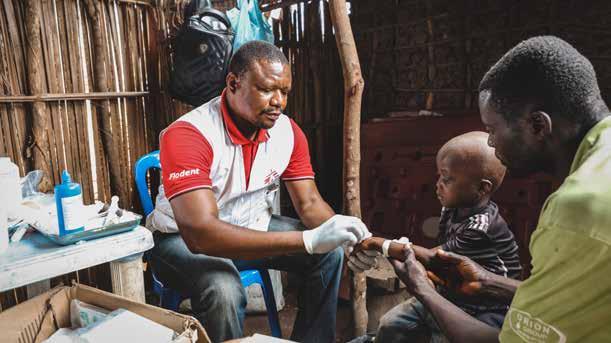
The humanitarian situation deteriorated further in DRC last year, mainly because of increased levels of armed violence, in particular due to the resurgence of the M23 armed group in North Kivu. The escalation in conflict and insecurity forced nearly 600,000 people to flee their homes, in a province where 1.9 million people had already been displaced.
Throughout the year, fighting was concentrated in Rutshuru territory, North Kivu. While most humanitarian organisations left the area, MSF maintained regular activities, supporting health facilities in Rutshuru, Binza, Kibirizi and Bambo to provide intensive care, surgery, therapeutic nutrition and treatment for victims of sexual violence. In addition, we set up emergency interventions for displaced communities. As well as delivering healthcare by running mobile clinics and supporting essential care in health centres located in nearby displacement sites, our teams built latrines, and distributed water and relief items such as hygiene and cooking kits.
Due to the violence in Rutshuru, tens of thousands of people fled to neighbouring Nyiragongo territory,
near Goma, where they gathered in informal settlements that were totally lacking in basic services such as shelter, healthcare, food and water. MSF was one of the first organisations to launch an emergency intervention in the settlements in Munigi and Kanyaruchinya. Our teams offered general healthcare, treatment for victims of sexual violence, referrals to Goma hospitals, and safe drinking water, while repeatedly calling on the humanitarian community to support the response. When the first suspected cases of cholera were reported in these settlements in August, we organised an oral vaccination campaign. However, in October, as fighting intensified in Rutshuru territory, there was a huge influx of new arrivals, and a cholera outbreak could not be prevented. For many weeks, our teams were the only healthcare providers responding to this emergency, setting up dedicated treatment centres.
The violence was by no means limited to the areas directly affected by the resurgence of M23. Conflict broke out in other areas of North Kivu, such as Masisi, and deliberate attacks against civilians continued unabated in Ituri province. Although the lack of security guarantees for our teams forced us to close our projects in Nizi and Bambu, in Djugu territory, we maintained our activities in and around Drodro, treating victims of violence and providing access to basic healthcare, as well as water and sanitation activities for displaced and host communities.
Elswhere in DRC, our teams supported people affected by outbreaks of violence in Tshikula territory (Kasaï Central), and in Mai-Ndombe and Kwilu provinces, where an intercommunity dispute over land quickly spiralled out of control. Here, our teams organised hundreds of medical consultations and referred the seriously injured to the capital, Kinshasa.
While the resurgence of M23 was the main focus of public attention towards DRC in 2022, another underreported health crisis was once again a major cause of MSF’s emergency interventions: a new, country-wide flare-up in measles cases. Measles reached epidemic levels in nearly half of DRC’s health zones, with close to 150,000 cases and 1,800 deaths officially reported.
Our teams carried out 45 specific measles responses in the country, while also continuing to run our usual immunisation and care activities in our regular projects. We vaccinated over two million children against measles in the course of 2022.
We responded to other disease outbreaks during the year, including cholera in North Kivu, South Kivu and Kasaï Oriental provinces, where we treated patients and protected tens of thousands of people through oral cholera vaccinations. We also assisted the Ministry of Health’s response to a meningitis outbreak in Haut-Uélé, and to two Ebola outbreaks in Equateur and North Kivu provinces.
In addition to our emergency responses, we maintained our regular general and specialist medical activities across the country, including HIV and tuberculosis treatment, sexual and reproductive healthcare, safe abortion care, mental health services, and support to marginalised people, such as children living on the street, prisoners and professional sex workers. We also supported the rehabilitation and construction of several health facilities.
Malnutrition continued to be a key medical issue in several provinces, leading us to launch dedicated interventions in Tshopo, South Kivu and Haut-Uélé. Malaria also remained one of the main diseases treated by our teams in the country. In 2022, we launched specific prevention and treatment activities in South Kivu during the peak season to support the health authorities. We also conducted major indoor household spraying campaigns and mass drug administration activities, the latter consisting of the distribution of a malaria chemoprophylaxis, in Angumu, Ituri, to reduce the high prevalence of malaria in the area.
Meanwhile, the number of patients admitted for sexual violence remained remarkably high in the five provinces where we have dedicated projects for victims, offering them a full package of medical and psychological care. As part of an innovative approach to addressing the high level of sexual violence in Salamabila, our teams worked with the community to set up two ‘husband schools’, spaces where men engage in awareness-raising sessions on sexual violence. The aim is to inform and influence them in a positive way, as they are usually the primary decision makers within their households and their communities.
The extent of activities carried out in DRC by MSF in 2022 once again reflects the magnitude of the medical humanitarian needs in the country. At the end of the year, over 26 million people were in need of assistance, and more than 5.7 million remained displaced, the largest number on the African continent. 1
1 UNHCR: https://www.unhcr.org/emergencies/dr-congoemergency
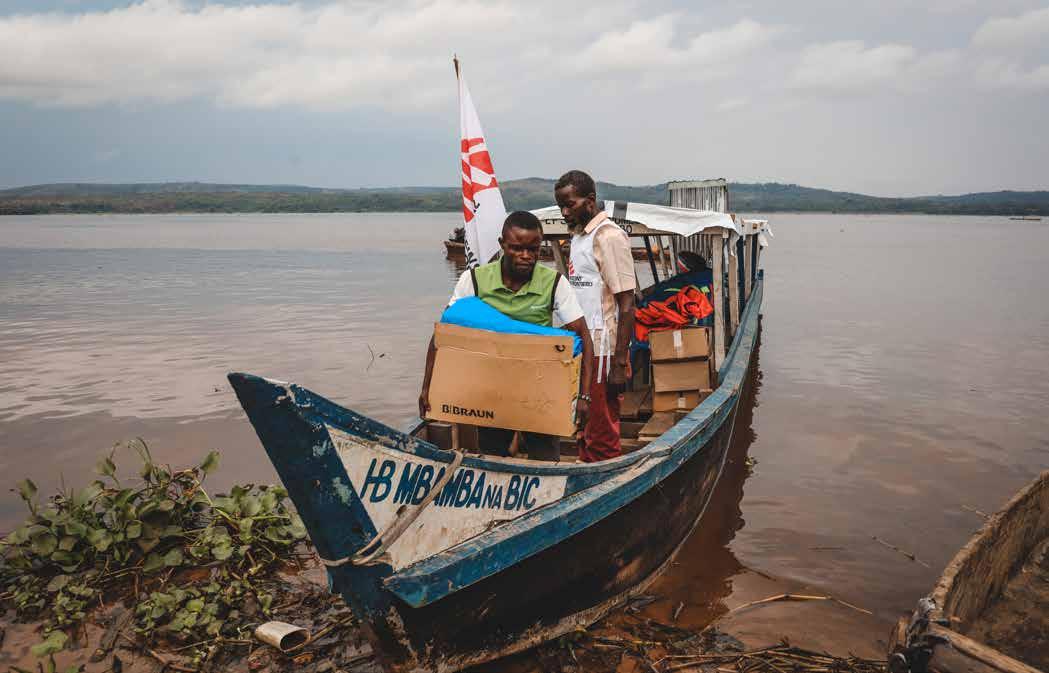
No. staff in 2022: 3 (FTE) » Expenditure in 2022: d0.4 million MSF first worked in the country: 1995 » msf.org/dpr-korea
The borders of the Democratic People’s Republic of Korea (DPRK) remained closed in 2022, preventing Médecins Sans Frontières and other humanitarian organisations from visiting projects and delivering supplies.

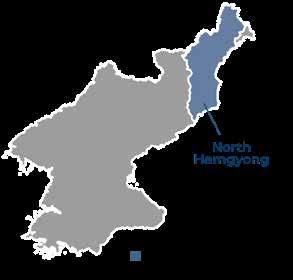
The medical humanitarian situation in DPRK reportedly deteriorated throughout the year. All international aid agencies have withdrawn from
the country due to the ongoing border closures and strict movement restrictions imposed during the COVID-19 pandemic, as well as the UN-led sanctions. The economic situation in the country appears to have worsened, with people facing severe shortages of food and medicines, and limited access to healthcare.
Despite restrictions, we continued to engage with the authorities, aiming to resume activities when possible.
No. staff in 2022: 152 (FTE) » Expenditure in 2022: d3.7 million MSF first worked in the country: 2010 » msf.org/egypt
20,300 outpatient consultations
10,700 individual mental health consultations KEY MEDICAL FIGURES
In Egypt, Médecins Sans Frontières provides healthcare services for migrants, asylum seekers and refugees who have been subjected to violence.
Many migrants, asylum seekers and refugees in Egypt are suffering the physical and psychological consequences of the violence and exploitation they have experienced in their home countries, during their journeys, or at their destination.
To respond to their specific needs, we run a clinic in the capital, Cairo. The facility offers a comprehensive package of care for victims of violence, including general healthcare,
gynaecology, mental health support and psychosocial consultations, as well as specialist referrals when needed.
The programme also has a social component, linking patients to partner organisations for housing, food, orientation guidance, protection services and advice concerning other social issues. Our teams accompany patients through their recovery process, and conduct awareness-raising and outreach activities among migrant communities.

No. staff in 2022: 123 (FTE) » Expenditure in 2022: d4.7 million MSF first worked in the country: 2007 » msf.org/eswatini
6,620 vaccinations during preventive campaigns
690
140 people with advanced HIV under direct MSF care
Médecins Sans Frontières (MSF) has been working in Eswatini’s Shiselweni region for 15 years, responding to a variety of health issues, including HIV and tuberculosis (TB), and, since 2020, COVID-19.
In 2022, during the fourth COVID-19 wave, we provided home-based support, enabling patients to receive treatment for the virus without having to travel long distances. As well as home visits, we offered follow-up care through teleconsultations. As new infections declined from July, we switched our focus to providing vaccinations and using the two oxygen plants we installed in Hlathikhulu and Nhlangano in 2021 to improve care for patients with COVID-19 and other oxygen-dependent conditions. As part of our patient-centred approach, we continued to run innovative, digitally-supported programmes that guarantee quality of care, such as video-observed therapy for drugresistant TB, whereby a health worker remotely watches a patient take their medication. We also introduced ‘The Pocket Clinic’ project, which offers counselling sessions pre- and post-HIV testing through smart devices. These types of innovations
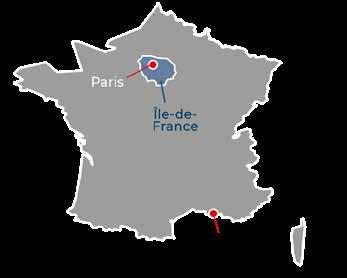
No. staff in 2022: 38 (FTE) » Expenditure in 2022: d6 million MSF first worked in the country: 1987 » msf.org/france
KEY MEDICAL FIGURES
5,400 outpatient consultations
2,020 individual mental health consultations
In France, Médecins Sans Frontières (MSF) runs a range of activities to assist refugees and migrants – in particular unaccompanied minors –affected by increasingly dissuasive EU policies.
In cooperation with other organisations, we continued to run a day centre in Pantin, a suburb of Paris, where we provide medical and psychological support, cultural mediation, and legal and social assistance to unaccompanied minors whose applications for protection had been turned down by the authorities.
We also advocated better access to healthcare, alerting local authorities to the consequences of precarious living conditions on children’s health. Our teams cared for an increasing number of vulnerable unaccompanied girls, some of whom were pregnant, who had been denied assistance by social services and left without any protection.
We continued to run mobile clinics in the suburbs of the capital to provide medical consultations, cultural mediation and social support to people living in unsafe conditions, including migrants and unaccompanied minors. These clinics worked as a medical and humanitarian surveillance tool in
Regions where MSF had projects in 2022
Cities, towns or villages where MSF worked in 2022
strengthen adherence to treatment, as they make seeking care easier and more affordable.
To curb the spread of HIV in Eswatini, which has the highest prevalence of the disease in the world, MSF offered health education and access to preventive measures, such as condoms and pre-exposure prophylaxis, to people who tested negative.
We also initiated a study to examine the burden of sexually transmitted infections (STIs) and the feasibility of providing STI care in the community in Eswatini. The study assessed the prevalence of asymptomatic and symptomatic STIs and involved continuous engagement with participants through interviews. The results will be disseminated at the end of 2023.
To address the rise in non-communicable diseases, a pilot programme was implemented for fixeddose combinations of two drugs in a single pill for hypertension treatment.
We have also been implementing environmentallyfriendly measures to minimise MSF’s carbon footprint, using solar panels to generate electricity in a remote clinic in Gege, and using hybrid energy vehicles for transport where possible.
Regions where MSF had projects in 2022
Cities, towns or villages where MSF worked in 2022
migrant camps, as they facilitated early detection of medical and humanitarian needs, to which we could alert the local health authorities.
During the winter, we assisted hundreds of unaccompanied minors who were sleeping on the streets. We also provided logistical and financial support to local organisations and agencies who assist minors who are homeless on a daily basis, by distributing tents and relief items, such as blankets and clothing, to help them cope with the cold.
Another mobile team provided support to unaccompanied minors living in state-provided accommodation, to ensure that they had access to legal information on their appeal procedure and to help with any follow-up.
In Marseille, we continued to offer multi-disciplinary support to unaccompanied minors with mental and physical vulnerabilities in our 20-bed shelter. We also ran outreach activities and offered logistical and financial support to local organisations working with people in vulnerable circumstances.
No. staff in 2022: 814 (FTE) » Expenditure in 2022: d23 million MSF first worked in the country: 1984 » msf.org/ethiopia
163,200 outpatient consultations
33,900 malaria cases treated
KEY
1,910 children admitted to inpatient feeding programmes
1,290 births assisted
Médecins Sans Frontières (MSF) resumed activities in Ethiopia’s Amhara, Gambella, Somali and Tigray regions in 2022, while continuing to work in Afar and Southern Nations, Nationalities and Peoples’ Region (SNNPR), providing healthcare in response to overlapping crises.

Despite the lifting of government restrictions, insecurity and administrative barriers continued to hamper humanitarian access to the estimated 20 million people in need of assistance across Ethiopia in 2022. 1 Although the two-year conflict in Tigray ended in November, thousands of people were killed or displaced by fighting across the country.
In March, we resumed healthcare services for South Sudanese refugees in Kule camp, Gambella region, and started to respond to malnutrition, cholera and measles in Somali region, an area badly affected by drought.
We also focused on malnutrition in Afar region, where we supported Dupti hospital, and ran mobile clinics and an inpatient centre providing care for malnutrition.
Throughout the year, our teams in SNNPR ran mobile clinics, and later, when conflict subsided, rehabilitated and supported health facilities.
In July, we reopened our project in Abdurafi, Amhara region, offering treatment for kala azar, a deadly tropical disease, and snakebites.
In northern and eastern Amhara, and northern Afar, we provided healthcare in conflict-affected
communities through mobile clinics. We also donated medical supplies and rehabilitated looted and damaged health facilities. People we met described immense suffering, recounting personal stories of extreme violence, loss of livelihoods, homes and lands, and constant fear.
In November, we restarted our response in northwestern Tigray, supporting two healthcare facilities and running mobile clinics in rural areas, where health facilities and water infrastructure had been damaged or destroyed.
On 24 June 2021, our colleagues María Hernández Matas, Tedros Gebremariam Gebremichael and Yohannes Halefom Reda were brutally and intentionally killed, while clearly identified as humanitarian workers, in Tigray. After extensive engagement with the Ethiopian authorities, we still do not have any credible answers regarding what happened to our colleagues. MSF will keep pursuing accountability for this incident, with the hope that this will help improve the safety of humanitarian workers in Ethiopia.
1 Reliefweb: https://response.reliefweb.int/ethiopia
No. staff in 2022: 210 (FTE) » Expenditure in 2022: d9 million MSF first worked in the country: 1991 » msf.org/greece
22,500 outpatient consultations
7,460 individual mental health consultations
820 people treated for sexual violence
45 survivors of torture treated
Throughout the year, Médecins Sans Frontières (MSF) staff witnessed the severe toll that precarious living conditions, arbitrary asylum procedures and fear of deportation was taking on people’s physical and mental health.
Our teams continue to work on Lesbos and Samos islands, and in Athens, providing general healthcare, treatment for chronic diseases, psychological and psychiatric support, and sexual and reproductive health services, with a focus on survivors of sexual violence. Social and legal assistance is also available in our projects.
On Samos, we run a day centre in Vathi town, supporting the medical needs of refugees, asylum seekers and other migrants. We also provided general healthcare through mobile clinics within the Samos Closed Controlled Access Centre (CCAC).
On Lesbos, MSF works in a clinic opposite the Mavrovouni CACC. During 2022, we offered emergency medical and psychological first aid to
No. staff in 2022: 73 (FTE) » Expenditure in 2022: d3.1 million MSF first worked in the country: 1984 » msf.org/guatemala
KEY MEDICAL FIGURES KEY MEDICAL FIGURES
8,210 outpatient consultations
1,140 individual mental health consultations
Since 2021, we have been focusing on our Mesoamerican nephropathy project1 to strengthen the response to non-traditional chronic kidney disease. According to data from the Ministry of Health, there are more than 10,000 patients undergoing renal function replacement treatment in Guatemala – a country with one of the highest death rates from chronic kidney failure in the Americas.
Our teams worked in three municipalities in Escuintla department, an area almost entirely given over to large-scale plantations. We provide early detection, treatment, mental health and social support, and palliative care. We also run health promotion and education activities to increase knowledge of the disease and promote prevention measures at community level.
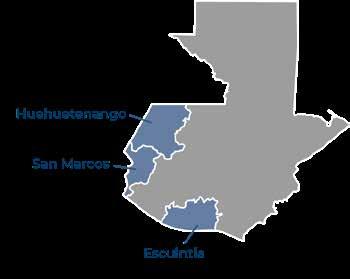
Guatemala is also a hotspot for migration flows in Central America. Thousands of people transit the country every day on their way north towards
new arrivals on the island, and organised referrals to hospital for those needing further care. This intervention enabled us not only to ensure people’s safe landing, but also to bear witness to their reception by the authorities.
In Athens, our day centre offers a range of healthcare and social and legal services for migrants excluded from the national health system. Social workers and cultural mediators help patients navigate the healthcare system and ensure their basic needs are met, while legal experts give advice on their human rights. Mobile clinics provide basic healthcare, sexual and reproductive health services and health promotion to people living in precarious conditions in the city, and in seven refugee camps in Attica region. For the first half of 2022, we ran a COVID-19 vaccination project, aiming to facilitate access to vaccinations for excluded migrants and refugees residing in these locations.
Read more: https://www.msf.org/closed-centresrefugees-greek-islands-exacerbate-psychological-trauma
Mexico and the US, or returning to their home countries after being deported.
In 2022, we sent two mobile teams to different sites in San Marcos and Huehuetenango departments, where we provided medical and psychological care, as well as health promotion and social support, to migrants.
At the end of the year, we started to offer these mobile services in Ciudad Tecún Umán, a city close to the border with Mexico, working at the bus station, the migrants’ shelter, and the centre for returnees. The project has a strong advocacy component, mainly targeting repressive US migration policies and calling for greater access to care, particularly mental health services, and protection from violence for migrants.
1 Mesoamerican nephropathy, sometimes also called chronic kidney disease (CKD) of unknown cause (CKDu) or CKD of nontraditional cause (CKDnT), refers to CKD that presents in young agricultural workers, primarily in Central America, in the absence of any clear etiology.
In Guatemala, Médecins Sans Frontières (MSF) continues to provide care for people with chronic kidney disease, and supports migrants transiting the country.
Restrictive EU and Greek migration policies continued to have a negative impact on the health and dignity of asylum seekers, refugees and migrants arriving in Greece in 2022.Regions where MSF had projects in 2022
No. staff in 2022: 1,686 (FTE) » Expenditure in 2022: d48.7 million MSF first worked in the country: 1991 » msf.org/haiti
45,500 emergency room consultations
5,780 people treated for intentional physical violence
2,600 people treated for sexual violence
In 2022, Médecins Sans Frontières (MSF) endeavoured to fill the massive gaps in healthcare in Haiti, a country wracked by escalating violence and a deadly resurgence of cholera.
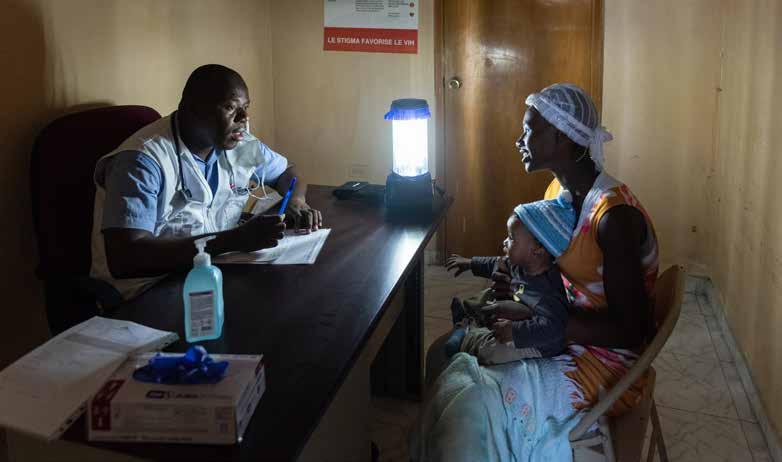
The already volatile situation deteriorated significantly in Haiti in 2022, as rival gangs waged a brutal war on the streets, paralysing and isolating the capital, Port-au-Prince, for extended periods of time. These unprecedented levels of violence led to a steep increase in the number of patients admitted to our hospitals during the year.
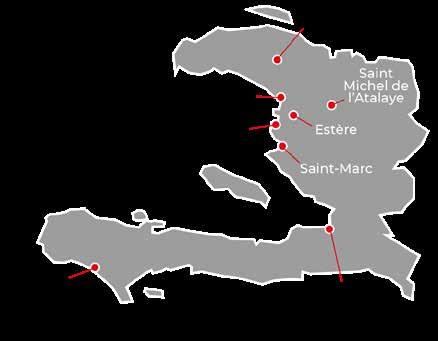
July was the worst month, with over 300 people killed and numerous cases of rape reported. Many houses were burnt down, and more than 20,000 people were displaced across the city. In these very challenging conditions, our teams worked to maintain and expand activities in our three trauma and emergency hospitals in Port-au-Prince. We treated victims of gunshot and stab wounds and victims of sexual violence, as well as people with severe burns and injuries related to road accidents.
Our hospital in Cité Soleil had to suspend activities in April after a patient was killed just outside the building. However, in July, we reopened the facility to respond to the large influx of wounded patients.
Following the announcement of an increase in fuel prices in September, violent protests broke out across the country. Barricades were erected, cutting off many of the main roads, and economic activity ground to a halt. The situation
was compounded when one of the major gangs blocked access to the country’s main oil terminal for more than a month, exacerbating fuel shortages and forcing healthcare facilities to close or reduce services, as they depend on generators to produce electricity.
Unrest also temporarily disrupted the water distribution network, reducing supply and creating ideal conditions for the resurgence of cholera. As the outbreak spread, the health situation soon became dire, as even basic services had become practically inaccessible due to the ongoing violence and the fuel crisis, which has continued long after access to the oil terminal was restored.
To alleviate these problems, our teams continue to deliver a range of medical services in the capital and other parts of the country, despite huge challenges in obtaining fuel and medical supplies and in referring patients between different facilities. As well as running and supporting hospitals and health centres, we operate mobile clinics in the most affected neighbourhoods of Port-au-Prince, such as Brooklyn, Bel’Air, Bas Delmas and Delmas 4. We are able to work in these hard-to-reach areas because MSF’s work is perceived positively and is respected by the communities.
Sexual and gender-based violence (SGBV) is a widespread issue in Haiti. The deepening socioeconomic crisis and high levels of gang-related warfare have had a considerable impact on the psyche of entire communities, who have become isolated and more exposed to the risk of sexual aggression. MSF runs two clinics, in Port-au-Prince and further north in Gonaïves, and supports three hospitals to provide victims of SGBV with specialist medical, psychological and social care. A free telephone helpline has decreased barriers to care, offering victims remote psychological support and referrals to health centres. Our mobile clinics working in unsafe, hard-to-reach neighbourhoods include SGBV care in their services.
The provision and accessibility of maternal healthcare is extremely limited in Haiti, contributing to one of the highest maternal death rates in the world. Our activities in the south of the country aim to respond to the pressing needs in this area. In 2022, we expanded our sexual and reproductive health activities at our clinic in Port-à-Piment, in Haiti’s southwest, starting to offer surgery for complicated obstetric cases, as well as ante- and neonatal care.
Overcrowded, unsanitary living conditions and poor access to clean water were factors in a major resurgence of cholera, a disease that has killed around 10,000 people since 2010, when the country was hit by an epidemic in the wake of a major earthquake.
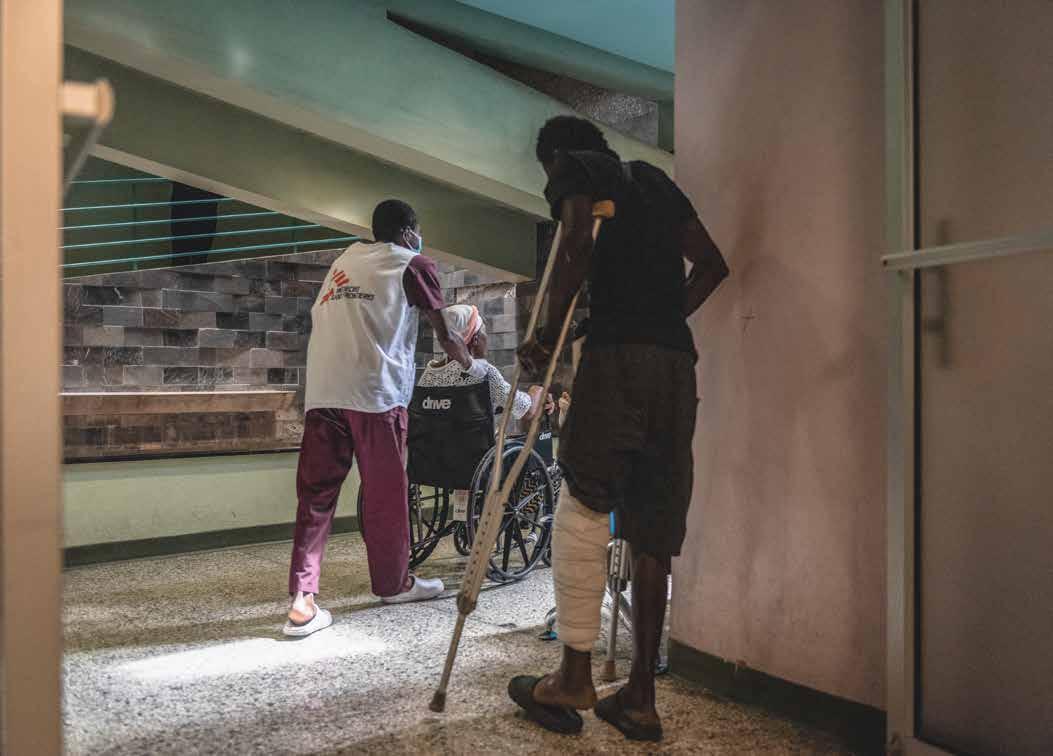
Following the arrival of the first suspected cases at MSF facilities in late September, we had admitted approximately 13,000 patients to our six cholera treatment centres (CTCs) in and around Portau-Prince by the end of the year. In addition, we treated around 2,500 patients in the four CTCs we opened in the department of Artibonite, north of the capital.
Our teams responded to the outbreak across the country, supporting local communities by chlorinating water points and raising awareness on hygiene measures in some of the worst-affected neighbourhoods. In December, we provided logistical support to the cholera vaccination campaign carried out by the Ministry of Health, to ensure that the highest number of people possible were immunised against the disease.
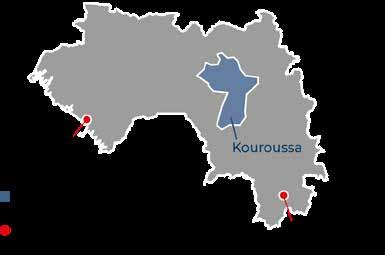
No. staff in 2022: 289 (FTE) » Expenditure in 2022: d9 million MSF first worked in the country: 1984 » msf.org/guinea
36,400 malaria cases treated
17,600 people treated for measles
14,400 people on first-line ARV treatment in MSF-supported programmes
In Guinea, Médecins Sans Frontières provides care for people living with HIV. In 2022, we also responded to outbreaks of Lassa fever and measles.
Although Guinea has a relatively low HIV prevalence of about 1.4 per cent, only slightly more than half of those living with HIV are receiving antiretroviral (ARV) treatment. In collaboration with the Ministry of Health, our teams manage eight health centres in the capital, Conakry, where we offer HIV testing and care, with a focus on prevention of mother-to-child transmission of the disease, as well as treatment for sexual violence and tuberculosis. We also manage a 31-bed facility at Donka hospital for people with advanced HIV.
In December, our community project in Kouroussa prefecture, in the east of the country, closed its
No. staff in 2022: 121 (FTE) » Expenditure in 2022: d4.1 million MSF first worked in the country: 1974 » msf.org/honduras
doors. For over five years, we had worked with communities to develop activities to tackle malaria, malnutrition and other diseases among children. As well as working in health centres, MSF trained and equipped health workers and volunteers who worked in the community, with the objective of improving the detection, treatment and referral systems for children with malaria and other diseases. We also responded to two outbreaks of Lassa fever and one outbreak of measles in 2022, providing access to care, while advocating for the World Health Organization and the Ministry of Health to initiate a vaccination campaign.
27,100 outpatient consultations
230 people treated for sexual violence KEY MEDICAL FIGURES
5,630 individual mental health consultations
The long-running Médecins Sans Frontières (MSF) programme in Honduras focuses on assisting victims of violence. In 2022, we also worked in migrant communities and responded to emergencies, including a dengue outbreak.
After many years of political and social instability, a new government took office in 2022, with the promise of resolving the country’s problems of violence and poverty. According to the UN Office on Drugs and Crime, Honduras has the highest murder rate in Central America, and is one of the most dangerous places for women in the world.
Throughout 2022, MSF worked with the Honduran Ministry of Health, offering emergency medical and psychosocial care to victims of violence, including sexual violence, in San Pedro Sula, Choloma and the capital, Tegucigalpa.
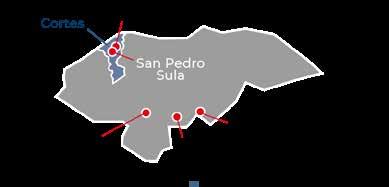
After 11 years of sustained advocacy efforts, the comprehensive care protocol for victims and survivors of sexual violence was approved in the country, including the use of emergency contraception pills, which had been banned since 2009.
We celebrated this important step towards highquality and comprehensive care for victims of sexual violence. However, significant challenges remain in
its implementation. We will therefore support the process, both technically and operationally.
In Choloma, we run mobile clinics providing family planning, ante- and postnatal consultations and mental health support in marginalised communities. In San Pedro Sula, we work to improve access to medical and psychological healthcare for sex workers and the LGBTQI+ community, offering family planning, cervical cancer screening, preexposure prophylaxis for HIV prevention, and human papillomavirus vaccinations.
In 2022, MSF also sent mobile teams to two points on the Nicaraguan border to assist migrants making their way north to Mexico and the US, offering medical and psychological care, as well as social support.
In addition, we responded to emergencies, including an outbreak of dengue in one of Tegucigalpa’s most densely populated neighbourhoods, and in the aftermath of storm Julia in San Pedro Sula, where our team carried out fumigations, provided mental health support, distributed hygiene kits and conducted health promotion activities.
No. staff in 2022: 735 (FTE) » Expenditure in 2022: d15.4 million MSF first worked in the country: 1999 » msf.org/india
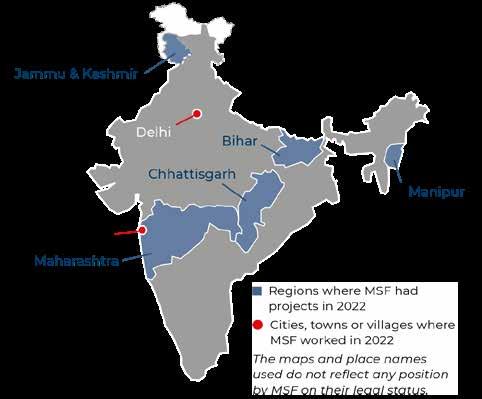
KEY MEDICAL FIGURES
24,600 individual mental health consultations
4,770 people treated for malaria
1,550 people started on treatment for TB, including 880 for MDR-TB
670 people treated for sexual violence
In the capital, New Delhi, we run a clinic for victims of sexual and gender-based violence, offering round-the-clock care. In December, we organised a national-level symposium calling for better access to medical and psychological care for victims.
Throughout the year, we provided mental health and psychosocial support to people affected by the conflict in Kashmir, and ran mobile clinics offering basic healthcare to communities in remote areas of Chhattisgarh.
In Mumbai, MSF’s clinic focuses on treating complex cases of DR-TB, including extensively drug-resistant forms of the disease, with innovative drug combinations. For children under five, we implement all-oral regimens, avoiding the need for painful injections.
We also work with the National Tuberculosis Elimination Programme and Municipal Corporation of Greater Mumbai to reduce the high TB incidence and death rates in the area. Our team co-manages a DR-TB centre in a public hospital, and we support diagnosis, treatment, counselling, health promotion and follow-up in general healthcare facilities.
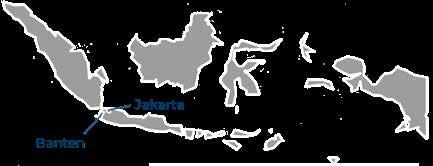
No. staff in 2022: 45 (FTE) » Expenditure in 2022: d1.2 million MSF first worked in the country: 1995 » msf.org/indonesia
KEY MEDICAL FIGURE
830 outpatient consultations
In Indonesia, we continued to assist with the national response to emergencies, including an earthquake in West Sumatra.
Since 2018, Médecins Sans Frontières (MSF) had been running programmes in Banten and the capital, Jakarta, focused on building local community links with health service providers and strengthening connections between health centres and local schools. The main goal was to improve the quality and access to healthcare for adolescents, offering health promotion and education sessions, as well as medical services.
As part of the project, we supported health centre staff to run adolescent-friendly health services, and strengthened their capacity through mentorship and training. We believe that providing high-quality health services for adolescents means involving them in a meaningful way, and we achieved this in Indonesia by implementing a peer-based approach.
At the end of 2022, we handed the project over to the local health centres and communities, and to the Ministry of Health.
In 2022, we also continued treating patients enrolled in the endTB clinical trial, with the aim of generating more evidence for shorter, more tolerable, injectionfree treatments for multidrug-resistant TB.
Our project in Manipur implements a person-centred care approach for people living with HIV, TB, DR-TB and hepatitis C. We transferred many of our stable HIV patients to Ministry of Health facilities, enabling us to focus on those with co-infections and complications. We also run a one-stop care centre offering comprehensive services for intravenous drug users. In one of India’s poorest states, Bihar, we provide both lifesaving and palliative care to patients living with advanced HIV.
Our toll-free telemedicine helpline supports diabetes patients to manage their condition. India has the second-highest burden of diabetes globally, and the prevention and management of the disease, as well as its associated complications, remain a huge challenge.
Between 2020 and 2022, MSF undertook capacitybuilding activities for health workers, health volunteers, communities and other organisations to respond to the COVID-19 pandemic. We also donated materials, including personal protective equipment and rapid antigen tests.
MSF’s COVID-19 activities ceased in March, due to a reduction in the number of cases and the expansion of vaccination coverage in Indonesia. We stand ready to respond if needed as part of the emergency preparedness plan.
On 25 February, when a 5.0-magnitude earthquake hit the West Pasaman district of West Sumatra, our teams provided psychological first aid training to health centre staff and psychological support to people affected by the disaster.
At the end of the year, we launched our E-hub project, which aims to build the emergency response capacity of our staff and other organisations. We will also collaborate with the Ministry of Health Crisis Centre, from set-up in the local disaster area to coordination at national level.
In India, Médecins Sans Frontières (MSF) continued to provide treatment for patients living with drug-resistant tuberculosis (DR-TB) and HIV.
No. staff in 2022: 108 (FTE) » Expenditure in 2022: d3 million MSF first worked in the country: 1990 » msf.org/iran
KEY MEDICAL FIGURES
49,900 outpatient consultations
7,760 individual mental health consultations
480 people started on treatment for hepatitis C
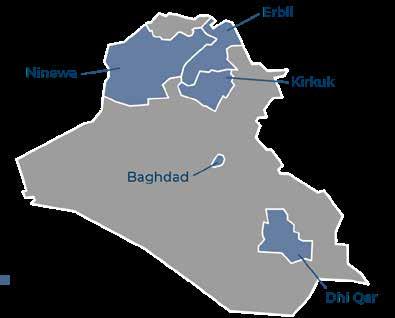
In Iran, Médecins Sans Frontières (MSF) runs programmes to assist Afghan refugees, drug users, sex workers, people who are homeless, and other marginalised groups who experience barriers when seeking healthcare.
These communities face a significant risk of contracting certain diseases, such as tuberculosis (TB), hepatitis C, HIV, and illnesses linked to poor living conditions, yet are unable to access services due to stigma and exclusion.
In 2022, MSF continued to provide comprehensive healthcare to these communities, especially for the growing number of Afghans who have arrived in the country. Officially, Iran hosts 800,000, but it is estimated that an additional 2.7 million Afghans are living there, mostly undocumented,1 with around one million having fled across the border since the Taliban takeover of Afghanistan in August 2021.
In South Tehran, we ran a range of medical services through a health facility located in the Darvazeh Ghar neighbourhood, as well as mobile clinics. Our teams offered general healthcare, nursing care, mental health support, screening and
No. staff in 2022: 885 (FTE) » Expenditure in 2022: d33.9 million MSF first worked in the country: 2003 » msf.org/iraq
KEY MEDICAL FIGURES
138,400 outpatient consultations
6,900 antenatal consultations
3,790 surgical interventions
1,270 postnatal consultations
Médecins Sans Frontières (MSF) continued to work across Iraq in 2022, filling gaps in healthcare exacerbated by war and conflict, and the COVID-19 pandemic.
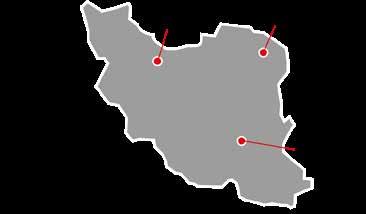
After years of conflict and instability, Iraq has started to see some signs of recovery, but its healthcare system is still far from being able to fulfil all the medical needs of people, especially in areas directly affected by the most recent war with the Islamic State group.
In 2022, MSF worked in 10 projects across Baghdad, Ninewa, Kirkuk, Erbil and Dhi Qar. We offered a wide range of general and specialist medical services and support to people living in areas affected by the war, returnees from long periods of displacement in camps or other regions of the country, and communities with poor access to healthcare. Services included emergency, maternal and neonatal care, specialist orthopaedic and maternity surgery, comprehensive post-operative rehabilitation and care, treatment for non-communicable diseases, and mental health support. We also provided medical supplies, technical training, and support for emergency preparedness and response in several health facilities across the country.
testing for COVID-19, and treatment and referral for hepatitis C and B, HIV, syphilis and TB. We also provided midwifery and ante- and postnatal care.
In Mashhad, Iran’s second largest city, located near the border with Afghanistan, we continued to offer medical consultations and screening for infectious diseases. We also provided counselling, social support, health education and referrals to specialist health facilities through our clinic in Golshahr district, where most of the Afghans in the city have settled. We provided treatment for hepatitis C to drug users in rehabilitation centres, and strengthened our mental health services by sending a psychologist to conduct consultations in Torbat-e Jam’s “guest city”, a government-run refugee settlement in Razavi Khorasan province.
In December, we launched new activities, including general healthcare and rehabilitation of facilities that we work in, through three healthcare centres in Kerman city, aimed at filling gaps in services for the estimated 400,000 newly arrived and unregistered Afghan refugees.
1 UNHCR: https://www.unhcr.org/ir/refugees-in-iran/
Patients requiring advanced surgical care were referred to MSF’s reconstructive surgery programme in Amman, Jordan, which has been conducting orthopaedic, plastic and maxillofacial surgery for patients from Iraq and other countries in the Middle East since 2006.
In Baghdad, we continued to collaborate with the National Tuberculosis Institute, working on switching drug-resistant TB patients from injections to newer, more effective oral drugs.
Our teams also assisted the Iraqi health authorities with the response to COVID-19. We provided intensive care treatment, patient isolation (for mild and moderate cases), and health promotion campaigns to encourage vaccination. In all our regular activities, we implemented strict infection prevention and control measures to protect patients and staff from catching or spreading COVID-19.
No. staff in 2022: 25 (FTE) » Expenditure in 2022: d2.8 million MSF first worked in the country: 1999 » msf.org/italy
4,500 outpatient consultations
84 victims of torture treated KEY MEDICAL FIGURES
1,890 individual mental health consultations
The southern region of Calabria and the islands of Sicily and Lampedusa are some of the main arrival points for the thousands of people who embark on the dangerous migration route across the Mediterranean Sea every year.
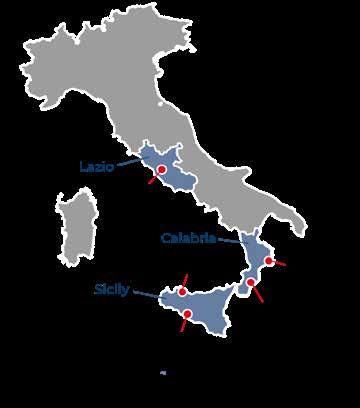
In Roccella Jonica, Calabria, we started providing medical and psychological support at landing sites, seeking to identify people with medical vulnerabilities so that we could ensure continuity of care for them.
Our teams working in Crotone and Agrigento focused on the identification of vulnerable people in reception facilities, organising referrals to local health services. We also offered psychological first aid to survivors of shipwrecks in the Mediterranean Sea at different landing sites across Sicily and Calabria.
In Palermo, we continued providing comprehensive care for migrants who experienced torture and intentional violence in Libya and during their migration route. The project has an interdisciplinary approach, offering medical, psychological, social and legal assistance to patients. In 2022, we housed
Regions where MSF had projects in 2022 Cities, towns or villages where MSF worked in 2022
a small group of migrants and asylum seekers, who had been evacuated from Libya on a humanitarian flight, in an MSF facility. In addition to housing them, we ensured the patients’ continuity of care through our clinic.
In Rome, in collaboration with the local health authorities, we ran a project focused on facilitating access to sexual and reproductive healthcare for migrant women living in marginalised neighbourhoods and informal settlements.
After the escalation of the war in Ukraine, we launched emergency interventions in Rome, Naples, Milan and Trieste, offering psychological support, as well as social and health assistance, for the large influx of Ukrainian refugees arriving in Italy.
MSF volunteers in Palermo, Turin and Udine set up helpdesks to orientate and support people needing access to healthcare, including migrants, asylum seekers and marginalised people.
No. staff in 2022: 241 (FTE) » Expenditure in 2022: d14.8 million MSF first worked in the country: 2006 » msf.org/jordan
34,500 outpatient consultations 950 surgical interventions 560 patients admitted to hospital KEY MEDICAL FIGURES
Our reconstructive surgery programme in the capital, Amman, was first established in 2006 to treat people injured in the Iraq War.
With a high level of medical expertise, surgical specialisation, extensive facilities and a holistic approach to care, the hospital is a regional base for the treatment of patients with significantly complicated injuries – primarily from Iraq, Syria, Yemen and Palestine – who could not be treated in their home countries.
villages where MSF
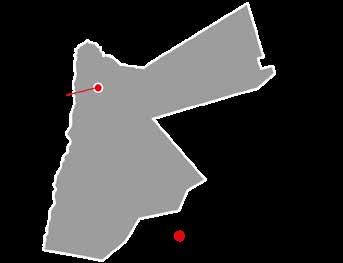
The programme provides life-changing reconstructive surgery and rehabilitative care for people with orthopaedic injuries, burns, gunshot wounds and other conflict-related injuries, as well as physiotherapy and mental health support.
In 2022, we returned to our usual level of admissions, following a short period in 2021 when we transformed a part of the hospital to assist with the Ministry of Health’s response to the COVID-19 pandemic.
During the year, we also focused on enhancing our regional network, to ensure patients’ continuity of care in their home countries after discharge from the hospital, through follow-up consultations and continued physiotherapy.
In Italy, Médecins Sans Frontières (MSF) focuses on addressing gaps in healthcare for the most vulnerable and marginalised people, especially migrants and people on the move.
In Jordan, Médecins Sans Frontières offers a comprehensive package of care to war-wounded patients requiring reconstructive surgery. Patients are referred to the hospital from across the Middle East.
No. staff in 2022: 784 (FTE) » Expenditure in 2022: d23.3 million MSF first worked in the country: 1987 » msf.org/kenya
3,460 births assisted, including 190 caesarean sections
3,420 people treated for sexual violence
3,290 individual mental health consultations
1,430 people on secondor further-line ARV treatment under direct MSF care
Médecins Sans Frontières (MSF) responded to multiple emergencies and public health challenges in Kenya in 2022, including disease outbreaks, urban violence, and the worst drought in 40 years.
During an outbreak of kala azar (visceral leishmaniasis) in Tharaka Nithi county early in the year, MSF supported the health authorities’ response by training staff, conducting awarenessraising activities and referrals, and distributing mosquito nets to mitigate the spread of the disease.
As the longest drought in Kenya in four decades intensified, we provided emergency care for children and lactating mothers with severe malnutrition in the northeast of the country. We also responded to an increase of refugees arriving in Dadaab, where they had come in search of food and water. Our teams offered basic and specialist healthcare and improved water and sanitation services in and around Dagahaley camp.
In August, our teams treated people injured during general elections-related violence in Nairobi and Homa Bay. As the year ended, we also responded to sporadic cholera outbreaks, setting up treatment centres and providing training, logistical support and health promotion, as well as patient care.
No. staff in 2022: 5 (FTE)
Expenditure in 2022: d0.6 million MSF first worked in the country: 2022 msf.org/kiribati
MEDICAL FIGURES KEY MEDICAL FIGURES
520 births assisted
87 antenatal consultations
Médecins Sans Frontières (MSF) is working in Kiribati for the first time, running a project to improve access to healthcare in a country highly vulnerable to the effects of climate change.
Kiribati is a low-lying island nation in the Pacific Ocean, which is already experiencing the consequences of rising sea levels, including flooding, contamination of water sources and a lack of arable land. These factors have a direct impact on the health of the people of Kiribati; for example, insufficient availability of high-quality fresh food is contributing to high rates of obesity and diabetes. Furthermore, providing equitable access to healthcare is challenging, since the country’s islands are scattered across a vast swathe of the Pacific.
MSF initiated activities in Kiribati in March 2022, in response to a request from the Ministry of Health for support, as the country reopened its borders after the COVID-19 pandemic. Throughout the year, our teams worked to strengthen critical care capacity, by
Throughout the year, we continued to increase access to healthcare for marginalised youth and adolescents. In Mombasa, we supported the provision of comprehensive, youth-friendly medical services in health facilities and communities.
In response to chronic urban violence in Eastlands, a suburb of Nairobi, we offered emergency and sexual and reproductive healthcare at our youth-friendly clinic, and in four sexual violence clinics integrated in public facilities. We also ran an emergency call centre and ambulance services in Eastlands.
In Kiambu county, we expanded access to opioid substitution therapy, comprehensive healthcare and psychosocial support for people who use heroin through a one-stop clinic and two other facilities.
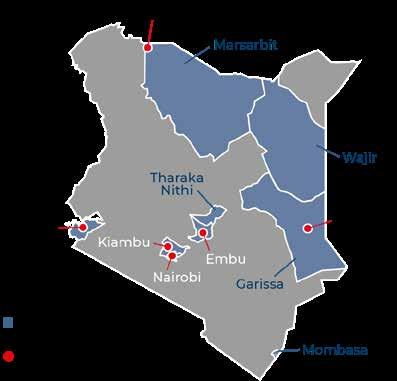
In Homa Bay, we supported the county referral hospital’s adult medical wards by providing staff, treatment and follow-up, and scaled up treatment for non-communicable diseases in local health facilities. Meanwhile, we handed over our paediatric, adolescent and advanced HIV treatment activities to local partners.
providing training to key healthcare workers and supplying critical care equipment.
The project has now refined its focus to support maternal and neonatal health on the main island of Tarawa, as well as on the remote Southern Gilbert Islands. Our aim is to reduce the high rates of illness and death among mothers and newborn babies. Our team works with local healthcare staff to improve the management of non-communicable diseases, particularly diabetes, during pregnancy, and provide training and clinical support during labour and delivery. We also train midwives, nurses and doctors in the universal Helping Babies Breathe programme, which focuses on enhancing neonatal resuscitation and newborn care skills.
In addition, MSF is helping to upgrade the infrastructure at Tabiteuea North hospital, implementing a sustainable approach when possible; for example, by using renewable energy and improving water supply and waste management.
No. staff in 2022: 94 (FTE) » Expenditure in 2022: d3.4 million MSF first worked in the country: 1996 » msf.org/kyrgyzstan
2,410 screenings for breast cancer
1,830 consultations for contraceptive services
1,250 screenings for cervical cancer
180 individual mental health consultations
In 2022, Médecins Sans Frontières (MSF) focused on cervical and breast cancer screening in Kyrgyzstan, as well as assisting people affected by conflict along the disputed border with Tajikistan. Although Kyrgyzstan is among the countries with the highest prevalence of cervical and breast cancer, the lack of a national screening programme means that patients are often diagnosed at a late stage of the disease and consequently have limited treatment options.
In June 2022, in partnership with the Ministry of Health, we launched a women’s health project in Sokuluk district, close to the capital, Bishkek, where we aim to decentralise cancer prevention by integrating screening services into general healthcare facilities. Our team has trained nurses and midwives to carry out tasks such as visual cervical inspection and breast examination. During the year, we called on the health authorities to replicate this model of care in other parts of the country.
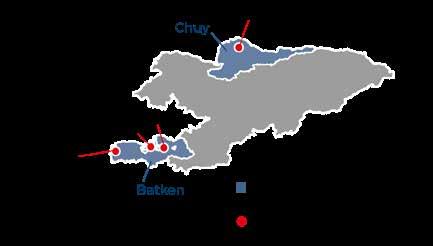
No. staff in 2022: 676 (FTE) » Expenditure in 2022: d25.6 million MSF first worked in the country: 1976 » msf.org/lebanon
165,100 outpatient consultations
44,700 routine vaccinations
10,600 individual mental health consultations
3,620 births assisted
Since 2019, Lebanon’s multi-layered crisis has pushed more than 80 per cent of its population into poverty. Médecins Sans Frontières is supporting the national health system to address the immense unmet medical needs.
The highly privatised healthcare system in Lebanon is a major barrier to ensuring accessible, affordable and high-quality medical services for all. In the past three years, it has become increasingly difficult to obtain healthcare, as more people have seen their income plummet, forcing them to rely on deteriorating public services and medical humanitarian organisations for medical assistance.
In 2022, we continued to adapt our long-term activities to cover the needs of Lebanese people, as well as refugees and migrants, who often have limited access to medical care. Lebanon is home to an estimated 1.5 million refugees, mainly Syrians and Palestinians, many of whom live in precarious conditions in displacement camps. The country also hosts around 250,000 migrant workers. Our services include reproductive healthcare, mental health support, paediatrics, surgery, wound care, treatment for chronic diseases, and routine vaccinations for children. In 2022, we also provided
In September, the conflict along the disputed border between Kyrgyzstan and Tajikistan escalated again. There were hundreds of casualties, and thousands of people fled from the villages close to the border. MSF teams in Batken responded by providing essential medical care and psychosocial counselling to displaced people. We also donated medical supplies, and conducted training on managing masscasualty incidents in hospitals.
In 2022, MSF completed a set of environmental health studies in former mining communities in Kadamjay district, in Batken, which revealed chronic exposure to heavy metals, such as arsenic and antimony. To mitigate exposure, our teams launched health promotion activities, and remediated contaminated soil in a sports stadium and two school yards. In addition, we advocated the implementation of public health measures to prevent and treat the effects of heavy metal pollution.
treatment for children in Bar Elias living with thalassaemia, an inherited blood disorder that affects the production of haemoglobin.
We also responded to emergencies, including the first cholera outbreak in Lebanon for almost three decades. As thousands of cases were recorded, we opened two cholera treatment units in Bar Elias and Arsal, and several oral rehydration points in Tripoli, Beirut, Bar Elias and Arsal. To curb the spread of the disease, we ran awareness-raising and infection prevention campaigns, and distributed hygiene kits, containing items such as soap and detergent. Our teams also supported the national vaccination campaign by conducting door-to-door cholera vaccinations in the north and northeast of the country.
We are constantly increasing our support to the Lebanese health system, by training staff and donating medicines and medical supplies, and building the capacity of health facilities across the country. Strengthening and enhancing the capacity of healthcare providers at local and national levels remains a priority.
No. staff in 2022: 258 (FTE) » Expenditure in 2022: d6 million MSF first worked in the country: 1990 » msf.org/liberia
2,660 children admitted to hospital
2,090 people received care for mental health disorders or epilepsy
In Liberia, Médecins Sans Frontières (MSF) runs a mental health and epilepsy programme and supports paediatric care in a Ministry of Health facility in the capital, Monrovia.
We opened our paediatric hospital – Barnesville Junction – in Monrovia in 2015, in the immediate aftermath of the Ebola epidemic. Barnesville Junction was an entirely MSF-run facility, separate from the public health system. From its inception, the intention was to support the Liberian Ministry of Health for a period of five years, to enable it to rebuild its capacity in paediatrics following the devastation caused by the Ebola epidemic.
With this timeframe now at an end, we closed Barnesville Junction and switched our focus to supporting Barnesville healthcare centre, a public health facility, where we provide inpatient paediatric care and staff supervision and training. Elsewhere in Montserrado county, we continued to run a programme we set up in 2017 to respond
No. staff in 2022: 222 (FTE) » Expenditure in 2022: d11.5 million MSF first worked in the country: 2011 » msf.org/libya
MEDICAL FIGURES
49,900 outpatient consultations
4,070 individual mental health consultations
340 people started on treatment for TB
In Libya, Médecins Sans Frontières (MSF) continued to provide essential healthcare for migrants, refugees, asylum seekers and other people in vulnerable circumstances. We also increased our support for tuberculosis (TB) services.
By the end of 2022, there were more than 650,000 migrants in Libya, 1 with 3,489 estimated to be in detention centres managed by the Department for Combating Irregular Migration,2 and between 2,000 and 5,000 in non-official centres scattered across the country.
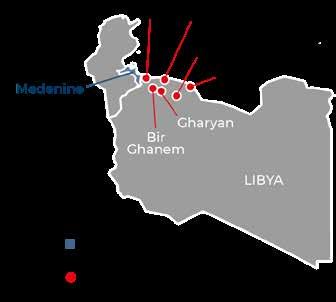
MSF continued to hear accounts from migrants who were subjected to multiple forms of ill treatment, such as physical abuse and sexual and gender-based violence. In addition, migrants reported arbitrary arrests and detention in inhumane conditions, kidnapping, forced labour, human trafficking and family separation.
Our teams provided basic healthcare, mental health support, and sexual and reproductive health consultations in health facilities inside detention centres and in urban settings. We referred patients to hospitals for specialised care. We also offered protection services, aiming to identify people with
in 2022
to the lack of consultations, diagnosis, treatment and medication for people with mental health and neurological disorders, such as epilepsy, in the country. People with these conditions often face social stigma that can lead to exclusion from schools or jobs.
In 2022, we expanded our cohort of patients through five health facilities and community-based care. We treated all our patients on an outpatient basis, making hospital referrals when necessary. We also coordinated psychosocial workers and health volunteers to work with patients’ families and communities to address social stigma.
Additionally, we responded to measles outbreaks in five counties (Montserrado, Margibi, Sinoe, Nimba and Bomi), providing treatment for children at Barnesville Junction, and supporting the Ministry of Health with measles kits for the treatment of measles cases across the five counties.
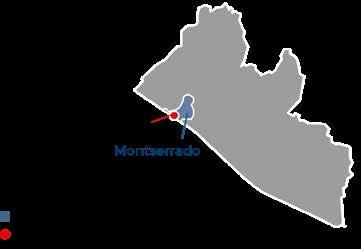
vulnerabilities and to refer them to other organisations in Tripoli who could meet their specific needs.
During the year, the Libyan coastguard intercepted at least 24,684 individuals attempting to cross the Mediterranean Sea and forcibly returned them to Libya. 3 At disembarkation points across the west of the country, our teams offered basic medical services, psychological first aid, emergency referrals and follow-up care. We also distributed food and hygiene kits. After November, we were unable to continue these activities, as permission was withdrawn by the authorities. However, our teams remain ready to respond in case of emergencies.
TB is another focus of our activities in Libya. In 2022, we supported the national TB programme and also assisted with the establishment of the first isolation unit for the management of multidrugresistant TB (MDR-TB) in Misrata chest hospital.
1 UNHCR
2 Official data from the UNHCR https://data.unhcr.org/en/ documents/details/97911
3 IOM: https://twitter.com/i/status/1625054971774267392
No. staff in 2022: 8 (FTE) » Expenditure in 2022: d1.1 million MSF first worked in Latvia: 2022 » msf.org/latvia MSF first worked in Lithuania: 2021 » msf.org/lithuania
890 individual mental health consultations
From the beginning of 2022, Médecins Sans Frontières (MSF) started to provide medical and mental health care to migrants and asylum seekers held in detention centres across Latvia and Lithuania.
MSF started offering medical and humanitarian support in Lithuania in September 2021, with the aim of offering medical and humanitarian support to migrants and asylum seekers crossing into the country from Belarus. Initially, our teams provided mental health care at nine border posts, where migrants and asylum seekers – from countries including Iraq, Cameroon, Nigeria and Afghanistan –were detained in dire conditions.
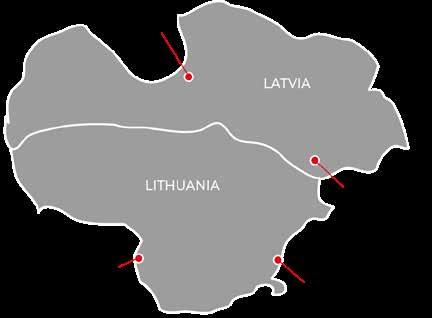
In January 2022, our teams started to conduct basic medical and mental health consultations for people who had been transferred to Foreigners’ Registration Centres (FRCs) in Kybartai and Medininkai. Many were experiencing distress related to detention and limited freedom of movement, as well as uncertainty about their future and the asylum process.
On 6 May, we suspended activities in the two FRCs, as conditions imposed on MSF by the Lithuanian State Border Guard Service created an environment that would have compromised medical ethics and humanitarian principles, and ultimately the quality of care.
No. staff in 2022: 130 (FTE) » Expenditure in 2022: d6.2 million MSF first worked in the country: 1987 » msf.org/madagascar
19,700 outpatient consultations
9,640 people received food distributions for one month
3,330 admissions of children to outpatient feeding programmes
In early 2022, Médecins Sans Frontières launched an emergency response when Madagascar was struck by two devastating cyclones.
The island of Madagascar regularly experiences extreme weather events. A few months prior to cyclones Batsirai and Emnati, people in the southern part of the country were suffering from the effects of a severe drought, which caused exceptionally high levels of malnutrition. Between the end of January and the beginning of March, the island was hit by five tropical storms and cyclones, with Cyclone Batsirai causing severe damage.
In the aftermath of the cyclones, our emergency teams began providing medical consultations in the remote coastal districts of Nosy Varika and Mananjary, running mobile clinics by boat to reach communities that had been cut off from healthcare. We also helped to reconstruct two hospitals and five health centres that had been badly damaged.
In Ikongo district, the cyclones destroyed around 80 per cent of the crops, exacerbating the dire food security situation in the area, as people who were
We then offered remote psychological support to detained people who asked us for assistance, and ran informal group sessions outside the FRCs for people who had limited freedom of movement. By December, however, continuous pushbacks at the border meant that fewer people were able to enter the country and the FRCs were nearly empty. This significantly limited MSF’s ability to reach those in need. From July to December, MSF assisted migrants and asylum seekers held in the Mucenieki and Daugavpils immigration detention centres in neighbouring Latvia. In addition to psychological and psychosocial support, our teams provided hygiene kits, food, items such as books, board games and stationery, and some financial aid. Since our teams were not granted unrestricted access to patients, it was difficult to deliver care that ensured medical confidentiality and compliance with medical ethics, and we therefore closed our activities in Lithuania and Latvia in December.
Regions where MSF had projects in 2022
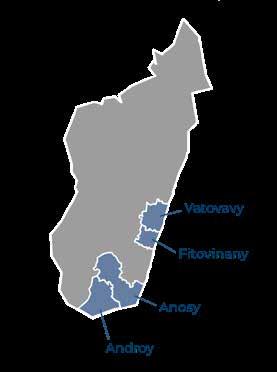
already vulnerable lost their main source of income. Following an assessment in December, our teams started offering medical care and nutrition support to people with moderate and severe malnutrition.
In Androy and Anosy regions, we ended our malnutrition care activities in June after observing improvements linked with increased assistance from other NGOs and better rainfall and harvests. In Ambovombe district, we continued to work on improving access to clean water by drilling deep boreholes. We are also working with local people to rehabilitate existing water pumps with locallysourced spare parts, and training technicians to repair them independently.
No. staff in 2022: 432 (FTE) » Expenditure in 2022: d9.8 million MSF first worked in the country: 1986 » msf.org/malawi
54,200 outpatient consultations
2,030 people treated for cholera
460 surgical interventions
In 2022, Médecins Sans Frontières (MSF) worked alongside the Ministry of Health in Malawi to respond to several emergencies, including one of the worst cholera outbreaks in the country’s history.
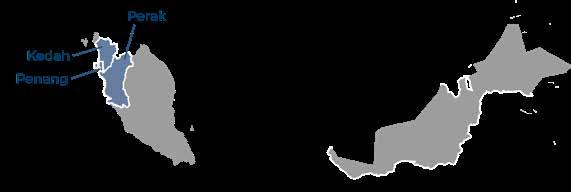
In January, after tropical storm Ana hit Malawi, MSF worked with the health ministry to reopen health centres to provide care for people who had been affected. Shortly afterwards, the country experienced a widespread cholera outbreak. From March onwards, our teams set up cholera treatment units in Mangochi and Blantyre districts, where we treated patients with severe and moderate symptoms. We also trained local healthcare workers, conducted health promotion sessions and epidemiological surveillance activities, and supported the local authorities to run an oral cholera vaccination campaign.
The mortality rates of cervical cancer in Malawi are among the highest in the world. Our teams, in collaboration with the Malawian health authorities, implement a comprehensive approach to the disease, aiming to improve access to prevention, screening, diagnosis and treatment. Our treatment activities are based at Queen Elizabeth Central hospital in
No. staff in 2022: 75 (FTE) » Expenditure in 2022: d3.6 million MSF first worked in the country: 2004 » msf.org/malaysia
MEDICAL FIGURES
16,700 outpatient consultations
3,900 antenatal consultations
1,730 individual mental health consultations
In Malaysia, Médecins Sans Frontières (MSF) provides medical and humanitarian support for Rohingya refugees, who face multiple barriers in accessing healthcare and protection in the country.
More than 3,500 Rohingya refugees attempted to make perilous boat journeys across the Andaman Sea and the Bay of Bengal in 2022.1 For many, Malaysia was the preferred destination.
The Malaysian government continued its deterrencebased approaches to the Rohingya, such as immigration raids and arrests, detention, cyberbullying, discrimination and deportation, aimed at making conditions hostile for them and presenting their presence as a national security threat, instead of a regional humanitarian crisis. In response, MSF has been implementing a communitybased, person-centred approach to ensure refugees have access to healthcare and protection.
Working in urban refugee settings and immigration detention centres, and through fixed and mobile clinics in Penang, we provide general healthcare and mental health support. We also refer patients with special medical and protection needs for registration with UNHCR. In 2022, the most pressing needs were related to antenatal
Blantyre, and we have screening units integrated in health centres in several districts of Southern region. Activities cover all stages of the disease, from prevention of human papillomavirus infection with health promotion and vaccination, to pre-cancerous and high-grade lesions, progression into invasive and metastatic cancer, and end-of-life care. As radiotherapy is not yet available in the country, we have started sending some patients to Nairobi.
In Chiradzulu district, we continued to offer a comprehensive package of care to children, teenagers and some adults living with HIV. This includes counselling, peer support, individual psychosocial support, and sexual and reproductive healthcare, in addition to antiretroviral treatment.
In 2022, we began supporting two community-based organisations who provide services for sex workers. Our teams supported with HIV testing, treatment and access to preventive measures for the disease.
care and treatment for non-communicable diseases. Hepatitis C incidence was also high; when we started testing and treatment activities in August, we found approximately 10 per cent of people were positive.
In January, in collaboration with the Ministry of Health and partner NGOs, we started running mobile clinics targeting women and children, where we offer vaccinations, antenatal classes and family planning services. These clinics have also become a valuable entry point for the identification and referral of sexual and gender-based violence (SGBV) survivors. Most SGBV is related to child marriage.
In the five immigration detention centres where we work, including the Rohingya-only centres in Sungai Bakap and Bidor, we provide essential hygiene items, such as soap and sanitary pads, as well as medical and mental health care. We also organise referrals to local public healthcare clinics for people in need of followup and specialised care. Negotiations for continued access remained challenging at the end of 2022.
1 https://www.unhcr.org/news/unhcr-seeks-comprehensiveregional-response-address-rise-deadly-south-east-asia-seajourneys#:~:text=More%20than%203%2C500%20desperate%20 Rohingya,700%20people%20made%20similar%20journeys
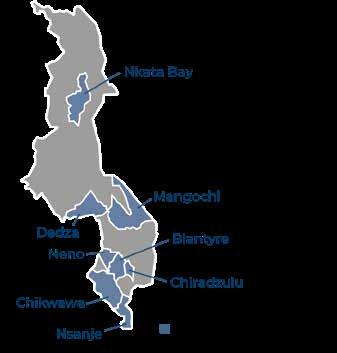
No. staff in 2022: 1,403 (FTE) » Expenditure in 2022: d30.5 million MSF first worked in the country: 1992 » msf.org/mali
KEY MEDICAL FIGURES
552,800 outpatient consultations
68,000 patients admitted to hospital
1,830 surgical interventions
900 people treated for intentional physical violence
The humanitarian situation deteriorated in Mali in 2022, as clashes between armed groups and military forces intensified, causing new waves of displacement.
Médecins Sans Frontières ran a wide range of services in Mali, responding to the needs of people injured or displaced by violence, and working to improve the availability of healthcare in Ansongo, Douentza, Ténenkou, Koutiala, Koro, Kidal, Timbuktu, Niafounké and Niono. Activities included general, paediatric and women’s healthcare, nutrition support and emergency surgery.
As well as supporting health centres and hospitals, we aim to make healthcare more accessible by expanding community-based activities. In 2022, we built two community-based health centres in Niono and scaled up our support in Nampala, where we focus on the provision of medical and malnutrition care, and mental health support for victims of violence, pregnant women and children under 15 years old.
In Ténenkou district, as insecurity issues prevented our teams from running mobile clinics, we relied on
Cities, towns or villages where MSF worked in 2022
33 community-based health workers to maintain basic healthcare in the district. When malaria transmission was at its peak in the rainy season, 82 MSF-trained community health workers provided testing and treatment for the disease.
In Gourma, Timbuktu region, we also launched community-based activities, including treatment for malaria and malnutrition for people who otherwise would have no access to healthcare, mainly due to insecurity and the distance they would have to travel.
In Koutiala district, we continued to run our large paediatric and nutrition programme. In 2022, we also implemented a new mobile application called Antibiogo, to help facilitate the diagnosis of antibiotic resistance and enable doctors to prescribe the most adequate antibiotics. In the capital, Bamako, we continued to support the Ministry of Health to tackle breast and cervical cancers by facilitating access to screening, diagnosis and treatment.
No. staff in 2022: 215 (FTE) » Expenditure in 2022: d9.4 million MSF first worked in the country: 1985 » msf.org/mexico
KEY MEDICAL FIGURES
67,700 outpatient consultations
8,800 individual mental health consultations
5,300 consultations for contraceptive services
90 victims of torture treated
Médecins Sans
Through mobile clinics, we delivered medical and mental health services in Tenosique, Coatzacoalcos, Tapachula, Palenque, Piedras Negras, Reynosa, Matamoros and Nuevo Laredo, as well as in the capital, Mexico City, prioritising assistance to unaccompanied minors, women travelling alone, and victims of direct violence.
In August, in response to an influx of thousands of migrants at Mexico’s southern border, the immigration authorities started to issue transit permits in the small town of San Pedro Tapanatepec, Oaxaca. In October, Mexico and the US agreed that Venezuelans entering the US irregularly would be deported to Mexico under Title 42.1 This decision prompted immediate expulsions at the northern border.
As a result, the authorities in San Pedro Tapanatepec halted the issuance of permits, even though thousands of people of different nationalities, including children, continued to arrive at the border, where they remained stranded without access to shelter, medical services, or adequate water and sanitation facilities. Within a
Regions where MSF had projects in 2022
Cities, towns or villages where MSF worked in 2022
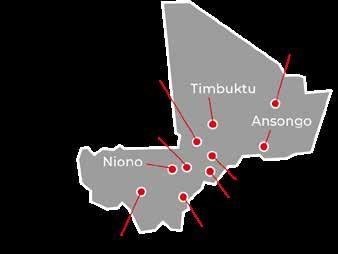
few days, we mobilised an emergency team to provide assistance to over 20,000 people.
In Reynosa and Matamoros, more than 5,000 people were stranded in informal camps, with limited access to drinking water, health services and protection. Our teams adapted activities according to their changing needs, distributing items such as blankets, warm clothing and thermal sleeping mats, as well as food. In our comprehensive care centre in Mexico City, we provided a complete package of care for survivors of extreme violence and torture, including medical treatment, mental health, and social support.
MSF teams composed of doctors, psychologists, community educators and social workers also offered support in the Mexican Commission for Refugee Assistance building, as well as in the northern bus terminal and six shelters in the city.
1 A public health order that has been misused during the COVID-19 pandemic to effectively close the US southern border to asylum seekers. Title 42 has resulted in more than two million expulsions in under three years.
No. staff in 2022: 660 (FTE) » Expenditure in 2022: d24.2 million MSF first worked in the country: 1984 » msf.org/mozambique
MEDICAL FIGURES
307,100 outpatient consultations
3,900 individual mental health consultations
2,170 people with advanced HIV under direct MSF care
In Mozambique, Médecins Sans Frontières (MSF) responded to the massive humanitarian needs in Cabo Delgado province in 2022, providing healthcare to people affected by escalating violence.
By the end of 2022, over one million people were internally displaced1 in Cabo Delgado due to fighting between non-state armed groups and government forces, in a conflict that has been running since 2017.
From June, as the violence moved southwards, thousands of families were displaced within days.2 Simultaneously, thousands of others opted to return to their homes, despite the lack of services and destruction caused by the conflict.
Since 2019, we have been responding to the increasing needs of displaced and host communities in the province, particularly in areas that receive little or no assistance. Our activities include general healthcare, mental health and psychosocial support, distribution of relief items, health promotion, and water, hygiene and sanitation services.
In 2022, we worked in Macomia, Mocimboa da Praia, Palma and Mueda districts, and sent mobile teams to Meluco, Muidumbe and Nangade, to provide healthcare
No. staff in 2022: 1,340 (FTE) » Expenditure in 2022: d16.5 million MSF first worked in the country: 1992 » msf.org/myanmar
MEDICAL FIGURES
190,700 outpatient consultations
7,760 people on first-line ARV treatment under direct MSF care
2,470 individual mental health consultations
33 people started on treatment for MDR-TB
Médecins Sans Frontières (MSF) works to fill gaps in healthcare in Myanmar, where ongoing conflict has disrupted public services and driven over 1.2 million people from their homes.
In 2022, public health services continued to deteriorate after thousands of doctors and nurses left their jobs to join the civil disobedience movement. Meanwhile, growing insecurity and administrative barriers hampered humanitarian access, further limiting the availability of healthcare.
In response to the drastic reduction in tuberculosis (TB) services across Myanmar, MSF scaled up activities at Aung San TB hospital in the country’s largest city, Yangon, where 50 per cent of the country’s patients with drug-resistant TB go to receive treatment. As well as providing hands-on care, we helped to detect new cases through community outreach activities.
In mid-2022, we resumed the handover of some of our HIV patients to the Ministry of Health. In 2015, we had begun working with the ministry to transfer
Regions where MSF had projects in 2022
Cities, towns or villages where MSF worked in 2022
and distribute relief items. Meanwhile, we handed over our activities in Metuge to the Ministry of Health.
In Beira, Sofala province, we run a sexual and reproductive healthcare programme that includes safe abortion care, HIV testing, and treatment for sexual and gender-based violence for stigmatised groups, such as sex workers and men who have sex with men. We also support the implementation of national guidelines on HIV treatment for these groups of people, and provide care for advanced HIV at Beira central hospital and 10 health centres. In 2022, we helped to rehabilitate health centres damaged in tropical storm Chalane and cyclone Eloise. In Nampula, MSF started to work with the Ministry of Health to improve preventive and curative care for vector-borne and neglected tropical diseases, and surveillance and preparedness for emergencies such as cholera outbreaks and natural disasters.
1 Reliefweb - https://reliefweb.int/report/mozambique/unhcrmozambique-cabo-delgado-update-internal-displacementresponse-december-2022-enpt
2 OCHA Situation Report – Displacement influx in Cabo Delgado and Nampula, Mozambique, 1 June to 21 July 2022
Regions where MSF had projects in 2022
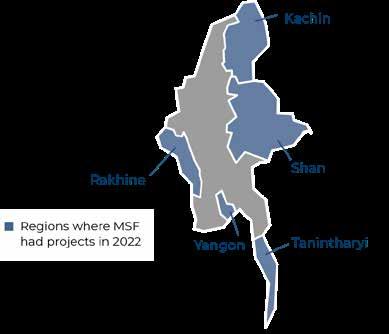
patients to the national AIDS programme. This was postponed when the military seized power in 2021. In early 2022, as COVID-19 cases declined, we closed the three dedicated centres that we had set up in Yangon, Hpakant and Myitkyina.
Following an escalation in conflict in Rakhine state in August, the military imposed restrictions on movements of people and goods, including medications. This meant that we were unable to run our mobile clinics for four months, which further curtailed access to healthcare for people living in vulnerable circumstances. Only emergency referrals were allowed during this period. In December, we resumed services in some locations; however, not at full scale.
In Kachin and Shan states, we responded to people fleeing violence by providing medical assistance and distributing relief items such as hygiene and cooking kits.
No. staff in 2022: 1,474 (FTE) » Expenditure in 2022: d42.6 million MSF first worked in the country: 1985 » msf.org/niger
KEY MEDICAL FIGURES
1,262,800 outpatient consultations
611,500 malaria cases treated
139,500 people admitted to hospital, including 113,200 children aged under five
36,900 children admitted to outpatient feeding programmes for severe acute malnutrition
In 2022, our teams carried out mass vaccination campaigns, distributed drinking water and relief items, such as hygiene and cooking kits, constructed shelters, and ran mobile clinics for displaced people in Diffa and Tillabéri regions.
In the second half of the year, Niger was hit by devastating floods, which affected hundreds of thousands of people. As well as running mobile clinics and distributing relief items to displaced people, we helped boost bed capacity in Niamey regional hospital.
We also supported the health authorities’ responses to outbreaks of measles and meningitis in Zinder, Diffa and Tahoua regions. During the peak malaria period, due to the exceptionally high number of patients requiring inpatient care in Magaria, we constructed two observation rooms in Tinkim and Yékoua health centres.
In Madarounfa district, we provide care for children with sickle cell disease, which includes vaccinations, antibiotics to prevent and treat infections, pain
No. staff in 2022: 367 (FTE) » Expenditure in 2022: d20.1 million MSF first worked in the country: 1989 » msf.org/palestine
Cities, towns or villages where MSF worked in 2022
medications and blood transfusions. In 2022, to better prevent and manage severe complications of the disease, we introduced treatment with hydroxyurea, a drug listed by the World Health Organization as essential for haemoglobin diseases in children but still difficult to access in Niger. In addition, we offered medical and nutrition care to children with malnutrition, malaria and other childhood diseases in Madarounfa hospital and five health areas in Maradi. As a result of our partnership with the health authorities and the World Food Programme, dedicated to treating children with moderate acute malnutrition, the number of hospital admissions for malnutrition was the lowest in four years.
The two-way flow of migrants over the Niger-Algeria border continued unabated in 2022. Thousands were deported by the Algerian authorities and stranded in the desert. MSF denounced the inhumane treatment of migrants expelled from Algeria and Libya, and called on authorities to take immediate measures to respect human dignity in border control.
137,000 outpatient consultations
2,870 surgical interventions KEY MEDICAL FIGURES
Our teams continue to run specialised medical services in the Gaza Strip, where the overstretched healthcare system has been seriously affected by the 15-year Israeli blockade.
Working in three hospitals and several outpatient clinics, we offer comprehensive care for people suffering from burns and trauma, which includes surgery, physiotherapy, psychological support, occupational therapy and health education. Since 2018, we have also been running a reconstructive surgery programme in northern Gaza. In addition to these activities, our teams support laboratories to identify and treat antibiotic-resistant infections, and provide training and psychological support for local healthcare workers. In the West Bank, occupation-related violence, economic decline, unemployment and poverty continue to take a toll on the health of Palestinians. In Hebron, we offer psychological support, psychotherapy and psychiatric services to people affected by violence. We also support the community emergency response plan, supporting community health centres that treat victims of sudden outbursts of violence, empowering communities to respond to their own health needs. In Jenin, MSF is working with the Ministry of Health in Jenin hospital to
Regions where MSF had projects in 2022
Cities, towns or villages where MSF worked in 2022
The maps and place names used do not reflect any position by MSF on their legal status.
strengthen emergency response mechanisms due to the deteriorating security situation.
In Nablus, Qalqilya and Tubas, we conduct individual, group and family psychotherapy sessions to assist people with mental health disorders. We are also helping to build staff capacity by running an internship programme for psychologists in collaboration with the Palestinian Union of Social Workers and Psychologists in the West Bank. Meanwhile, our teams continue to provide basic healthcare through our clinics in an area known as “H2”, in the heart of Hebron old city, and in Masafer Yatta, in the southern Hebron Hills, as well as emergency psychological support and emergency relief kits to Palestinians who have experienced violent incidents, such as home demolitions. These kits include mattresses, heaters, cooking pots and utensils. In 2022, we also helped Palestinian medical staff to treat the victims of outbursts of violence in Jerusalem and provided training for emergency preparedness in the West Bank.
Médecins Sans Frontières (MSF) runs a range of projects in Niger to address the significant medical needs caused by conflicts, displacement, food insecurity, child malnutrition and epidemics.
In Palestine, Médecins Sans Frontières provides medical and psychological assistance to people affected by the long-term conflict.
No. staff in 2022: 2,830 (FTE) » Expenditure in 2022: d91 million MSF first worked in the country: 1996 » msf.org/nigeria
945,500 outpatient consultations
348,100 malaria cases treated
185,400 admissions of children to outpatient feeding programmes
116,800 people admitted to hospital
36,900 children admitted to inpatient feeding programmes
25,000 births assisted
23,100 children treated for measles
12,200 individual mental health consultations
3,800 people treated for cholera
In Nigeria’s Northeast and Northwest regions, a combination of factors, including escalating violence, displacement, high food prices, climate change, and epidemics, have contributed to a severe health and malnutrition crisis.
In 2022, in response to this alarming situation, Médecins Sans Frontières (MSF) expanded activities, working in 32 outpatient therapeutic feeding centres and 10 inpatient therapeutic feeding centres across Kano, Katsina, Kebbi, Sokoto and Zamfara states in Northwest region.
In Northeast region, during the summer (AprilOctober), the number of children with malnutrition registered at our project in Maiduguri, Borno state, was much higher than we had anticipated, forcing us to triple our bed capacity and adjust our intervention to cater for a full-scale emergency.
We also responded to malnutrition in other states, such as Bauchi, launching an emergency intervention in Toro.
In northeast Nigeria, particularly in Borno state, people have endured more than a decade of armed conflict between the government and non-
state armed groups. Around one million people remain displaced across the state. In 2022, the authorities continued to close displacement camps in the state’s capital, Maiduguri, with only three remaining in and around the city by the end of the year. Most displaced people now live in host communities and in informal settlements.
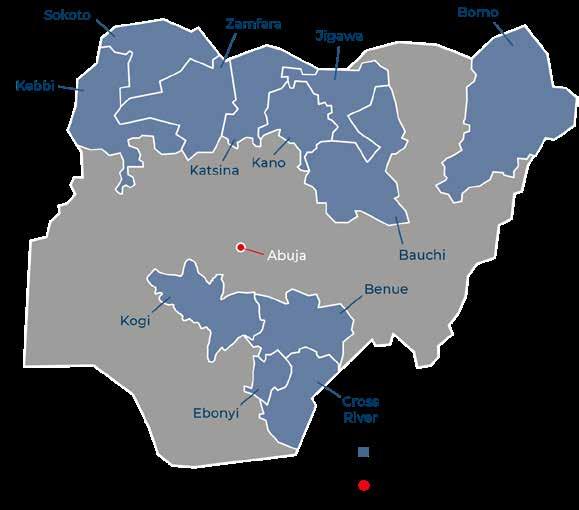
Our teams continued to provide lifesaving specialist healthcare to children under 15 years old in Gwange paediatric hospital, the only facility offering paediatric inpatient services free of charge in the area.
MSF suspended activities in Gamboru/Ngala and Rann in May, and in December took the difficult decision to close the project due to the unacceptably high risks faced by our teams.
The levels of violence against people in Nigeria’s Northwest region significantly increased during 2022, with armed groups frequently killing, looting and kidnapping for ransom, and causing more than a million people to flee their homes. Due to the insecurity, in Anka, Zamfara, we had to scale down our 130-bed hospital to 40 beds. Nevertheless, we continued to provide medical care in the town, for both local residents and displaced people. We also worked in two hospitals and 10 general health facilities in Shinkafi and Zurmi, responding to the consequences of this violence.
Intercommunal clashes between herders and farmers led to further waves of displacement in Benue state. In 2022, more than 443,0001 people were living in dire conditions in informal camps, with limited access to healthcare, food, water and sanitation. To address the immense needs, we supported victims of the violence at our general healthcare clinics in Mbawa and Ortese camps. In three other camps, we ran community-based general healthcare services.
Hannatu Bello and her twin daughters make their way out of MSF’s outpatient therapeutic feeding centre in Bagudo, Kebbi. Nigeria, July 2022. © KC Nwakalor
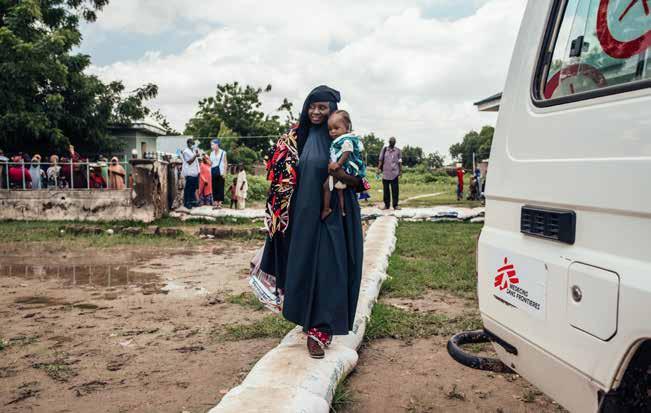
In Nigeria, we assist people affected by violence and displacement, and respond to multiple health issues, such as severe malnutrition and recurrent disease outbreaks.© George Osodi
Another alarming consequence of the violence in some parts of the country has been the increase in the number of victims of sexual violence, including in Ortese camp, Benue, where we escalated our response to assist the high number of women reaching our facilities. In Zamfara, we also offer outpatient consultations for victims of sexual and gender-based violence.
Our teams run the maternity and neonatal departments of Jahun general hospital, in Jigawa state, and a clinic dedicated to treating women affected by obstetric fistula, a condition caused by damage to the birth canal during prolonged or obstructed labour. We also support basic obstetrics in four health centres to reduce complications during pregnancy.
In Kano state, we continue to support two general healthcare centres and a clinic to cater for maternal and child health. Meanwhile, in our newly-opened project in Cross River, we started supporting two outpatient facilities, general healthcare services, basic emergency obstetric and neonatal care, and referral systems for emergency and lifesaving care. Training is a key element in our activities in this state. In 2022, we ran training courses for health staff on Lassa fever, nutrition, laboratory skills, and water and sanitation.
In Sokoto, we support treatment for noma, a neglected disease that mainly affects young children. It starts with an infection of the gums that goes on to destroy the bone and tissue of the cheek and nose. If left untreated, noma kills up to 90 per cent of those affected within weeks. Those who survive are left with severe disfigurement. Our team provides reconstructive surgery, physiotherapy, nutrition and mental health
support, and conducts outreach activities for the early detection of cases. Our teams also run an international advocacy campaign, calling for noma to be included in the WHO Neglected Tropical Diseases list in 2023.
In 2022, MSF emergency teams worked alongside the Ministry of Health to bring the cholera outbreaks in Borno, Kano, Bauchi and Cross River states under control. Our support included treating infected people, supporting oral rehydration points, launching vaccination and health promotion campaigns, and improving water and sanitation services.
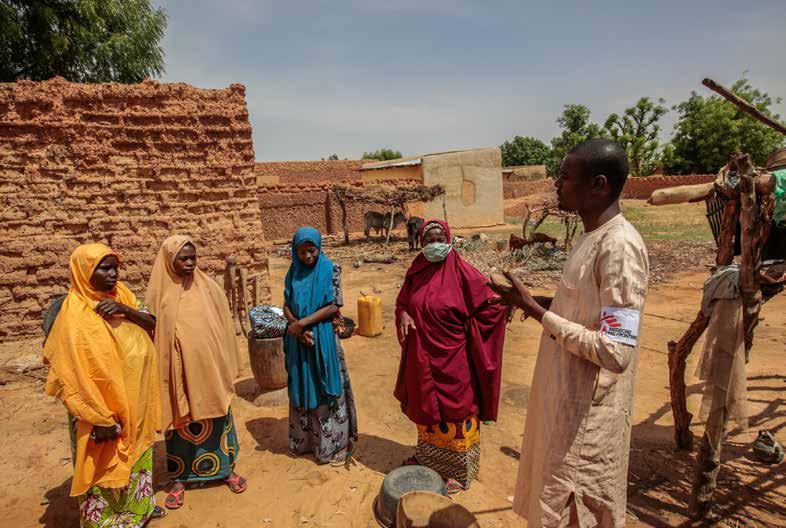
In Ebonyi state, Lassa fever – an acute haemorrhagic illness – is endemic. In Abakaliki, at the Alex Ekwueme Federal Teaching Hospital, we reinforce medical capacity to tackle the disease through the training of medical workers (for early detection and referral of cases) and case management during the peak season. We also run community outreach activities to sensitise people on Lassa fever symptoms, transmission and mitigation of the risks, as well as to tackle the stigma surrounding the illness.
MSF remains prepared to respond to medical emergencies or disease outbreaks in Nigeria. In 2022, our emergency teams launched interventions in Zamfara, Katsina, Bauchi, Borno, Kano and Ebonyi states to respond to various urgent needs, including malnutrition, Lassa fever and cholera. In Kogi state, we provided safe drinking water, donations of medicines, and technical training on healthcare management and water purification for the medical staff.
1 https://dtm.iom.int/reports/nigeria-north-centraland-north-west-mobility-tracking-round-10-idp-atlasoctober-2022
No. staff in 2022: 13 (FTE) » Expenditure in 2022: d1.5 million MSF first worked in the country: 2021 » msf.org/panama
KEY MEDICAL FIGURES
43,100 outpatient consultations
2,600 individual mental health consultations
180 people treated for sexual violence
In 2022, Médecins Sans Frontières provided healthcare to migrants crossing the Darién Gap, a remote area of jungle on the border between Colombia and Panama.
The number of migrants travelling through the Darién Gap increased dramatically during the year, with nearly a quarter of a million people recorded to have made the crossing. Despite attempts to obtain permission to work at the arrival points on the Panamanian side of the border in 2022, our teams were only permitted to assist people at San Vicente and Lajas Blancas migrant reception centres – where migrants are transferred by the authorities after having crossed the Darién Gap. This delay can be problematic, especially for cases of sexual violence, as it’s crucial for patients to receive medical care as soon as possible to ensure proper emergency treatment.
The vast majority of those who crossed the Darién Gap in 2022 were Venezuelans, who decided to leave other Latin American countries where they had settled and move north towards Mexico and the US, in the hope of finding safety and better
opportunities. Many people made the perilous journey with their families, including elderly relatives, young children and pregnant women. Depending on the route, crossing the Darién jungle can take up to 10 days, and is extremely dangerous. The terrain is treacherous: there are steep cliffs, and the rivers are subject to flash floods. We have heard many accounts of people who have died by drowning, or in falls. Migrants are also vulnerable to attacks by criminal gangs who ambush them in the jungle.
Our teams worked with the Ministry of Health to offer medical care and mental health support to the many victims of violence and sexual violence, including children. Many victims of sexual violence have no access to medical care within the critical 72 hours needed to ensure effective treatment. Throughout the year, we continued to publicly advocate the need to open safe migration routes, and called on governments in the region to take measures to protect people on the move.
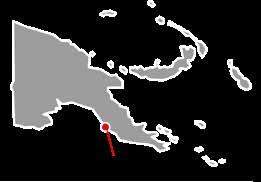
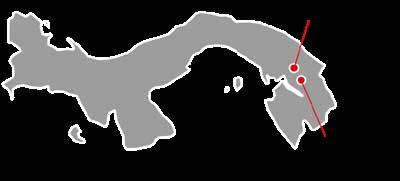
No. staff in 2022: 106 (FTE) » Expenditure in 2022: d3.1 million MSF first worked in the country: 1992 » msf.org/papua-new-guinea
KEY MEDICAL FIGURES
12,900 outpatient consultations
1,190 people started on treatment for TB, including 65 for MDR-TB
In Papua New Guinea, Médecins Sans Frontières (MSF) continues to focus on strengthening the prevention, screening, diagnosis and treatment of tuberculosis (TB), a leading cause of death in the country.
In 2022, our teams continued to collaborate with the national TB programme at Gerehu hospital in the capital, Port Moresby, providing care to patients with drug-sensitive TB (DS-TB) and harder to cure, drug-resistant forms of the disease (DR-TB). In April, we finished the construction of a new clinic in Six Mile, in the northeast of the city, dedicated to the care of DR-TB patients.
In addition, our outreach team carried out home visits for patients who had difficulty accessing our clinics or adhering to treatment.
In order to reduce the prevalence rate of TB in Port Moresby, which is one of the highest in the world, we conducted community-based case-finding
activities to improve early detection. We also gave health talks to provide knowledge about the disease and to explain the importance of adherence to treatment, in areas of the city considered to be at high risk – especially low-income and densely populated neighbourhoods with poor sanitation. Our teams also offered preventive TB treatment to close contacts of confirmed DS-TB patients.
For patients with multidrug-resistant TB (MDR-TB), we continued to implement all-oral medication regimens, which lead to overall better treatment adherence, as they remove the need for painful daily injections and have fewer severe side effects.
MSF is always seeking ways to reduce the number of patients interrupting their treatment by facilitating the process, for example by supporting them to take their medication autonomously or assisted by a family member at home.
No. staff in 2022: 7 (FTE) » Expenditure in 2022: d2 million MSF first worked in the country: 1985 » msf.org/peru
KEY MEDICAL FIGURES
18,400 outpatient consultations
860 individual mental health consultations
Since late 2021, Médecins Sans Frontières teams in Peru have been focusing on providing care for migrants arriving in the country after perilous journeys from Venezuela and other Latin American countries.
Poverty and political instability have driven millions of Venezuelans to leave their country and seek refuge in other Latin American countries, especially after the crisis intensified in 2014. Their already dire situation has been compounded these past few years by the disruption to health systems and society brought about by the COVID-19 pandemic.
Peru is the second-largest host country for Venezuelans; an estimated 1.5 million migrants, asylum seekers and refugees had settled there by the end of 2022, after a 3,000-kilometre journey. Over a third of them have an irregular administrative status in the country, and consequently have limited access to medical care.
Many people arrive in Peru exhausted and dehydrated. Some have been subjected to violence, including sexual violence, and robbed by armed groups or gangsters,
No. staff in 2022: 90 (FTE) » Expenditure in 2022: d3.7 million MSF first worked in the country: 1984 » msf.org/philippines
17,900 outpatient consultations KEY MEDICAL FIGURE
Médecins Sans Frontières (MSF) continued to respond to the high prevalence of tuberculosis (TB) cases in the Philippines, where it kills an estimated three people every hour.1
In 2021, to curb the spread of the disease and reduce the incidence rate – currently the fourth highest in the world – MSF started activities in the capital, Manila. In 2022, we launched new activities with a mobile X-ray truck in the district of Tondo, one of the capital’s most densely populated and impoverished areas, where people are most susceptible to TB infection. In collaboration with the Manila Health Department, our teams provided health promotion to encourage people to undergo chest X-ray examination. Patients are then referred to local health centres for treatment. Our teams also conduct home visits immediately after the diagnosis to screen households’ close contacts, administer TB skin tests, and offer preventive TB treatment to children. Early diagnosis and treatment are some of the most effective ways to prevent the spread of TB.
In Marawi, in the southern part of the Philippines, we continued to assist people displaced and affected by the armed confrontation between government forces and pro-Islamic State group militants in 2017, by providing
Cities, towns or villages where MSF worked in 2022
during an arduous journey across several borders which can take weeks or even months. Even after they have been in Peru for some time, many people continue to live in precarious, unhygienic conditions, exposed to multiple health issues.
Throughout 2022, our fixed and mobile clinics offered medical and psychological assistance for migrants in the northern border town of Tumbes, often their first port of entry in the country, and in the capital, Lima, where many end up staying. Our services included general, sexual and reproductive healthcare, mental health support, emergency referrals to hospitals, and treatment for chronic diseases. We also made these services available to Peruvians living in vulnerable circumstances.
Regions where MSF had projects in 2022 Cities, towns or villages where MSF worked in 2022
general and mental health care, as well as treatment for non-communicable diseases. In December, with the acute and post-emergency phases of our medical response over, we closed the project and handed over activities to local health organisations.
Following the devastation caused in December 2021 by Super Typhoon Rai (locally known as Odette), which affected central and southern Philippines and displaced around 333,000 people, MSF carried out an emergency response in the island-province of Dinagat and on outlying islands of Surigao City. Lasting until mid-March, the intervention focused on supporting health facilities with additional staff, running mobile clinics offering mental health and psychosocial support in isolated areas, facilitating referrals of critical patients, distributing hygiene items and safe water, and donating essential medical materials.
1 Department of Health 2019 Philippines TB joint program review, https://ntp.doh.gov.ph/download/joint-programreview-2019-epidemiological-review/
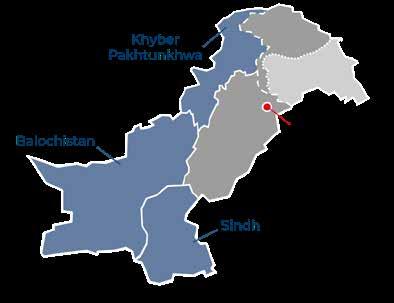
No. staff in 2022: 1,304 (FTE) » Expenditure in 2022: d25.7 million MSF first worked in the country: 1986 » msf.org/pakistan
KEY MEDICAL FIGURES
74,005,000 litres of chlorinated water distributed
39,300 malaria cases treated
20,800 families received relief items
19,100 births assisted
6,730 people treated for cutaneous leishmaniasis
3,420 children admitted to outpatient feeding programmes for moderate acute malnutrition
1,690 people started on hepatitis C treatment
Unprecedented monsoon rains, which started in June, caused extensive destruction across the country, leaving more than one-third of it under water. In one of the worst flooding disasters in Pakistan’s history, millions of people were forced to leave their villages and spend months living in camps, often without shelter or access to basic needs such as clean drinking water.
People lost their livestock, food stores were destroyed and land was damaged, making it unfit for the next planting season. All this has had an impact on food security, and our teams reported very concerning numbers of malnutrition and malaria cases in east Balochistan and Sindh.
In Sindh, our emergency teams ran six mobile clinics which visited over 24 different locations per week in Dadu, Sanghar, Jacobabad, Sukkur and Shahdadkot districts. Most patients presented with skin diseases, malaria, respiratory tract infections, malnutrition and diarrhoea. In the makeshift ‘tent city’ set up in Keamari district, Karachi, to accommodate people displaced by floods, MSF teams provided more than 800 tents, as well as shower points and latrines.
Regions where MSF had projects in 2022 Cities, towns or villages where MSF worked in 2022 The maps and place names used do not reflect any position by MSF on their legal status.
In eastern Balochistan, our teams ran outpatient general health services for people affected by the floods in Naseerabad, Sohbatpur, Jaffarabad, Usta Muhammad and Jhal Magsi districts, treating more than 1,000 patients a day.
Areas of stagnant water were a major contributor to the rise in the number of people with waterand vector-borne diseases. In October, our water and sanitation teams installed a water filtration plant, with a capacity of 270,000 litres per day, in Jaffarabad district. The clean drinking water was delivered by trucks to flood-affected villages and displaced-person camps in eastern Balochistan and in Dadu, Sindh, helping to mitigate the risk of waterborne disease caused by contaminated water.
In Khyber Pakhtunkhwa province, MSF installed water filtration systems, and cleaned and decontaminated 800 wells in flood-affected villages in Charsadda district. The aim was to rehabilitate 1,500 wells by March 2023.
MSF also conducted outpatient general healthcare consultations in the province in the early stage of the emergency, and distributed essential items, such as hygiene and cooking kits, to thousands of families in Charsadda and Nowshera, and in DI Khan district.
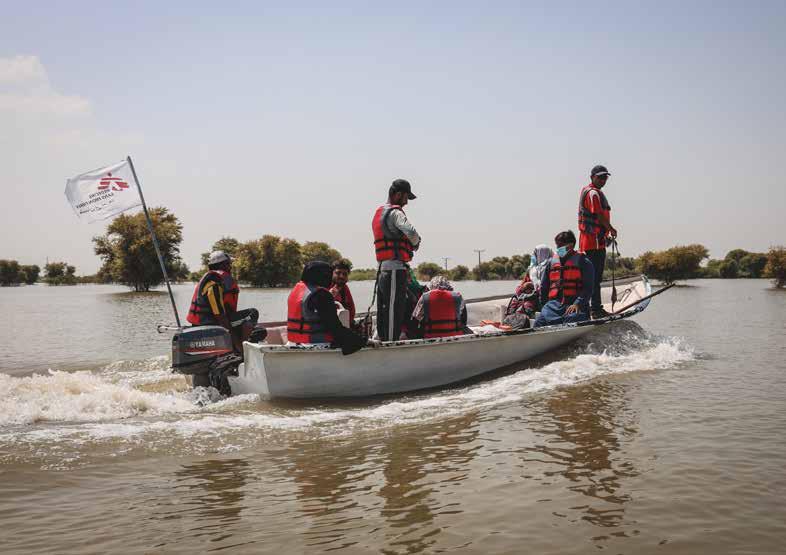
When Pakistan was hit by catastrophic flooding in mid-2022, Médecins Sans Frontières (MSF) launched emergency activities to assist some of the millions affected, while continuing to run most regular projects.An MSF emergency response team travels by boat to reach a village in Johi town that has been cut off by the floods. Pakistan, September 2022 © Zahra Shoukat/MSF
Overall, our teams in Balochistan, Sindh and Khyber Pakhtunkhwa provided millions of litres of clean drinking water, and distributed tens of thousands of relief packages, including tents, cooking kits, hygiene items and mosquito nets, to people affected by the floods.
Despite some interruption caused by the flooding, we managed to maintain most of our activities throughout the year, including our reproductive, neonatal and paediatric care services at five different locations in Balochistan and Khyber Pakhtunkhwa provinces.
We strengthened our support to DHQ hospital in Dera Murad Jamali, Balochistan, by sending additional medical and non-medical experts, and increasing bed capacity from 40 to 69 to address increased needs linked to the floods.
In addition, we assisted local communities, Afghan refugees and people in border areas by running emergency obstetric services and nutrition programmes, and ensuring the management and referral of critical trauma patients. We also continued to operate our cutaneous leishmaniasis programme in Balochistan and Khyber
Pakhtunkhwa provinces, and started a project to address cutaneous leishmaniasis in Dadu, Sindh province.
In Karachi, Sindh province, we continued to run a hepatitis C project in the informal settlement of Machar Colony and support COVID-19 vaccination activities, focusing particularly on undocumented people.
In Gujranwala, Punjab province, we diagnosed and treated people with multidrug-resistant tuberculosis, implementing a decentralised approach that enabled patients to receive care nearer their homes.
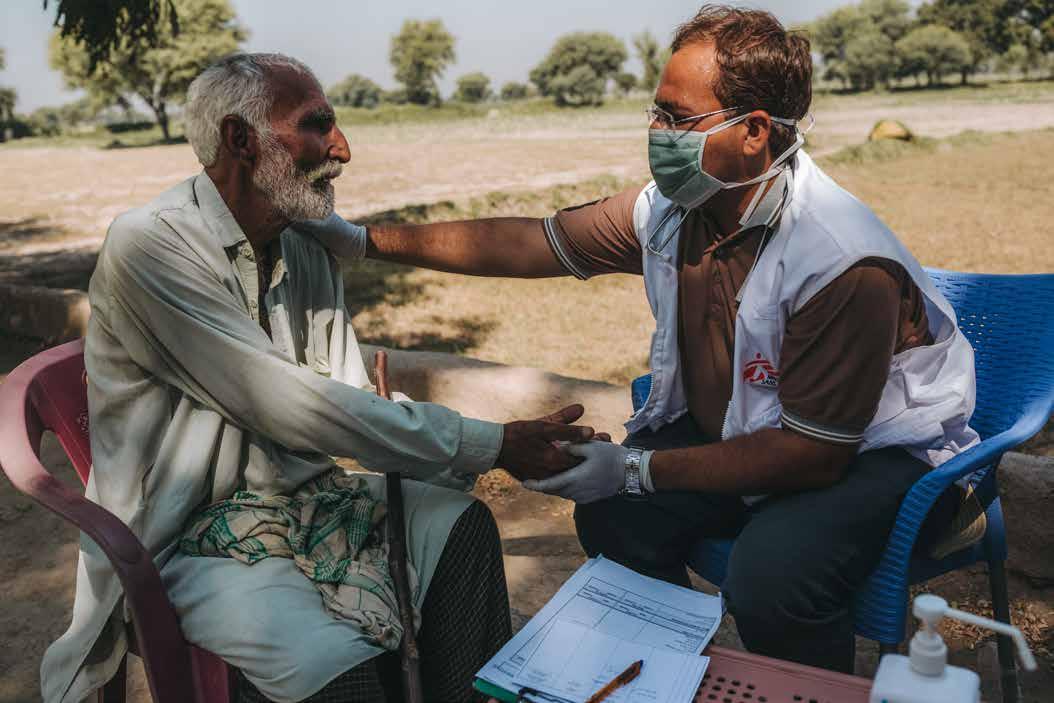
In November, we ran training sessions for key female medical officers, health workers and community midwives from Khyber Pakhtunkhwa on the correct use of oxytocin and other labourinducing drugs.
At the end of 2022, after 11 years, MSF’s comprehensive emergency obstetric and neonatal care hospital in Peshawar closed. The project was opened to address the needs of neglected communities in the area, such as Afghan refugees and internally displaced people, and provided freeof-charge care. During the life of the project, we assisted over 54,400 deliveries.
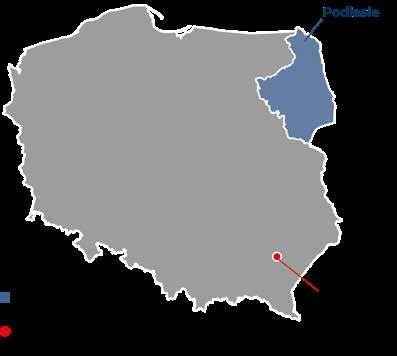
No. staff in 2022: 11 (FTE) » Expenditure in 2022: d1.1 million MSF first worked in the country: 2021 » msf.org/poland
In 2022, Médecins Sans Frontières (MSF) started to support a new drug-resistant tuberculosis (DR-TB) programme in Poland. We also assisted migrants and refugees stranded at the border with Belarus.
In February, in response to the escalation of the war in Ukraine, we opened a logistics centre in Poland, through which we supply our medical humanitarian operations in Ukraine, and organise transit for our teams entering and leaving the warstruck country.
Since July, we have been supporting a pilot DRTB treatment programme run by the Ministry of Health, coordinated by the Institute of Tuberculosis and Lung Diseases in Warsaw and supported by

No. staff in 2022: 42 (FTE) Expenditure in 2022: d4 million MSF first worked in the country: 1992 msf.org/russia
In Russia, Médecins Sans Frontières provides treatment for people with drug-resistant tuberculosis (DR-TB) and HIV. In 2022, we also responded to the needs of people displaced by the conflict in Ukraine.
In Arkhangelsk and Vladimir, we continued to collaborate with the local health authorities and Northern State Medical University, implementing a nine-month DR-TB treatment course. The medication is all oral, which means patients do not have to have painful injections, and it is easier to tolerate. In the near future, we plan to start enrolling patients on an even shorter course – just six months – that has recently been recommended by the World Health Organization.
In Moscow and St Petersburg, in cooperation with two community-based NGOs, we provided treatment for patients living with HIV, and medical consultations
the World Health Organization (WHO). The programme is designed to provide a new outpatient model of care for DR-TB in Poland. In addition, we donated essential medicines to enable health facilities to implement the latest WHO treatment recommendations.
Our teams also provide continuity of treatment for Ukrainian refugees with TB by linking them to medical facilities and offering psychological and social support.
In November, our teams returned to Podlasie region, near the border with Belarus, to respond to the basic medical needs of migrants and refugees. We continue to carry out these activities in close cooperation with other organisations and civil society groups.
Regions where MSF had projects in 2022 Cities, towns or villages where MSF worked in 2022
for people with little access to healthcare, including those who had crossed into Russia due to the conflict in Ukraine. We also supported our partner NGO in Moscow to run a mobile clinic serving people living in vulnerable circumstances, offering medical and social assistance.
In 2022, we started to support people who had arrived in Voronezh, Belgorod and Rostov regions in southern Russia, after fleeing from the conflict in Ukraine. Through regional NGOs, we organised a team of local doctors, psychologists and social workers to ensure that they received the necessary medical care in authorised medical institutions. MSF also covered gaps in healthcare and offered financial support to pay for medications and medical consultations when needed. In addition, we donated urgently needed items, such as food, hygiene kits and essential household items, to local organisations, which supported more than 20,000 newly arrived people.
Cities, towns or villages where MSF worked in 2022
No. staff in 2022: 17 (FTE) » Expenditure in 2022: d8.9 million MSF started search and rescue: 2015 » msf.org/mediterranean-migration
Libya
57 people treated for sexual violence KEY MEDICAL FIGURES
3,850 people rescued at sea
2,940 outpatient consultations
In 2022, Médecins Sans Frontières (MSF) continued search and rescue activities to assist people attempting the perilous central Mediterranean Sea crossing, despite increasing operational and political challenges.
After each rescue, we provided medical and psychological assistance to survivors, many of whom were suffering from hypothermia, fuel burns and seasickness. We also treated skin conditions and general body pains, often a result of the dire living conditions and violence people experienced in Libya. Many survivors also reported having been subjected to torture or sexual violence.
In one operation in June, our team rescued dozens of people from a rubber boat that had disintegrated. As many as 30 people drowned, and one woman we brought on board could not be resuscitated.
Our teams frequently experienced long stand-offs while waiting for a place of safety for survivors to disembark, with people spending on average nine days on board. The Italian authorities attempted to
No. staff in 2022: 20 (FTE) » Expenditure in 2022: d0.8 million MSF first worked in the country: 1991 » msf.org/serbia
implement a policy of “selective disembarkation” in November, initially allowing only those considered vulnerable to leave the ship. However, as the mental health of survivors rapidly deteriorated and the situation became untenable, eventually all those remaining were able to disembark, and the policy was abandoned.
The operational space for search and rescue activities was further restricted at the end of the year, when the Italian authorities started to force NGO ships to dock further north along the Italian coastline, thereby taking them out of the search and rescue zone for extended periods of time, and further reducing the already insufficient capacity to save lives. This practice was compounded by a new decree, agreed by the Italian Council of Ministers in December, which stipulates that NGOs must request a port and sail to it “without delay” after a rescue, rather than remaining at sea looking for other boats in distress. MSF continues to denounce the deadly consequences of European migration policies and the absence of safe and legal migration pathways, and calls on the EU and European governments to suspend their support for forced returns to Libya.
Subotica Horgos Sombor12,800 outpatient consultations
450 people treated for intentional physical violence KEY MEDICAL FIGURES
As thousands of people attempted to cross through the Balkans in 2022, in search of safety in other European destinations, our patients reported illegal pushbacks and indiscriminate violence by state authorities.
In Serbia, our teams assisted migrants and refugees living outside official accommodation, along the northern borders with Hungary and Romania. Through mobile clinics, we offered general healthcare and humanitarian support. We donated essential relief items, such as blankets and hygiene kits, and collaborated with civil society organisations in the region.
During the year, our patients included victims of physical and psychological violence, and forms of inhumane and degrading treatment reportedly perpetrated by border authorities. We also treated people whose health had been affected by freezing temperatures in winter, poor living conditions, and a lack of food, clean clothes, healthcare and hygiene facilities.
In 2022, Médecins Sans Frontières (MSF) continued to provide medical and humanitarian assistance to asylum seekers, migrants and refugees living in precarious conditions in Serbia.
No. staff in 2022: 1,448 (FTE) » Expenditure in 2022: d20.1 million MSF first worked in the country: 1986 » msf.org/sierra-leone
MEDICAL FIGURES
137,600 outpatient consultations
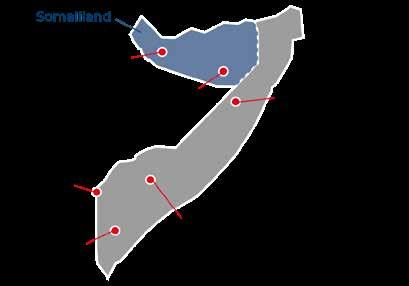
86,200 malaria cases treated
5,190 births assisted 74 people started on treatment for TB
In Sierra Leone, Médecins Sans Frontières (MSF) made progress in treating drug-resistant tuberculosis (DR-TB) in 2022, while continuing to run longstanding projects aimed at improving maternal and child healthcare.
We run projects in three districts, mainly focused on children under five, pregnant and lactating mothers, tuberculosis (TB) patients, and victims of sexual and gender-based violence.
In Kenema, a district with high rates of sickness and death among mothers and children, MSF’s Hangha hospital provides emergency services to children under five, including inpatient therapeutic feeding and intensive care. We also provide healthcare to pregnant women, managing complications during pregnancy and delivery, as well as offering newborn care. In 2022, we also opened a comprehensive emergency obstetric and neonatal care centre in the hospital. The facility has a solar power plant, which means that it runs on 100 per cent renewable energy during the day, while using diesel generators at night.
In Tonkolili district’s Mile 91, we support general healthcare centres, with the aim of reducing sickness

and death from preventable causes among mothers and children. Patients requiring specialist care are referred to Magburaka district hospital, where we assist with maternal, neonatal, paediatric and comprehensive sexual and reproductive care. Services include prevention of mother-to-child transmission of HIV, family planning, and medical and psychosocial support for victims of sexual and gender-based violence.
In 2022, the MSF Academy for Healthcare continued to run skills development programmes for nurses, midwives and other healthcare workers, providing training to improve performance and deliver effective responses during emergencies.
In Bombali district, our teams work in collaboration with the National Leprosy and Tuberculosis Control Programme to support diagnosis and management of TB. In 2022, we treated DR-TB patients with a new regimen that is much shorter, has fewer side-effects and requires fewer pills, making it easier for them to tolerate and complete treatment. Sierra Leone is the first country in the world to make this regimen available as a first choice for patients with DR-TB.
No. staff in 2022: 139 (FTE) » Expenditure in 2022: d25.6 million MSF first worked in the country: 1979 » msf.org/somalia
KEY MEDICAL FIGURES
19,700 patients treated for cholera
14,300 patients treated for measles
9,870 births assisted
2,380 children admitted to inpatient feeding programmes
Médecins Sans Frontières (MSF) responded to the severe malnutrition crisis in Somalia in 2022, while also tackling deadly outbreaks of measles and cholera.
In 2022, Somali communities in the Horn of Africa experienced an unrelenting drought, the worst in 40 years, with more than 1.3 million people displaced by the end of the year, amid a conflict that has been going on for decades and recurrent disease outbreaks.
In Baidoa city in Southwest state, we ran 20 mobile nutrition clinics and 32 nutrition monitoring sites, referring severely malnourished children to the inpatient therapeutic feeding centre in Bay regional hospital.
Malnutrition in children was exacerbated by measles. Measles rates increased dramatically in the overcrowded camps and informal settlements in towns and cities where people had fled from violence, or after they had run out of food and water in their villages. We treated children with measles in MSF-supported health facilities in Baidoa, Jubaland, Hargeisa and Las Anod.
In July, we partnered with Somaliland’s Ministry of Health Development to conduct a mass measles
vaccination campaign, including for people in displacement camps and the surrounding communities.
In April, we responded to a cholera outbreak in Baidoa city, setting up 15 oral rehydration points and a cholera treatment centre. We improved access to clean water by trucking it in, drilling boreholes and installing chlorine dispensers.
Our teams worked in hospitals across Somalia, focusing on maternal, paediatric and emergency care, nutrition support, and the diagnosis and treatment of tuberculosis (TB) and multidrugresistant TB, as well as mental health care and health promotion. We also ran mobile clinics in remote areas, delivering care to people in displacement camps and the surrounding communities.
In partnership with a local medical organisation, we ran five ‘eye camps’ in several locations, conducting screening and surgical interventions for common eye conditions that cause blindness if left untreated, and distributing medical eye-glasses.
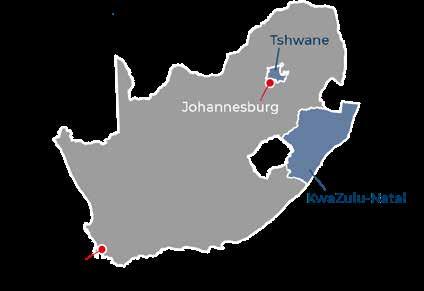
No. staff in 2022: 119 (FTE) » Expenditure in 2022: d7.4 million MSF first worked in the country: 1999 » msf.org/south-africa
68 mental health consultations provided in group sessions KEY MEDICAL FIGURES
440 individual mental health consultations
Médecins Sans Frontières (MSF) launched a major response when South Africa was hit by floods in 2022. We also maintained our HIV and tuberculosis (TB) programmes and migrant health project.
Flash flooding in parts of KwaZulu-Natal province in April caused hundreds of deaths, displaced over 40,000 people and severely damaged infrastructure, including water and sanitation services. MSF launched a substantial emergency response, comprising medical teams and water, sanitation and hygiene experts. We supported mobile clinics in affected communities with medical staff, and provided water storage and sanitation in shelters for displaced people. In addition, our geohydrologists implemented innovative techniques for improving water yield and quality from strategically drilled boreholes.
In the city of Tshwane, where we run a migrant health project, our teams supported outreach healthcare services for marginalised people, such as those without documentation and drug users, including referrals to health facilities.
In September 2022, after 22 years, our teams working on HIV/AIDS and drug-resistant TB (DR-TB) in Khayelitsha
No. staff in 2022: 1,104 (FTE) » Expenditure in 2022: d49.3 million MSF first worked in the country: 1979 » msf.org/sudan
KEY MEDICAL FIGURES
586,800 outpatient consultations
4,260 children admitted to inpatient feeding programmes
1,950 births assisted 230 newborns admitted to hospital
Médecins Sans Frontières (MSF) continued to respond to multiple health issues during a turbulent year in Sudan, where violence and extreme weather caused mass displacement.
In 2022, humanitarian needs were at their highest levels in a decade, amid conflict, erratic rainfall, flooding, food insecurity, funding cuts and an ongoing political and economic crisis.
There was a surge in fighting between fragmented armed groups in Darfur, Kordofan and Blue Nile states, causing further displacement. According to UN estimates, more than three million people were displaced across the country, about 2.5 million of them in Darfur.
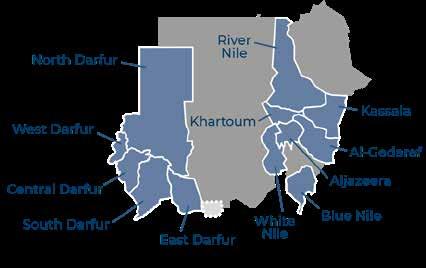
We worked in four states in Darfur, including in the Jebel Marra region, providing care through mobile and fixed clinics and hospitals. Services included general, specialist, emergency and reproductive healthcare, nutrition support for children, health promotion and vaccination campaigns.
In Blue Nile state, we ran a therapeutic feeding programme for malnourished children, and supported rural health clinics offering basic healthcare. We conducted mobile clinics and water and sanitation activities at sites where displaced families resided following three waves of violent clashes.
handed all remaining activities over to authorities. We launched the project in a context of HIV/AIDS denialism at the highest levels of government, starting by working to improve methods to prevent mother-to-child transmission, and were soon allowed to expand our involvement to HIV treatment for people of all ages, as well as operational research. One of the project’s standout achievements was the integration of HIV and TB services in clinics. It also contributed to the improvement of DR-TB treatment and care, by demonstrating that it is possible to substitute toxic injectable antibiotics with newer and more effective oral drugs.
Our project in Eshowe offered preventive treatment for TB – a medicine that reduces the risk that TB infection will progress to TB disease – through community health posts that were previously set up by MSF, adding to the existing TB, HIV and noncommunicable diseases services that are already available at these sites.
Regions
Our teams in Khartoum and Omdurman continued to provide general healthcare and emergency services for refugees, displaced people and host communities.
In early 2022, during protests, we supported seven Ministry of Health ambulances, donated supplies, and trained eight hospitals in mass casualty management. In January, nine MSF staff were detained briefly in Khartoum, and health facility raids were common. In December, we concluded our support to Mygoma orphanage in Khartoum and handed over to the Ministry of Social Development and the Ministry of Health.
In Al-Gedaref and Kassala states, we assisted Ethiopian refugees and local communities by offering basic health and reproductive care, nutrition support for children, and treatment for neglected tropical diseases.
From June to September, heavy rains caused widespread flooding. Partnering with local communities, MSF responded across four states, providing drinking water and essential items, along with sanitation and hygiene services.
No. staff in 2022: 3,460 (FTE) » Expenditure in 2022: d112.1 million MSF first worked in the country: 1983 » msf.org/south-sudan
891,000 outpatient consultations
309,900 malaria cases treated
125,000 vaccinations against measles in response to an outbreak
62,500 people admitted to hospital
12,600 births assisted
6,460 surgical interventions
4,610 people treated for intentional physical violence
3,810 children admitted to inpatient feeding programmes
2,540 people treated for sexual violence
We run one of our largest assistance programmes worldwide in South Sudan, responding to the many health needs resulting from ongoing conflict, extreme weather events and disease outbreaks.
People in South Sudan continued to suffer the consequences of recurrent violence, poor access to healthcare, economic instability and a fourth consecutive year of disastrous flooding. More than two-thirds of the population remained in need of humanitarian assistance in 2022,1 and this figure is likely to increase, as substantial cuts were made to international aid during the year.
In 2022, Médecins Sans Frontières (MSF) provided a range of healthcare services, including basic and specialist care, and sent mobile teams to assist displaced people and remote communities in two administrative areas and eight of the country’s 10 states. As well as responding to emergencies and disease outbreaks, we carried out preventive activities, such as vaccination campaigns and seasonal malaria chemoprevention. We also opened an inpatient department in a remote region of the Greater Pibor Administrative Area and started rehabilitating a hospital in Kajo Keji.
Around two-thirds of South Sudan was covered by floodwaters in 2022’s rainy season, affecting over a million people.2 For the past four years, the flooding has been unprecedented in its intensity, putting the country on the frontlines of the climate crisis. Tens of thousands of people live in displacement camps, where there is a lack of shelter, safe drinking water, healthcare and sanitation facilities.
With many communities marooned on ‘islands’, MSF ran mobile clinics to improve access to healthcare, and provided emergency referrals by boat. In some places, we also set up temporary structures to ensure continuity of care. In Bentiu, Unity state, we responded to an influx of patients with waterborne diseases by increasing our bed capacity from 135 to 175. In Maban, Upper Nile state, we distributed relief items, such as plastic sheeting, blankets, hygiene kits and cooking equipment, and installed water and sanitation facilities. At times, our teams had to travel on foot for several hours to deliver drugs to people displaced by flooding in Abyei Special Administrative Area.
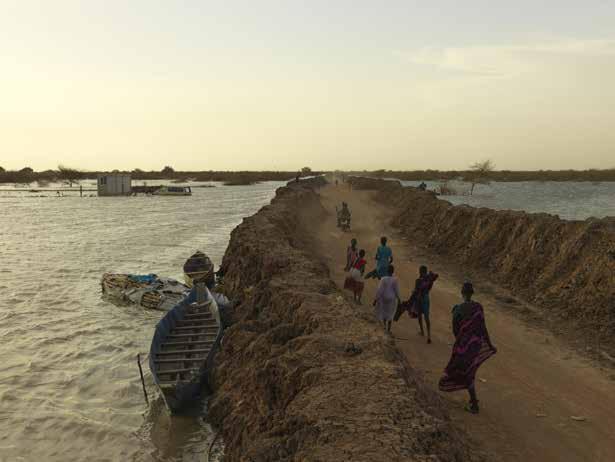
Violence escalated in many areas in 2022. Our teams responded to conflict-related emergencies in seven locations, distributing relief items and running mobile clinics in the affected communities.
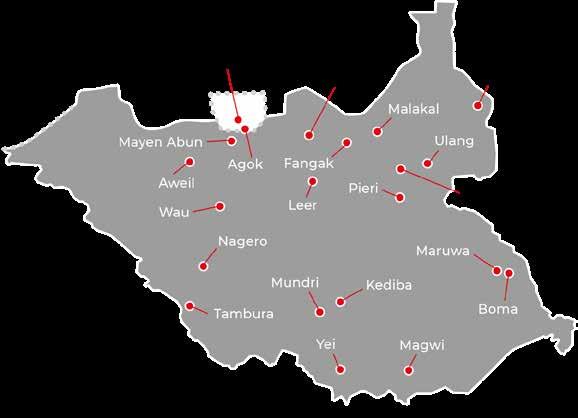
The conflict between armed groups in Upper Nile and Greater Fangak caused hundreds of casualties and displaced tens of thousands of people. Our hospitals in Old Fangak, Malakal town and the Malakal Protection of Civilians (POC) site – the last remaining POC in the country – received many wounded patients. Some arrived with serious infections, as it sometimes took them days to reach the hospital, due to insecurity and flooding.
In July, we launched a three-month emergency intervention and distributed relief items in Magwi county, Eastern Equatoria state, to assist communities with medical and water and sanitation needs, after conflict broke out in the region. We also started supporting medical services in five general healthcare facilities. In an emergency intervention in Tambura, Western Equatoria state, following the displacement of around 80,000 people due to violence, our teams provided general healthcare and vaccinations, along with maternal health and mental health support.
Our teams were not immune to the violence. A South Sudanese nurse from our Agok hospital was killed inside his home in February when intercommunal fighting broke out. Another MSF staff member was shot dead in Leer county. In Yei, an armed group robbed an MSF team on the road and set two of our vehicles on fire.
When violent clashes broke out in Agok in February and March, most residents fled to Abyei town or Twic county. We moved with them, to continue responding to their needs, supporting services in Ameth-Bek hospital in Abyei and providing medical assistance to displaced people in Twic county. In addition, we offered general healthcare, including mental health support, in Tambura county, Western Equatoria state, and supported five general health facilities in Leer county, Unity state, where we also distributed relief items to people affected by the violence.
In a world first, our teams carried out a mass vaccination campaign in the largest displacement camp in South Sudan in response to an active outbreak of hepatitis E; it is a virus that is particularly deadly among pregnant women, killing up to 25 per cent of infected pregnant women. In March, April and October, MSF and the Ministry of Health jointly carried out three rounds of vaccinations in the camp in Bentiu county. MSF hopes that this precedent will encourage uptake of the vaccine in other countries experiencing similar outbreaks.
Our teams also ran vaccination campaigns to respond to measles outbreaks in five states and Greater Pibor Administrative Area. In Maban, we distributed mosquito nets to households to protect them from malaria, after other organisations ceased malaria activities due to funding cuts.

Handovers in Mundri and Yei
I n May, after more than five years of delivering lifesaving care to the people of Greater Mundri, Western Equatoria state, we handed over our activities to the Ministry of Health. We launched an emergency intervention in Mundri in 2016, in response to critical humanitarian and medical needs; however, as the project attained stability, we decided to focus on assisting communities in more neglected areas. Throughout the five years, we treated hundreds of thousands of patients, responded to local emergencies and trained medical staff – many of whom are now qualified healthcare workers.
We also handed over the inpatient department in Yei hospital to the Ministry of Health in 2022. We began supporting the department in September 2018, by donating drugs and equipment, training staff and assisting with maintenance of the facility. We have now expanded our outreach activities in Yei county, providing healthcare through three Ministry of Health facilities, and running mobile clinics and community-based health services.
After decades of conflict, severe shortages of health infrastructure and qualified medical professionals continue to pose major challenges to the development of a good healthcare system in this, the world’s youngest nation. MSF Academy for Healthcare aims to strengthen competencies of healthcare workers and improve the quality of care. In June, the first group of 35 nursing students in Old Fangak, Jonglei state, graduated after completing 18 months of nursing care training.
No. staff in 2022: 765 (FTE) » Expenditure in 2022: d36.6 million MSF first worked in the country: 2009 » msf.org/syria
185,310,000 litres of clean water distributed
1,017,900 outpatient consultations
102,900 routine vaccinations
33,500 families received relief items
29,400 people admitted to hospital
13,900 births assisted, including 3,230 caesarean sections
10,700 individual mental health consultations
7,700 surgical interventions
Médecins Sans Frontières (MSF) continues to respond to multiple health needs in northern Syria, where 12 years of war and a deepening economic crisis have inflicted immense suffering on the people.
In 2022, we ran programmes in northwest and northeast Syria, where access and the security situation permitted. Our teams provided a wide range of medical services, including trauma and wound care, maternal and child health, treatment for chronic diseases and sexual violence, mental health support and protection-related activities, through both fixed and mobile facilities.
In July, the last remaining humanitarian border crossing point into Syria, Bab Al-Hawa, came under threat of closure after the renewal of its continuing operation was vetoed at the UN Security Council. Authorisation was eventually renewed for six months only, demonstrating the fragility of humanitarian access into Syria, which is still dependent on political decisions, and not solely on the humanitarian needs of the millions of people displaced in the region.
In September, sewage contamination in the Euphrates River and a severe water shortage were contributing factors to the first cholera outbreak in the country in 15 years, which was declared in Aleppo governorate and rapidly spread to other parts of northern Syria.
Northwest Syria
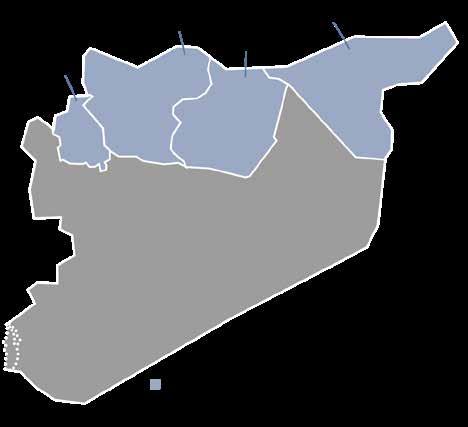
A t the end of 2022, there were around 4.4 million people residing in northwest Syria, with roughly 2.8 million being internally displaced. Their already precarious living conditions continue to deteriorate
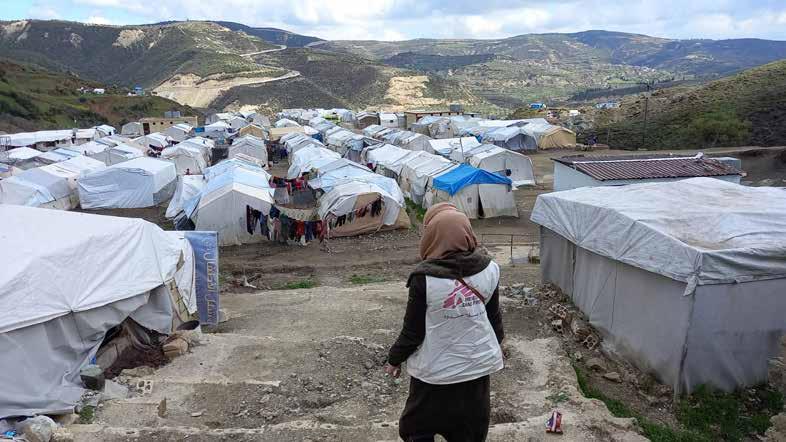
due to the ongoing conflict, the worsening economic situation and rising prices. As a result, they are losing hope for the future, which is in turn taking a toll on their mental health. Humanitarian needs therefore remain extremely high, especially regarding medical care, water and sanitation, food and shelter, yet aid to the area has decreased.
This situation has been compounded by the additional barriers of active frontlines, restrictions on access and supply flow issues, which affect MSF’s ability to respond. For this reason, we have developed a network of partners with whom we work to deliver care where it is most needed.
To address the medical needs in Idlib and Aleppo governorates, where the healthcare system remains fragile, MSF co-manages and offers technical support to seven hospitals. In addition, we run the only specialised burns facility in the area. We also operate mobile clinics and support general healthcare centres to provide care to people living in camps.
Our services include surgery, wound care and treatment for burns, obstetric and paediatric healthcare, treatment for infections and chronic diseases, as well as skin conditions related to poor
living conditions, such as scabies and leishmaniasis, mental health support, health promotion and routine vaccinations.
In displacement camps, our teams worked to improve water supply and sanitation facilities by building latrine blocks and distributing commodes for people with disabilities. We also provided hygiene kits and relief items, such as blankets and heating materials, to help residents cope with the cold winter weather. We additionally run community-based surveillance in the camps, to facilitate early detection of medical and humanitarian needs.
Following the declaration of the cholera outbreak in September, our teams set up and managed cholera treatment centres and rehydration points, and organised patient referrals. We also improved water and sanitation facilities, mainly in displacement camps, and conducted individual and group health promotion sessions.
Likewise in the northeast of the country, MSF is responding to the immense humanitarian needs caused by conflict and the economic crisis, assisting both displaced people and host communities who have very limited access to basic services.
Throughout the year, we supported a large basic healthcare centre in Raqqa governorate, offering emergency care, outpatient consultations, and treatment for non-communicable diseases (NCDs). We responded to a rise in the number of malnourished children by setting up an inpatient therapeutic feeding centre in Raqqa, alongside our outpatient centre. We also supported the local health authorities to administer routine vaccinations to women and children in 12 locations in Kobanê/Ain Al-Arab. In 2022, we handed over the vaccination programme to the local authorities, but we continued our donations during the year.
In Tal Abyad and Ras Al-Ain, we collaborated with local organisations to re-establish routine
immunisation services and conducted a measles, polio and pentavalent vaccination campaign. In addition, we provided treatment for leishmaniasis, technical training, and donations of medical supplies to health facilities.
In the southern and northern neighbourhoods of Hassakeh city, we supported two clinics with treatment for NCDs. In Al-Hol camp, in Hassakeh, over 53,000 detained people – the majority of them children – continue to languish in unsafe and unsanitary conditions. There were numerous violent incidents in the camp in 2022, resulting in the deaths of several residents, as well as repeated interruptions to the provision of humanitarian assistance.
In Al-Hol, MSF offers basic healthcare, treatment for NCDs, and mental health support. Despite our efforts to improve water and sanitation services in the camp, there is still a lack of adequate facilities. Water quality and supply remain an issue in northeast Syria. Since the summer, in mid-2022, there have been prolonged disruptions at Alouk water station, leaving it essentially non-operational for up to a million people in Hassakeh governorate. Our teams are monitoring the situation and will intervene where possible.
During the year, we responded to several outbreaks of diseases, including COVID-19, meningitis and severe acute respiratory infections. When a cholera outbreak was declared in Raqqa and Deir ez-Zor governorates, we launched a response in partnership with the local health authorities, opening a treatment centre in Raqqa and oral rehydration points in Hassakeh, providing treatment for patients with suspected cholera and dehydration, and referring patients with severe dehydration to other facilities. In addition, we sent extra staff to the area, including community health workers, and worked with other local organisations to improve water and sanitation, by chlorinating water trucks, ensuring the quality of water supply, and supporting water treatment stations with chlorination processes.

No. staff in 2022: 166 (FTE) » Expenditure in 2022: d3.6 million MSF first worked in the country: 1997 » msf.org/tajikistan
MEDICAL FIGURE
75 people started on treatment for MDR-TB
focus
Médecins Sans Frontières (MSF) activities in Tajikistan. We provide comprehensive care for both children and adults, with the aim of reducing TB incidence and death rates.
As well as diagnosis and treatment, we offer patients adherence counselling and health education, and call for greater access to care across the country.
Our teams continue to implement the innovative F-DOT (family directly observed therapy) approach, which allows patients to take their medication at home under the supervision of a family member. We also conduct contact tracing to ensure early TB detection and treatment for relatives of TB patients, and for people in the Tajik penitentiary system.
In 2022, MSF began TB screening and diagnosis in several prison colonies and one pre-trial detention centre. This service is available for all people
Regions where MSF had projects in 2022 Cities, towns or villages where MSF worked in 2022
entering and leaving these institutions, including detainees and penitentiary system workers.
In the ‘Zero TB’ project in Kulob district, which aims to demonstrate the feasibility of eliminating TB, we launched the SMARRTT (six-month all-oral regimens for rifampicin-resistant TB treatment) operational study. This followed the successful conclusion of the TB-PRACTECAL clinical trial, and the most recent recommendations from the World Health Organization on all-oral, shorter regimens for people with drug-resistant TB.
In September, following violent clashes at the border between Kyrgyzstan and Tajikistan, we sent a team to Isfara district to support the local hospitals with donations of medical supplies and distribute food and hygiene kits to displaced people.
No. staff in 2022: 184 (FTE) » Expenditure in 2022: d5.6 million MSF first worked in the country: 1993 » msf.org/tanzania
KEY MEDICAL FIGURES
18,700 outpatient consultations
4,300 births assisted, including 46 caesarean sections
7,790 malaria cases treated
5,810 individual mental health consultations
In 2022, Médecins Sans Frontières (MSF) continued to provide healthcare for Burundian refugees in Kigoma region, as well as responding to cholera and COVID-19 outbreaks in the country.
Our teams provided specialist healthcare to Burundian refugees in Nduta camp and people living in the surrounding villages. We continued to offer health services for women and children, including care and counselling for victims of sexual and gender-based violence. We also provided emergency mental health consultations and diagnosis for tuberculosis and HIV, as well as for a range of non-communicable diseases. In August we handed over our non-communicable diseases clinic in Nduta hospital to Medical Teams International.
Regions where MSF had projects in 2022 Cities, towns or villages where MSF worked in 2022
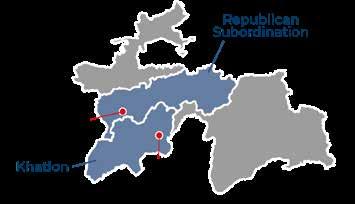
Our teams also responded to other emergencies, such as the cholera outbreak during April in Kigoma Uvinza, and COVID-19 in Ukerewe district, in Mwanza region, from January to April.
In collaboration with the Ministry of Health, we started a new project in Liwale Lindi, southern Tanzania, supporting seven government health facilities by providing access to general and specialist healthcare to pregnant women and children under five years old.
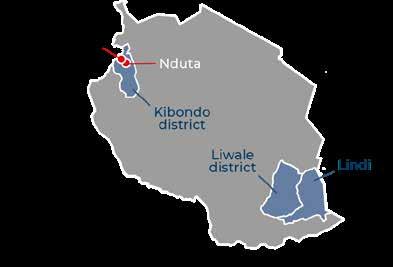
No. staff in 2022: 49 (FTE) » Expenditure in 2022: d2.8 million MSF first worked in the country: 1976 » msf.org/thailand
1,240 individual mental health consultations
53 mental health consultations provided in group sessions
In 2022, Médecins Sans Frontières (MSF) scaled up health promotion and mental health activities for people caught up in unrest and violence in Thailand’s Deep South region.
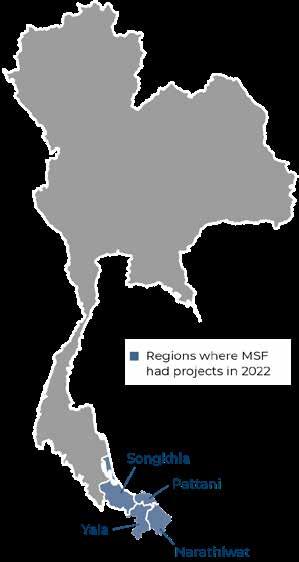
Sporadic fighting across the southern provinces of Pattani, Yala and Narathiwat over the past 15 years has taken its toll on the physical and psychological health of people living there, many of whom are hesitant to seek care. The conflict, which resurged during 2022 despite peace talks, has affected adults and children alike.
Our teams work with local organisations to improve healthcare in the region, especially for survivors of ill treatment who are excluded from existing services. We run a holistic programme, with a particular focus on mental health support, which includes individual and group therapy, psychosocial education and stress management.
In addition to basic healthcare, we offer physiotherapy and pain management, as well as social support. The project is the only one in the area providing such services to survivors of ill treatment and their families.
In 2022, we extended our outreach programme, sending dedicated staff to provide health promotion in a wider geographical area.
Raising awareness of mental health issues remains one of our priorities. We work with communities to prevent violent incidents and build mechanisms to cope with them, should they occur. Our teams run psychoeducation sessions and psychological first-aid training in counselling centres, mosques, schools and other venues in areas that have experienced numerous violent events. We also share information and expertise on various aspects of mental health with local networks and groups to strengthen their capacity and improve referral pathways to our facilities.
No. staff in 2022: 30 (FTE) » Expenditure in 2022: d1 million MSF first worked in the country: 1999 » msf.org/turkiye
Türkiye (Turkey) hosts the largest refugee population in the world –over four million – including more than 3.7 million Syrian nationals.1
In the first half of 2022, Médecins Sans Frontières continued to provide technical and financial support to a local organisation with a focus on offering services to migrants and refugees in Istanbul. Due to administrative challenges
and limited clarity regarding the framework for NGOs proposed by the government of Türkiye, we suspended our activities between June and September. This subsequently led to the conclusion of our activities in Istanbul by December.
1 United Nations refugee agency, UNHCR, 2022
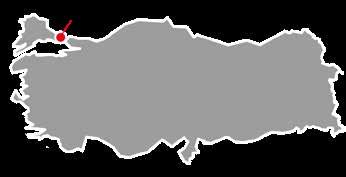
No. staff in 2022: 448 (FTE) » Expenditure in 2022: d48.1 million MSF first worked in the country: 1999 » msf.org/ukraine
90,800 outpatient consultations
2,560 patients evacuated by medical train KEY MEDICAL FIGURES
13,600 individual mental health consultations
As full-scale war erupted in Ukraine, Médecins Sans Frontières (MSF) scaled up activities to meet the many health needs, supporting health facilities, running mobile clinics and operating a specially designed medical train.
After eight years of low-intensity conflict in eastern Ukraine, Russian forces launched an all-out military assault on 24 February 2022, causing thousands of civilian casualties and extensive damage to energy and other key infrastructure, particularly in the country’s east, southeast and northeast. Many homes were destroyed, and public services, including healthcare, water and power supplies, were severely disrupted.
By the end of 2022, 6.5 million people were internally displaced within Ukraine, and about eight million had fled abroad.1
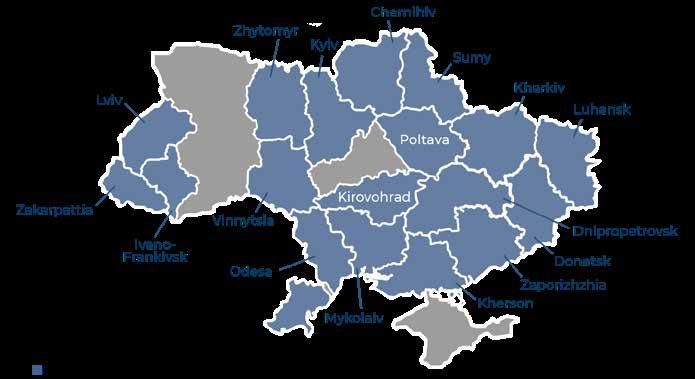
Since 2014, MSF had been providing healthcare, including mental health services, to people affected by the hostilities in Donetsk and Luhansk regions. Based in Bakhmut and Mariupol, our teams ran mobile clinics and supplied facilities with drugs and equipment. We also offered lifesaving care for tuberculosis (TB) patients and supported the implementation of an innovative TB treatment regimen in Zhytomyr. On 24 February, these regular programmes were suspended and/or reoriented to meet emerging needs in Ukraine and nearby countries.
In the early days following the escalation of the war, hospitals were in crucial need of medical
supplies. We established supply lines to health facilities and displaced people in Severodonetsk, Luhansk region, Mariupol, Donetsk region, the capital, Kyiv, and Dnipro, for the delivery of drugs, medical materials and other essential items.
Our teams offered emergency and surgical care for patients during mass casualty and trauma events, particularly in Apostolove and Konstiantynivka. We also supported hospitals across the country with donations and training on mass casualty management, decontamination response in case of chemical or biological attack, mental health care, and treatment for sexual and gender-based violence. In addition, we launched mobile clinics to respond to the needs of displaced people in Ukraine and in neighbouring countries such as Poland, Moldova, Hungary, Romania, Russia and Belarus, providing medical and mental health care at border crossings. While activities in other countries were eventually closed, those in Russia and Belarus continued throughout the year.
In March, Mariupol was besieged and thousands of people, including MSF staff, were cut off from the world, with no access to water or food. We called for the safe passage of civilians and donated some of our remaining medical supplies to an emergency room in the first few days. As the electricity and phone networks ceased to function, we were unable to maintain our activities.
In April, we started running a specially designed medical train to evacuate patients from areas near the eastern frontlines to the west of the country. The first medical train referral transported nine patients, injured in or near Mariupol, from hospitals in Zaporizhzhia to Lviv. Over 80 referrals were conducted, including the evacuation of nearly 80 children from an orphanage in Zaporizhzhia and
An MSF doctor assists an elderly patient whose diabetes has caused her mobility limitation. Kharkiv, Ukraine, October 2022.
© Linda Nyholm/MSF
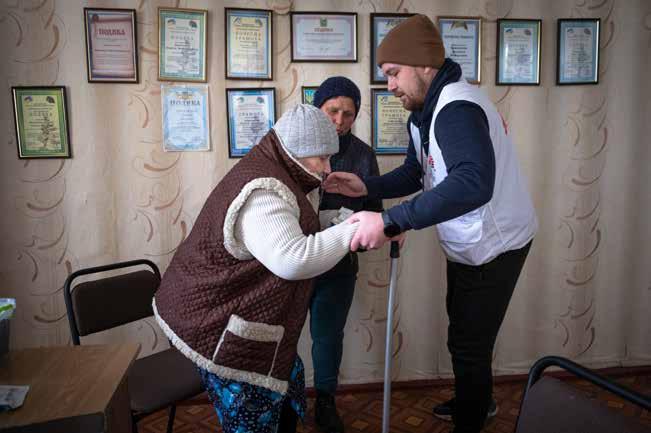
over 200 neurological and psychiatric patients from Kharkiv. We also operated an ambulance referral system in the east and south of the country.
When Ukraine retook rural Kharkiv in September, and Kherson in November, MSF was the first international medical organisation to reach these areas. Near the frontlines and retaken areas, our mobile clinics ensured continuity of care, particularly for elderly people and people with disabilities who had been deprived of healthcare for months. Our teams worked with local volunteers to re-establish access to basic healthcare and psychological counselling, and helped rehabilitate health facilities, repairing damage and reconnecting them to water and electricity.
Throughout the year, we worked to ensure continuity of care for displaced people through mobile clinics in Dnipro, Zaporizhzhia and Vinnytsia, with a particular focus on mental health support and treatment for chronic diseases. In more stable areas, such as the western regions of Ivano-Frankivsk and Zakarpattia, and in the central region of Kirovohrad, in addition to running mobile clinics, our teams helped rehabilitate medical facilities and shelters, and restore their water and sanitation systems. They also organised the distribution of
firewood and other alternative means of energy for displaced people living in rural areas.
Mental health was a major concern, especially among vulnerable groups such as children and elderly people, as well as healthcare workers. We provided mental health care in shelters for displaced people and villages, and in the aftermath of the battle for Hostomel in April, conducted individual and group counselling sessions for people traumatised by the fighting. MSF also assisted people who had been victims of torture or sexual and gender-based violence.
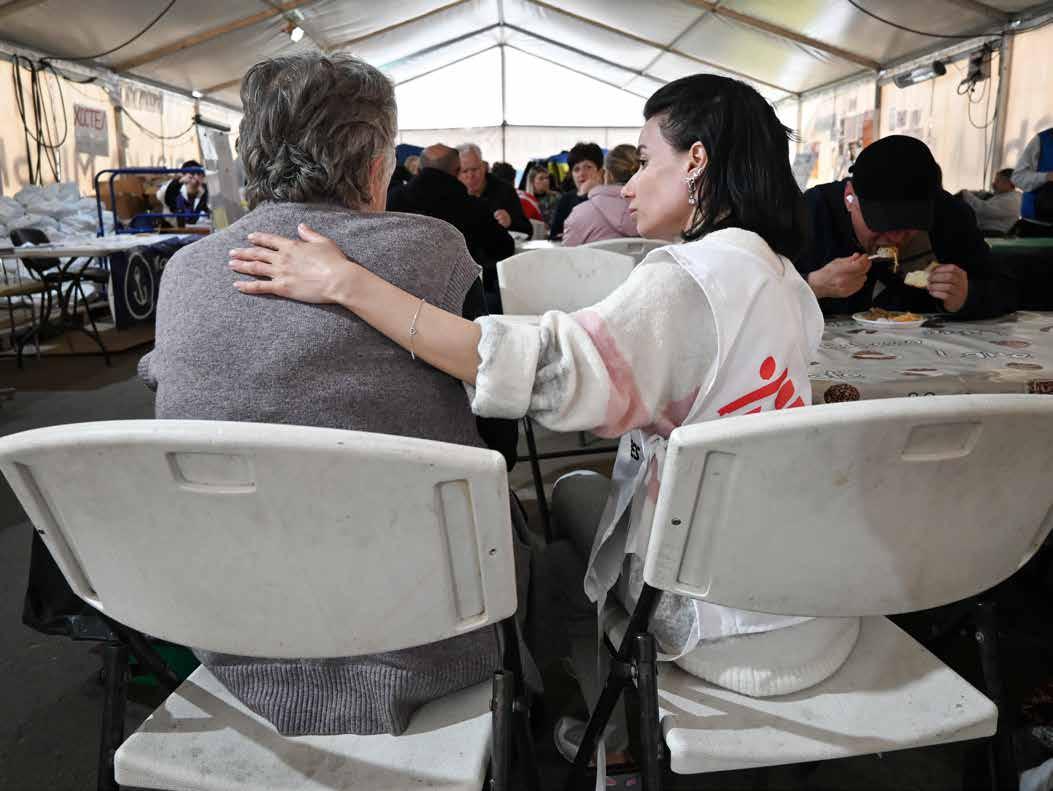
The war created an increased need for physiotherapy and rehabilitation for war-wounded people, many of whom have life-altering injuries. In coordination with the Ukrainian Interior Ministry and the Ministry of Health in Kyiv and Vinnytsia, MSF offered specialised physiotherapy, as well as psychological and psychiatric treatment, in two hospitals.
In 2022, Ukraine was an extremely dangerous place for civilians and healthcare workers. MSF staff witnessed directly the damage wreaked by bombs on the oncology hospital in Mykolaiv on 4 April, and the devastating consequences of attacks on multiple health facilities near the frontlines and retaken areas of Kherson, Kharkiv, Mykolaiv and Donetsk regions.
1 UNHCR: https://reporting.unhcr.org/operational/ operations/ukraine
No. staff in 2022: 468 (FTE) » Expenditure in 2022: d13.3 million MSF first worked in the country: 1986 » msf.org/uganda
KEY MEDICAL FIGURES
89,800 outpatient consultations
11,400 individual mental health consultations
1,760 people treated for sexual violence
1,590 people on first-line ARV treatment, and 1,020 on second-line ARV treatment under direct MSF care
In Uganda, Médecins Sans Frontières (MSF) addresses gaps in healthcare for adolescents and responds to the needs of refugees. In 2022, we also assisted with COVID-19 vaccinations and responded to an Ebola outbreak.
At the beginning of the year, our teams continued to support the COVID-19 vaccination campaign in Kasese district, reaching 270,000 adults. Our support included setting up vaccination centres, securing the supply of oxygen, and ensuring infection prevention and control.
Later in the year, we sent a team to Nyakabande camp to assist refugees from the conflict in North Kivu in neighbouring Democratic Republic of Congo. In addition to setting up a health centre, we constructed latrines and shelters, provided clean water, and distributed essential items such as hygiene and cooking kits.
When an Ebola outbreak was declared in September, our teams managed the construction and installation of six Ebola treatment centres. As well as managing and supporting treatment, we worked to prevent the spread of the outbreak by sending outreach teams to conduct health promotion, infection prevention
No. staff in 2022: 274 (FTE) » Expenditure in 2022: d7.8 million MSF first worked in the country: 1997 » msf.org/uzbekistan
KEY MEDICAL FIGURE
1,550 people started on treatment for TB
In Uzbekistan, Médecins Sans Frontières (MSF) supports the Ministry of Health to improve diagnosis and treatment for people with HIV and tuberculosis (TB).
In the capital, Tashkent, and the surrounding region, MSF runs a mobile laboratory in collaboration with the Republican AIDS Centre. Operating from a specially equipped bus, the team provides rapid testing for HIV, hepatitis C and syphilis, as well as information on treatment opportunities and specialist referrals for people who would otherwise have difficulty accessing diagnosis and care. In addition, we support diagnosis and treatment for people with HIV and co-infections living in vulnerable circumstances, in collaboration with Tashkent AIDS Centre.
In the Autonomous Republic of Karakalpakstan, we run a comprehensive care programme for patients with drug-resistant and drug-sensitive TB.
Regions where MSF had projects in 2022 Cities, towns or villages where MSF worked in 2022
control measures, and water, sanitation and hygiene activities, and provide epidemiological expertise, in five districts of the country: Mubende, Kassanda, Kampala, Masaka and Jinja.
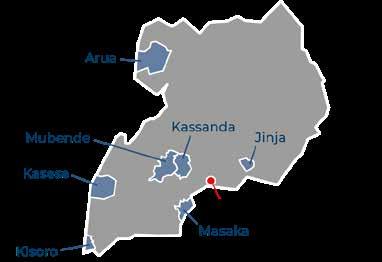
In Kasese district, we continued to run a dedicated clinic for adolescents aged 10-19 inside a Ministry of Health centre. The clinic offers a broad range of medical services tailored to adolescents’ needs, including sexual and reproductive healthcare, with a specific focus on pregnant teenagers, treatment for HIV and sickle cell disease, as well as social and mental health support. Our teams also provided sexual and reproductive healthcare and mental health support to the mainly South Sudanese refugees living in Omugo and Imvepi camps. In 2022, we handed over to the Ministry of Health the HIV project that we had been running for the fishing communities in Kasese since 2015. We also started the handover of our HIV and tuberculosis programme in Arua district, which we aim to complete in 2023.
Regions where MSF had projects in 2022 Cities, towns or villages where MSF worked in 2022
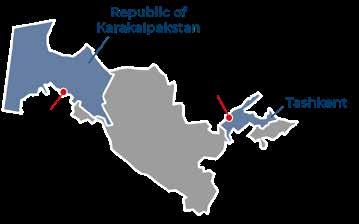
We continue to support the roll-out of treatment protocols reflecting global best practices, and promote shorter treatment regimens with the use of newer and repurposed TB drugs.
In Nukus, the capital of Karakalpakstan, and in Tashkent, we concluded our groundbreaking multi-country clinical trial, TB-PRACTECAL, which investigated the efficacy and safety of a new treatment regimen for drug-resistant TB. In December, based on the results of the trial, the World Health Organization recommended this regimen for patients with multidrug-resistant or rifampicin-resistant TB in its updated treatment guidelines. To ensure the scale-up of this treatment regimen, in October MSF launched the SMARRTT (six-month all-oral regimens for rifampicin-resistant TB treatment) operational study in Nukus.
No. staff in 2022: 509 (FTE) » Expenditure in 2022: d14.9 million MSF first worked in the country: 2015 » msf.org/venezuela
27,900 consultations for contraceptive services
1,580 malaria cases treated
1,500 individual mental health consultations
170 people treated for sexual violence
In Venezuela, many hospitals are struggling to function, with insufficient staff, drugs, supplies, medical equipment, and access to basic services such as water. In 2022, MSF teams supported the provision of care in 29 public health facilities in five states – Amazonas, Anzoátegui, Bolívar, Delta Amacuro and Táchira – and the capital, Caracas.
A large part of our work focused on strengthening hospital and health post infrastructure, specifically electricity supply, waste management, water and sanitation. In addition, we provided medicines and medical supplies, as well as training regarding their appropriate use.
Our principal objective was to improve general and specialist medical services in areas such as emergency care, COVID-19 triage, sexual and reproductive health, vaccinations, and treatment for victims of sexual violence. Health promotion
and mental health support were also important components of our projects.
In Anzoátegui and Bolívar states, we continued working to reduce the high incidence of malaria, focusing on early diagnosis and treatment, vector control and health promotion. These interventions led to a significant reduction in cases compared to previous years.
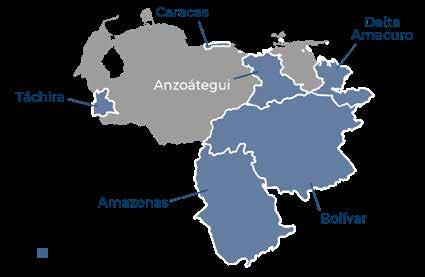
In July 2022, we opened a new project in Delta Amacuro, a difficult-to-access region crossed by many rivers and waterways, with the aim of bringing general healthcare to the remote, mainly indigenous, communities living there.
Meanwhile, we closed our projects in Caracas and Táchira, after achieving our objectives of designing and implementing triage systems for patients with COVID-19 in health facilities, increasing outpatient consultation capacity and integrating a mental health approach to medical consultations. In Táchira, we also ran community-based health education sessions and reinforced referral systems.
No. staff in 2022: 114 (FTE) » Expenditure in 2022: d4.9 million MSF first worked in the country: 2000 » msf.org/zimbabwe
14,300 consultations for contraceptive services
390 individual mental health consultations
120 women received safe abortion care
In the capital, Harare, we run a project providing comprehensive youth-friendly sexual and reproductive health (SRH) services, through our clinic in Mbare. Our team is also working to improve adolescent SRH in Epworth in a nonmedical setting, working with peer educators. Peer educators are adolescents who are trained to facilitate access to SRH services in communities by raising awareness on the services we offer.
When a measles outbreak hit the country in 2022, MSF supported the national response, targeting the most affected districts in Manicaland province. Our teams provided vaccinations, as well as care to patients, contact tracing and training. Through health promotion services, we increased community awareness and improved vaccine uptake.
In Beitbridge and Plumtree, we continue to offer medical assistance to vulnerable migrants, asylum seekers, deportees and local communities. In 2022, we constructed a wellness centre in Tongogara refugee camp, which the community has named Baobab House. The centre runs mental health services, including individual support, stress management sessions and recreational activities, to help people dealing with stress and trauma.
In December, we closed our environmental health project in Harare, which implemented activities to strengthen communities’ capacity to prevent and respond to disease outbreaks. These included drilling, rehabilitating and sealing boreholes to improve access to safe water, and setting up community-led solid waste, biowaste and wastewater recycling projects in the city, which also contribute to mitigating the effects of climate change.
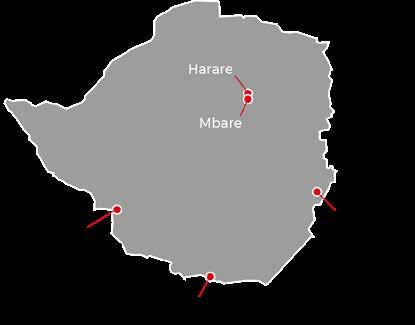
As the political and economic crisis continued to leave thousands of Venezuelans without access to medical care in 2022, Médecins Sans Frontières (MSF) scaled up support to medical facilities across the country.
In Zimbabwe, Médecins Sans Frontières (MSF) continues to address gaps in healthcare, focusing on adolescent sexual and reproductive health, support for migrants and deportees, and responding to disease outbreaks.
No. staff in 2022: 3,009 (FTE) » Expenditure in 2022: d115 million MSF first worked in the country: 1986 » msf.org/yemen
108,200 people admitted to hospital
71,200 outpatient consultations for children aged under 5
36,500 surgical interventions
35,500 births assisted, including 5,470 caesarean sections
6,450 children admitted to inpatient feeding programmes
In early 2022, in response to a dramatic escalation in fighting across several frontlines and a significant increase in airstrikes, our teams in Abs, Mocha and Sa’ada launched multiple mass-casualty interventions.
Although the conflict has reduced in intensity since the UN-brokered truce in April, sporadic clashes continue to break out on frontlines, often resulting in casualties among civilians caught in the crossfire or exposed to unexploded ordnance.
Yemen’s humanitarian crisis is driven by armed conflict, but the consequent deterioration of the economy has also had a direct impact on people’s living conditions, health and access to essential treatment. As food and fuel prices continue to rise, many families cannot afford to eat or travel to healthcare facilities.
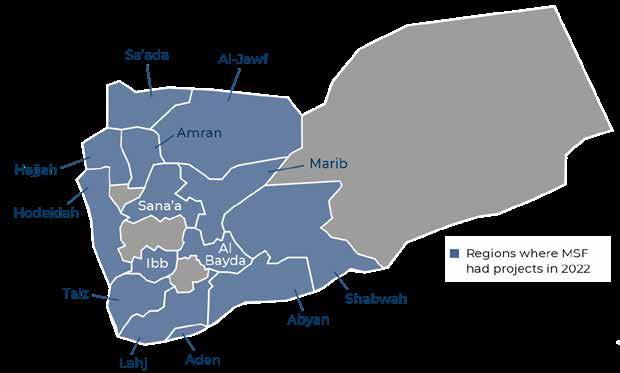
The availability of healthcare in Yemen, in particular high-quality, affordable basic medical services at community level, is diminishing, and in some cases is nonexistent. As we have seen in the health facilities we support, poor access to general medical care means that many people delay seeking
treatment or are forced to travel further afield, so that by the time they arrive, they are often in a worse condition and have developed complications.
A large number of people in Yemen remain in dire need of humanitarian assistance and support, amid a marked deterioration in services that leads to increasing gaps in healthcare. The situation has been compounded by asymmetric restrictions imposed by the Yemeni authorities on humanitarian staff and supplies, which have hampered the effective and timely delivery of essential aid. MSF continues to call for a greater, more efficient and more direct international response in Yemen, and calls for the facilitation of access to vulnerable people for MSF and other humanitarian organisations.
In 2022, our teams worked in 12 hospitals and supported 16 other health facilities across 13 governorates, with a focus on inpatient and emergency care. However, given the lack of basic healthcare in rural areas, the hospital wards MSF supports are often overwhelmed, as people tend to arrive with complications because they were unable to receive care when they needed it. As a result, the facilities we support often operate at well over 100 per cent capacity. We therefore provide assistance to basic healthcare centres in several locations across the country, including financial support for healthcare workers, training, donations of medications, and payment for referrals to facilities run or supported by MSF.
Aura Ramírez, MSF’s mental health activity manager, comforts a patient in Hajjah City. Yemen, September 2022. © Jinane Saad/MSF
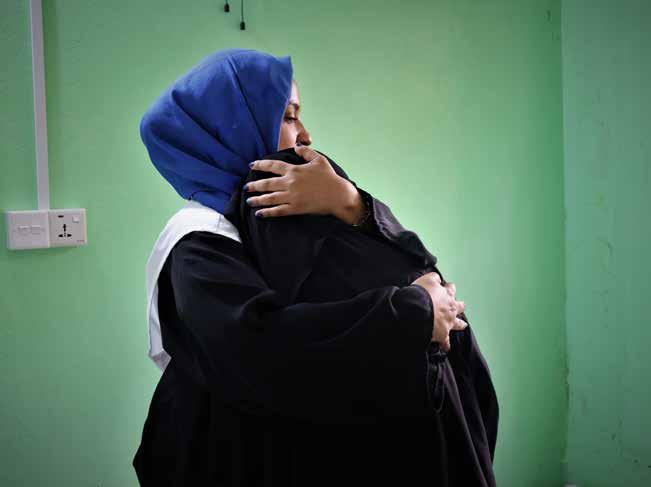
Médecins Sans Frontières (MSF) is working to address the humanitarian crisis unfolding in Yemen, providing lifesaving care to people injured in conflict, and responding to surging rates of malnutrition and preventable diseases.Regions where MSF had projects in 2022
In Yemen, malnutrition is a persistent risk to children, pregnant women, and people in a heightened state of vulnerability due to medical conditions, with seasonal and annual peaks linked to the lean season between harvests. This pattern was seen before the escalation of the war in late 2014, but it has worsened and become more widespread due to the ongoing conflict, which has exacerbated food insecurity for people living in vulnerable conditions.
In 2022, the malnutrition peak started earlier than other years and did not finish until November. MSF-supported facilities were overwhelmed by the high numbers of patients, with over 10,000 receiving treatment over the course of the year. Our teams launched emergency interventions to address the surge in acute malnutrition cases and compounding health complications, and are particularly concerned with associated waterborne diseases, which increase the fragility of under-fives, especially when already malnourished.
During the year, MSF-supported emergency rooms in Yemen treated hundreds of thousands of patients, many with violence-related injuries incurred during the conflict. Many other people ended up needing emergency care for conditions that had initially been less serious, but had worsened because the lack of affordable healthcare in their communities
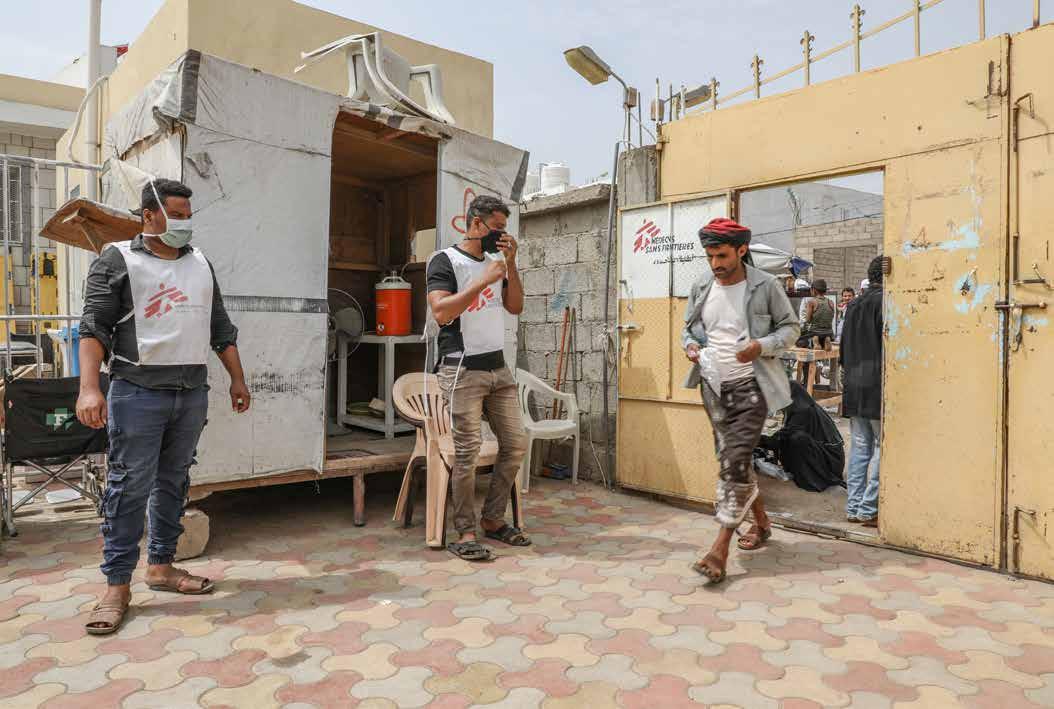
meant they delayed seeking treatment. Our teams performed thousands of surgical interventions in 2022, not only for violence-related injuries, but also for emergencies such as obstetric complications. They also treated a significant number of road traffic accidents in various locations in Yemen. Poor availability of maternal care resulted in high numbers of women facing complications in childbirth and increased risks to both mother and child; often this is because treatment is received too late.
MSF provides support for maternal and child healthcare in most governorates in Yemen, where there is an ever-increasing demand for such services. Our teams assisted with deliveries, including caesarean sections, and provided both antenatal and neonatal care. In an effort to reduce the high maternal and infant death rates, we worked with the Ministry of Health in Hodeidah, Hajjah, Ibb and Taiz governorates, to develop emergency referral pathways to accelerate access to care.
We have seen a resurgence of preventable diseases, such as cholera, diphtheria, measles and whooping cough, in Yemen due to low vaccination coverage, poor living conditions and the collapse of the healthcare system. In response, our teams provided vaccinations, carried out health promotion and education activities to encourage people to take vaccinations, and also managed isolation centres.
Médecins Sans Frontières (MSF) is an international, independent, private and non-profit organisation.
It comprises 24 main national offices in Australia, Austria, Belgium, Brazil, Canada, Denmark, Eastern Africa (Kenya), France, Germany, Greece, Hong Kong, Italy, Japan, Latin America (MSF LAT), Luxembourg, the Netherlands, Norway, South Africa, South Asia, Spain, Sweden, Switzerland, the United Kingdom and the United States. There are also branch offices* in Chile, China, Colombia, the Czech Republic, Finland, India, Ireland, Lebanon, Mexico, New Zealand, Poland, Portugal, Russia, Singapore, South Korea, Taiwan, the United Arab Emirates and Uruguay. MSF International is based in Geneva.
The search for efficiency has led MSF to create eight entities called ‘satellites’. These satellites provide specific activities to the benefit of the MSF movement and/or MSF entities, such as humanitarian relief supplies, epidemiological and medical research, IT services, fundraising, facility management and research on humanitarian
and social action. As these entities are controlled by MSF, they are included in the scope of the MSF International Financial Report and the figures presented here.
These figures describe MSF’s finances on a combined international level. The 2022 combined international figures have been prepared in accordance with Swiss GAAP FER/RPC. The figures have been audited by the accounting firm Ernst & Young.
The full 2022 International Financial Report can be found on www.msf.org. In addition, each national office publishes annual, audited Financial Statements according to its national accounting policies, legislation and auditing rules. Copies of these reports may be requested from the national offices.
The figures presented here are for the 2022 calendar year. All amounts are presented in millions of euros. Rounding may result in apparent inconsistencies in totals.
* Figures relating to all the branch offices are included in the International Financial Report, although some are not disclosed separately.
As part of MSF’s effort to guarantee its independence and strengthen the organisation’s link with society, we strive to maintain a high level of private income. In 2022, 97.3 per cent of MSF’s income came from private sources.
More than 7 million individual donors and private foundations worldwide made this possible. Public institutional agencies providing funding to MSF included, among others, the governments of Canada and Switzerland; the World Health Organization (WHO); the Global Fund to Fight AIDS, Turberculosis and Malaria; the International Drug Purchase Facility (UNITAID); and some regional councils and municipalities of France, Luxemburg and Switzerland.
Countries where MSF expenditure was more than € 25 million in 2022
* Other countries include the expenditure in countries where less than 1 million euros was spent.
**Transversal costs are those expenses which cannot be directly attributed to any mission, and are shared by two missions or more.
Expenses reached an all-time high in 2022, exceeding s 2 billion. This represents a 35% increase over the last five years. MSF’s priority is to maximise the funding that goes to programmes; the ratio of expenses going towards programmes has remained around 65%. The share of expenses directly related to MSF’s social mission also remained at 80%. Fundraising expenses ensure that MSF can continue receiving the vast majority of its funding from private, independent sources.
The largest category of expenses is dedicated to Personnel costs: 51% of expenditure comprises all costs related to locally hired and international staff (including plane tickets, insurance, accommodation, etc).
The Medical and nutrition category includes drugs and medical equipment, vaccines, hospitalisation fees and therapeutic food. The delivery of these supplies is included in the category of Travel and transportation.
Logistics and sanitation comprise building materials and equipment for health centres, water and sanitation, and logistical supplies.
Other expenses includes grants to external partners and taxes.
1 Programme expenses represent expenses incurred in the field or by headquarters on behalf of the field. All expenses are allocated in line with the main activities performed by MSF according to the full cost method. Therefore, all expense categories include salaries, medical costs, logistics and transport costs, and other direct costs.
The result for 2022, after adjusting for financial results, extraordinary results and exchange gains/losses, shows a surplus of€€67 million (surplus of €169 million for 2021). MSF’s funds have been built up over the years by surpluses of income over expenses. At the end of 2022, the remaining available reserves (excluding permanently restricted funds and capital for foundations) represented 7.9 months of activities at 2022 level.
The purpose of maintaining financial reserves is to meet the following needs:
a) Meet working capital needs over the course of the year, as fundraising traditionally has seasonal peaks while expenditure is relatively constant;
b) Provide a swift operational response to humanitarian needs that will be funded by forthcoming public fundraising campaigns and/or by public institutional funding;
c) Secure funds for future major humanitarian emergencies for which sufficient funding cannot be obtained;
d) Facilitate the sustainability of long-term programmes (e.g. antiretroviral treatment programmes); and
e) Protect activities when a sudden unplanned event takes place such as a sudden drop in private and/or public institutional funding that cannot be matched in the short term by a reduction in expenditure, or unforeseen changes in economic conditions, including foreign exchange variations.
2 Restricted funds may be permanently or temporarily restricted: permanently restricted funds include capital funds, where the assets are required by the donors to be invested or retained for long-term use, rather than expended in the short term, and minimum compulsory level of funds to be maintained in some countries; temporarily restricted funds are unspent donor funds designated to a specific purpose (e.g. a specific country or project), restricted in time, or required to be invested and retained rather than expended, without any contractual obligation to reimburse.
3 Unrestricted funds are unspent, non-designated donor funds expendable at the discretion of MSF’s trustees in furtherance of our social mission.
4 Other funds are foundations’ capital and translation adjustments arising from the translation of entities’ financial statements into euros.
5 Staff numbers represent the number of full-time equivalent positions averaged out across the year.
6 Positions in programmes include programme and programme support staff in the countries in which we work.
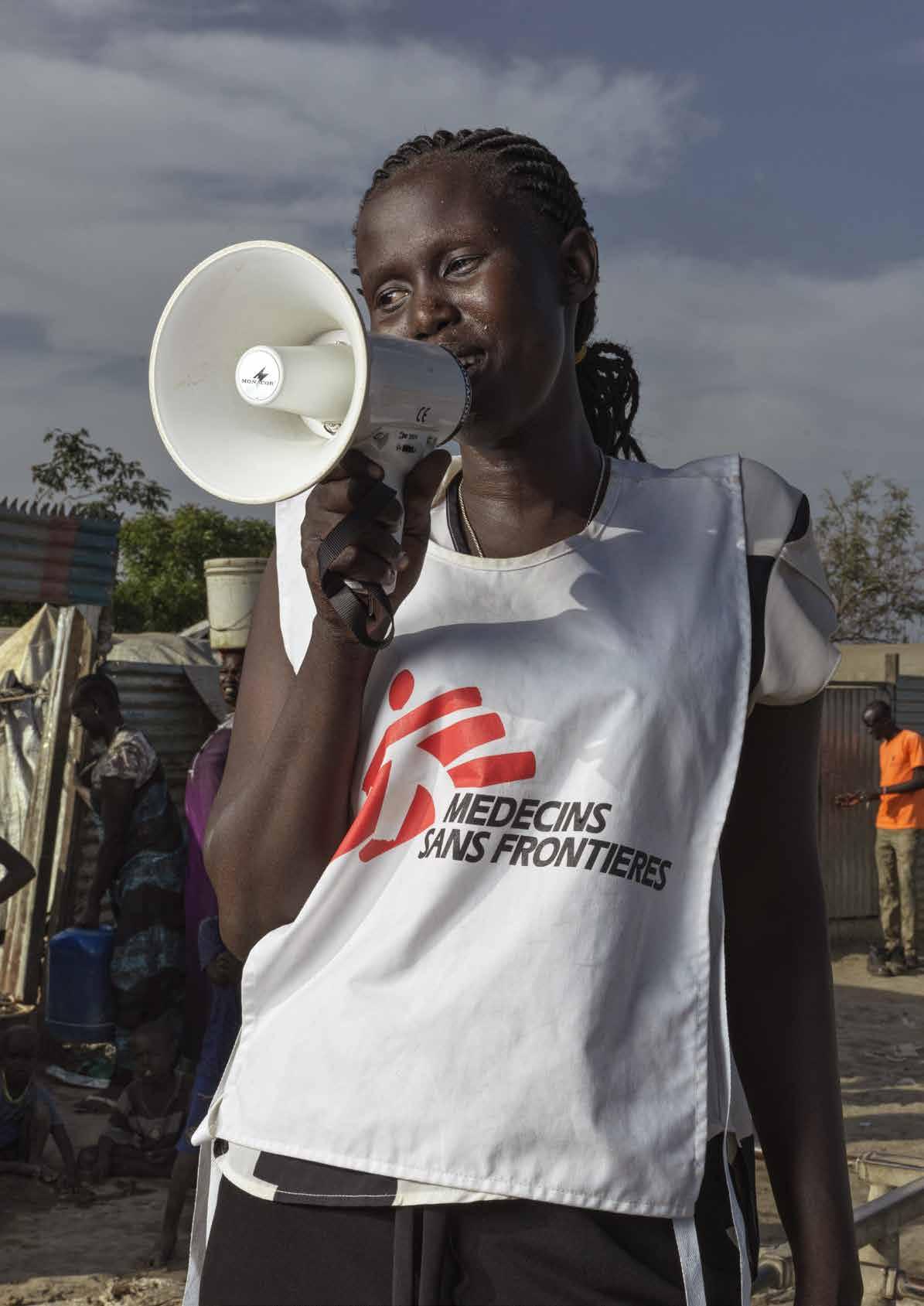 An MSF health promoter helps to mobilise community members in Bentiu camp for displaced people to get vaccinated against hepatitis E. South Sudan, April 2022. © Peter Caton
An MSF health promoter helps to mobilise community members in Bentiu camp for displaced people to get vaccinated against hepatitis E. South Sudan, April 2022. © Peter Caton
Contributors
Dr Ahmed Abd-elrahman, Rasha Ahmed, Igor Garcia Barbero, Quentin Barrea, Dr Marc Biot, Akke Boere, Laurie Bonnaud, Steven De Bondt, Masha Borshcheva, Paulo Braga, Lali Cambra, Kirsty Cameron, Tom Casey, Sara Chare, Marie-Laure Dagault, Anaïs Deprade, Susanne Doettling, Marion Dualé, Mario Fawaz, Laura Garel, Juliette Garms, Dr Daniela Garone, Gijs Van Gassen, Nathalie San Gil, Giorgia Girometti, Dr Maria Guevara, Scott Hamilton, Claire Hawkridge, Dr Sal Ha Issoufou, Jean-Marc Jacobs, Frederic Janssens, Saskia van der Kam, Hassan Kamal Al-Deen, Kenneth Lavelle, Angela Makamure, Alexandra Malm, Laura McAndrew, Sophie McNamara, Elise Mertens, Esteban Montaño, Isabelle Mouniaman, Awa Ngom, Christelle Ntsama, Flavia Pergola, Gianpiero Rastelli, Carmen Rosa, Victoria Russell, Jinane Saad, Tamara Saeb, Teresa Sancristoval, Francesco Segoni, Alessandro Siclari, Christopher Stokes.
Special thanks to Valentina Carnimeo, Jean-Marc Jacobs, Joanna Keenan, Chris Lockyear, Souhir Maalej.
We would also like to thank all the field, operations and communications staff who provided and reviewed material for this report.
Managing Editor Faris Al-Jawad
Photo Editor Bruno De Cock
Media Database Officer Frédéric Séguin
Copyeditor Kristina Blagojevitch
Proofreaders Tanya Cowan, Joanna Keenan Medical data collection MSF Operational Centres and Epicentre
French Edition
Translation Aliette Chaput
Editor/Proofreader Laure Bonnevie, Histoire de mots
Proofreader Lucie Fauteux
Arabic Edition Coordinator Souhir Maalej
Translator Simon Staifo
Editors/Proofreaders Souhir Maalej
Designed and produced by ACW, London, UK www.acw.uk.com
Médecins Sans Frontières (MSF) is an international, independent, medical humanitarian organisation that delivers emergency aid to people affected by armed conflict, epidemics, exclusion from healthcare, and natural disasters. MSF offers assistance to people based on need and irrespective of race, religion, gender or political affiliation.
MSF is a non-profit organisation. It was founded in Paris, France in 1971. Today, MSF is a worldwide movement of 25 associations. Thousands of health professionals, logistical and administrative staff manage projects in more than 70 countries worldwide. MSF International is based in Geneva, Switzerland.

Route de Ferney 140, Case Postale 1016, 1211 Geneva 21, Switzerland
Tel: +41 (0)22 849 84 84 Fax: +41 (0)22 849 84 04 @MSF fb.com/msfinternational
Cover photo » MSF nurse Anastasia Prudnikova monitors a war-wounded patient on board the medical train during a journey from Pokrovsk, in eastern Ukraine, to Lviv. Ukraine, May 2022. © Andrii Ovod